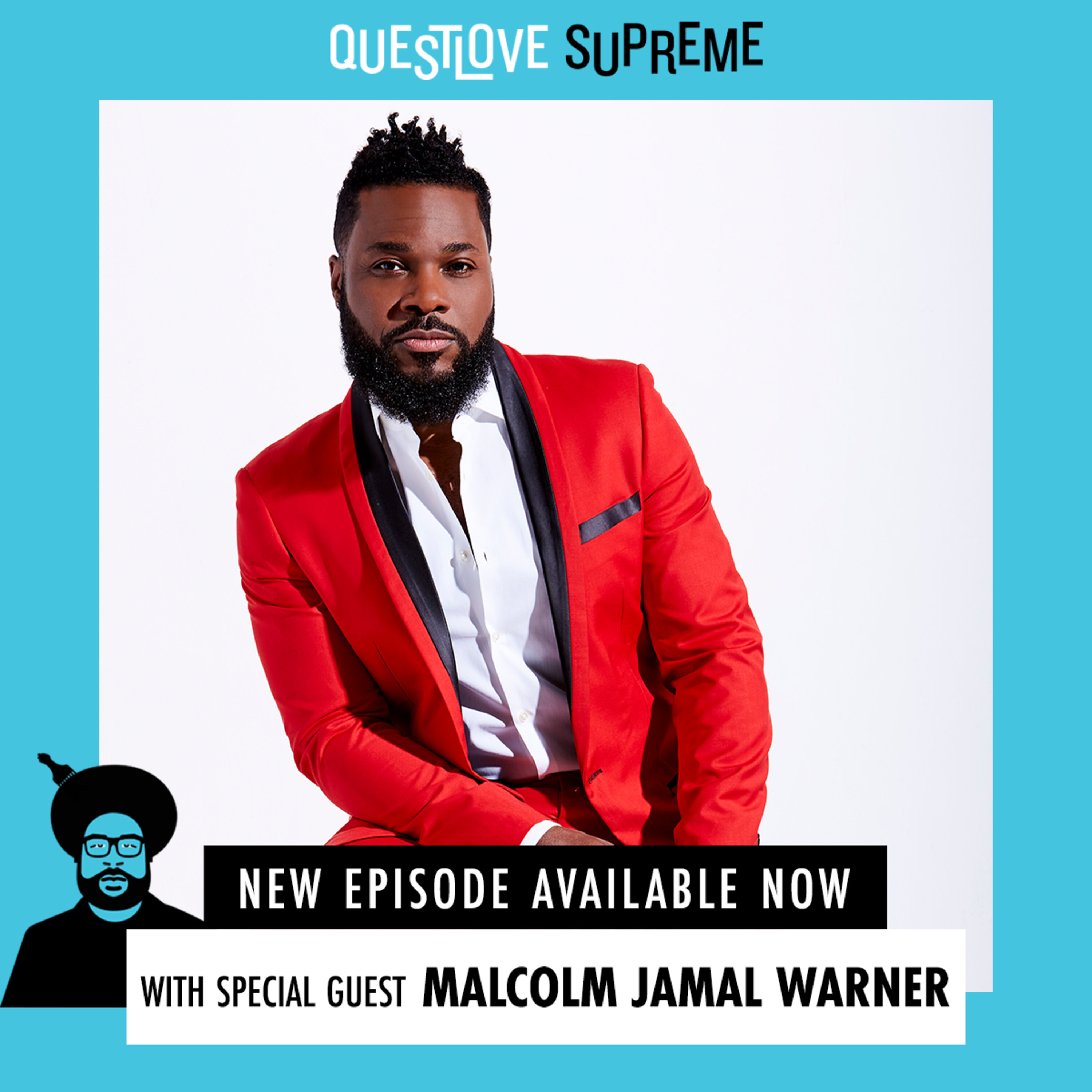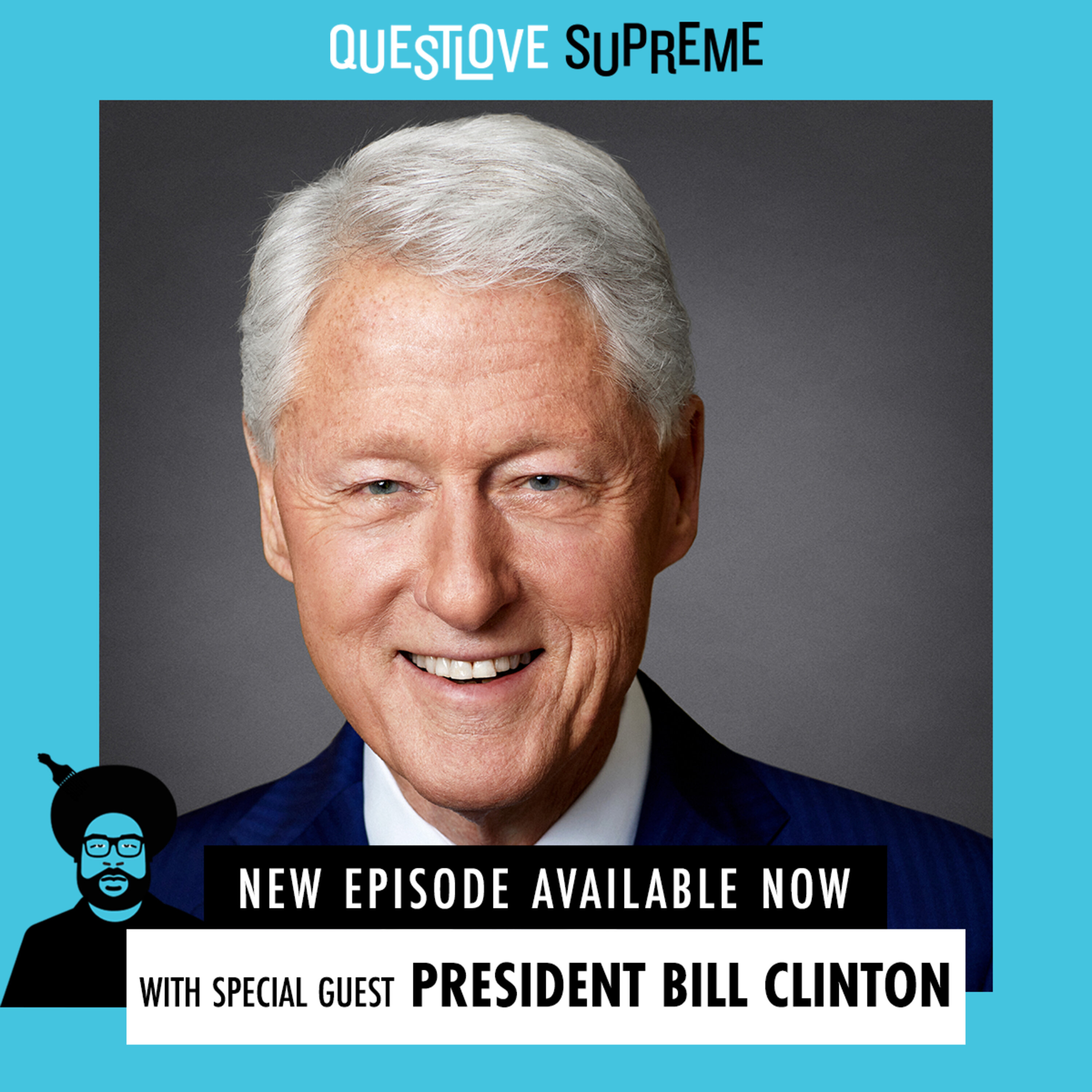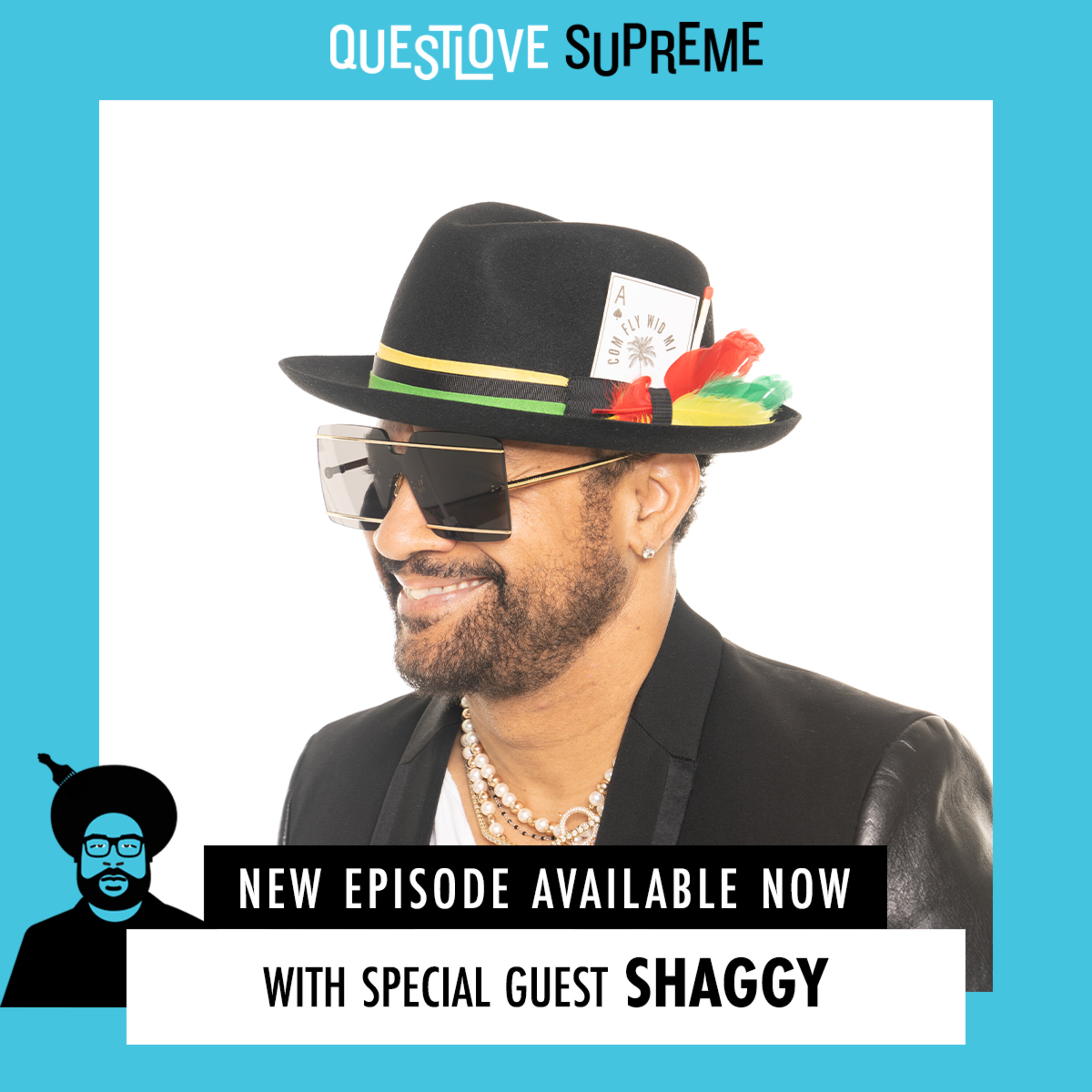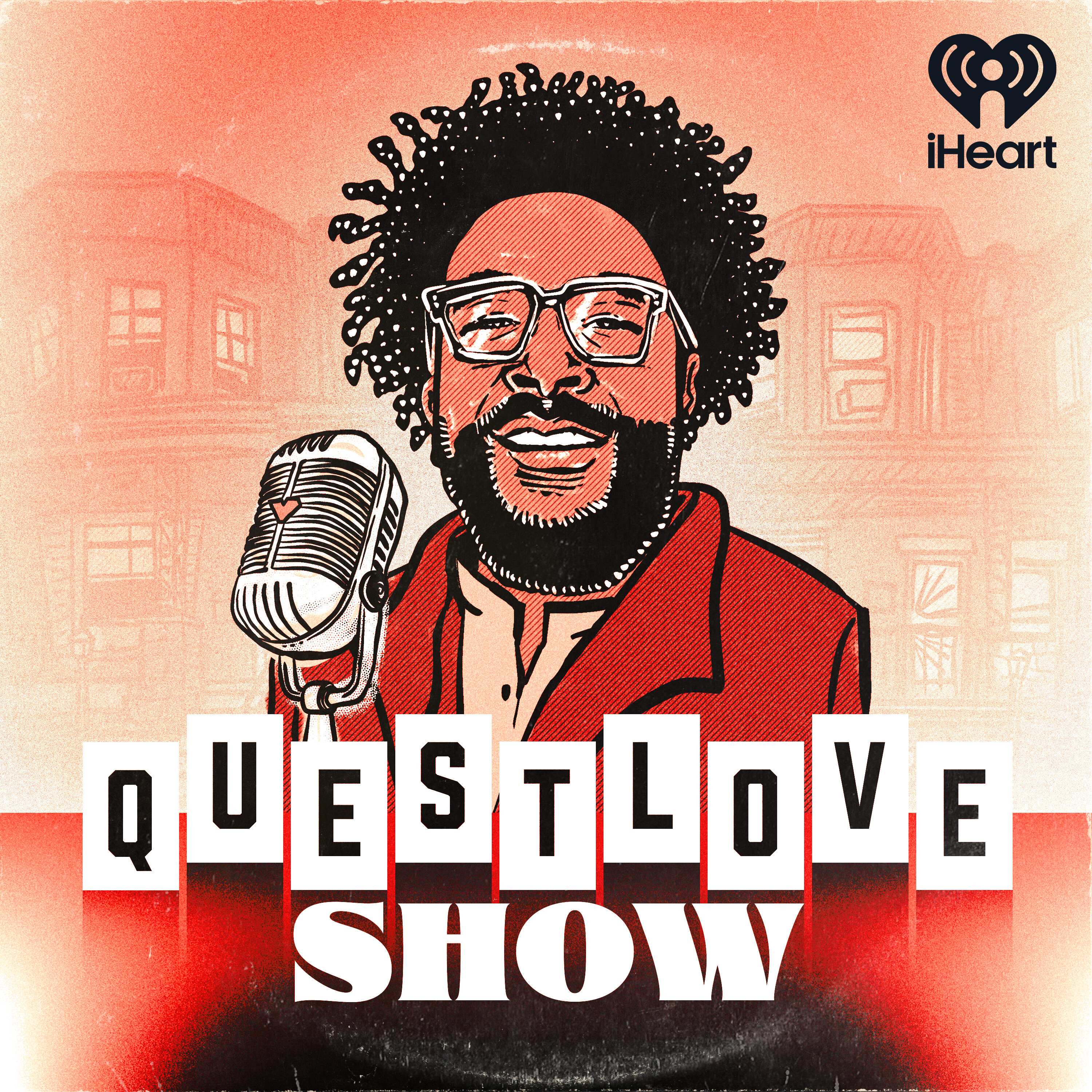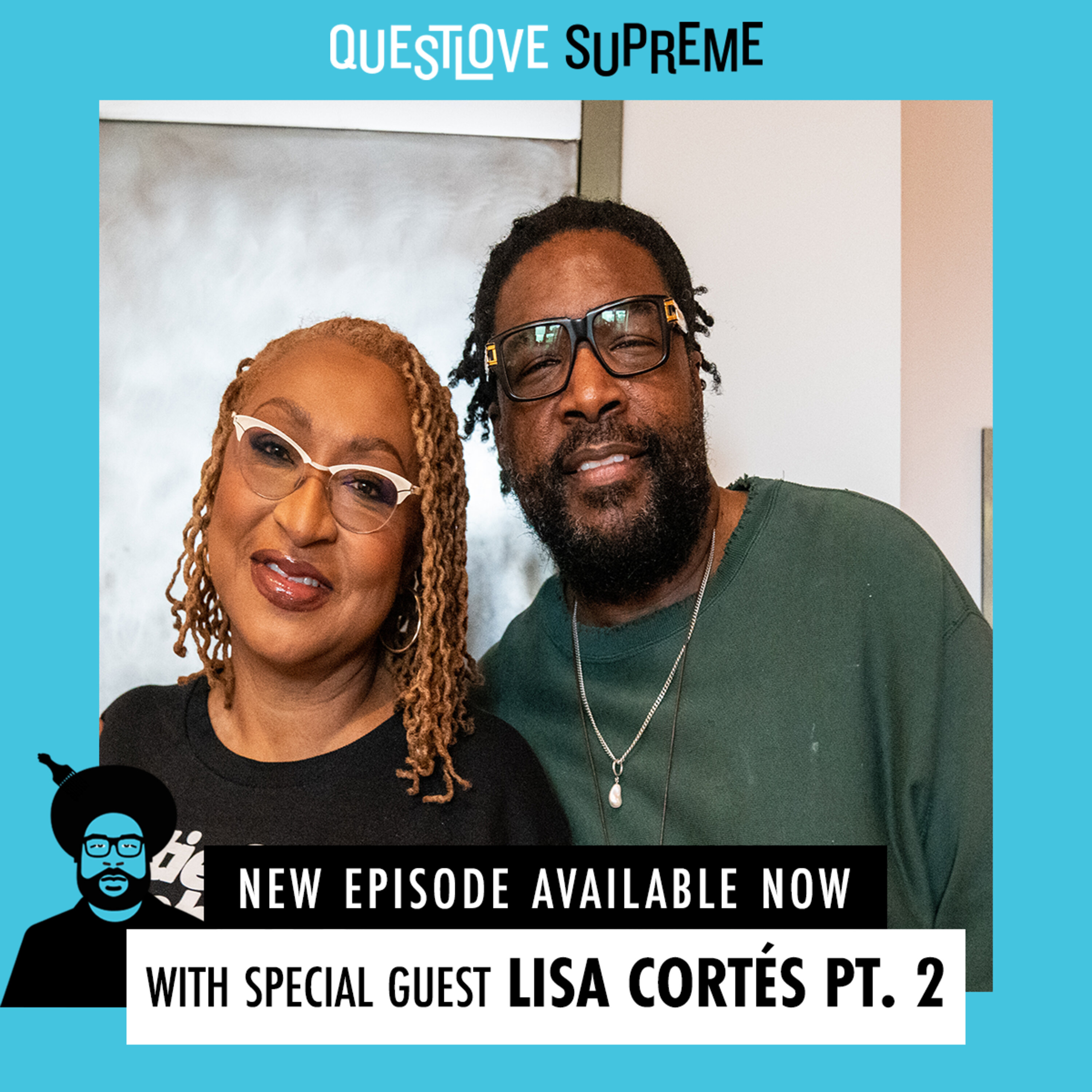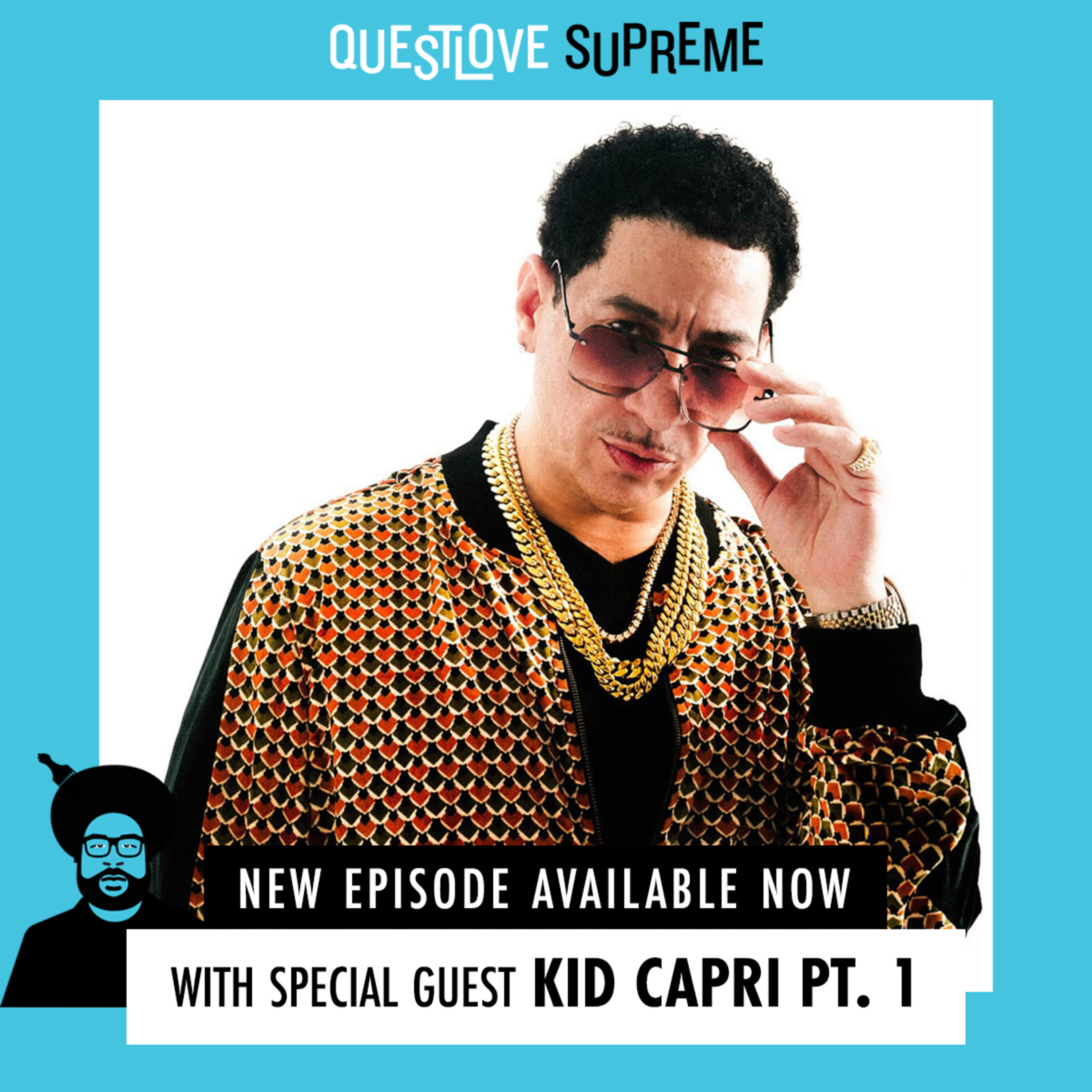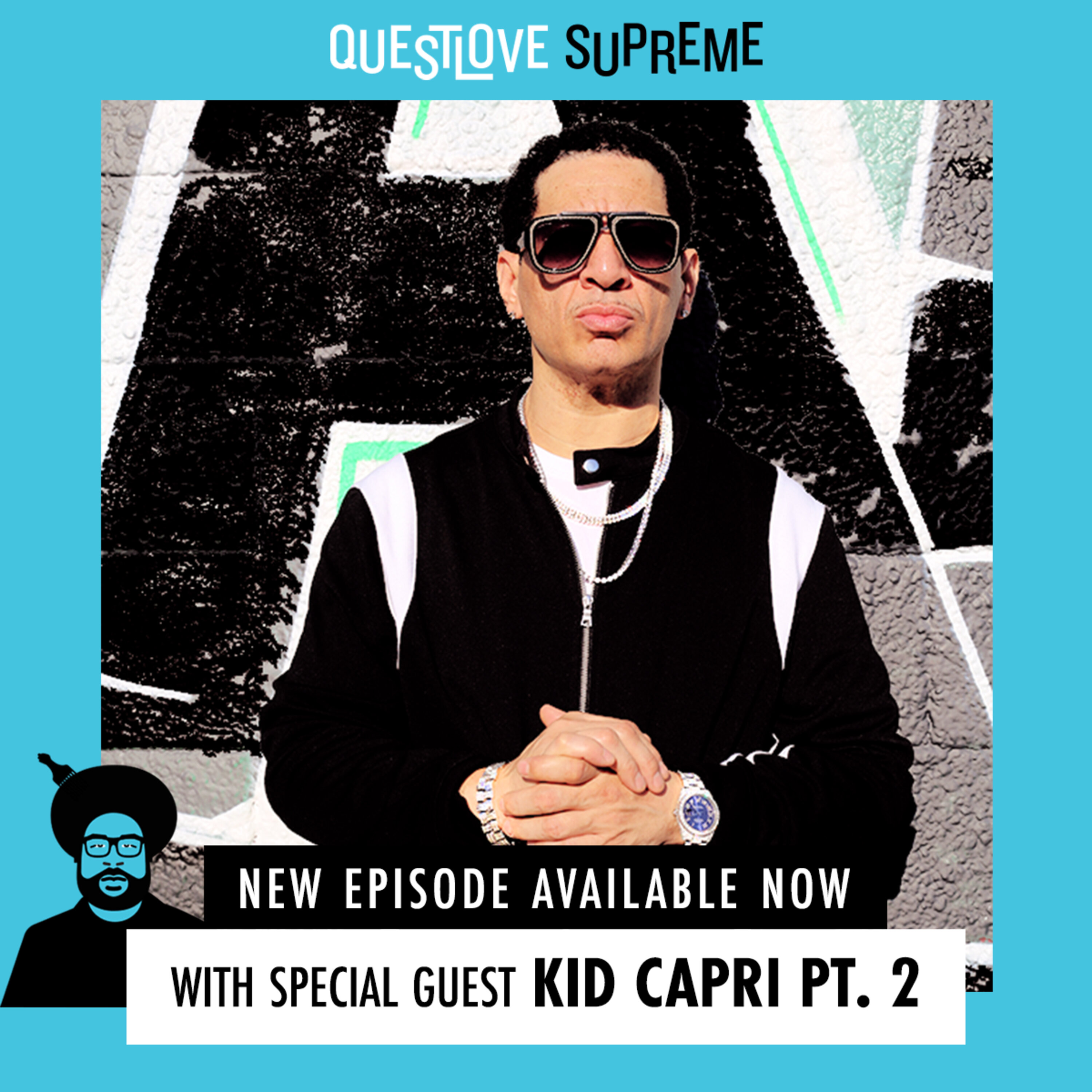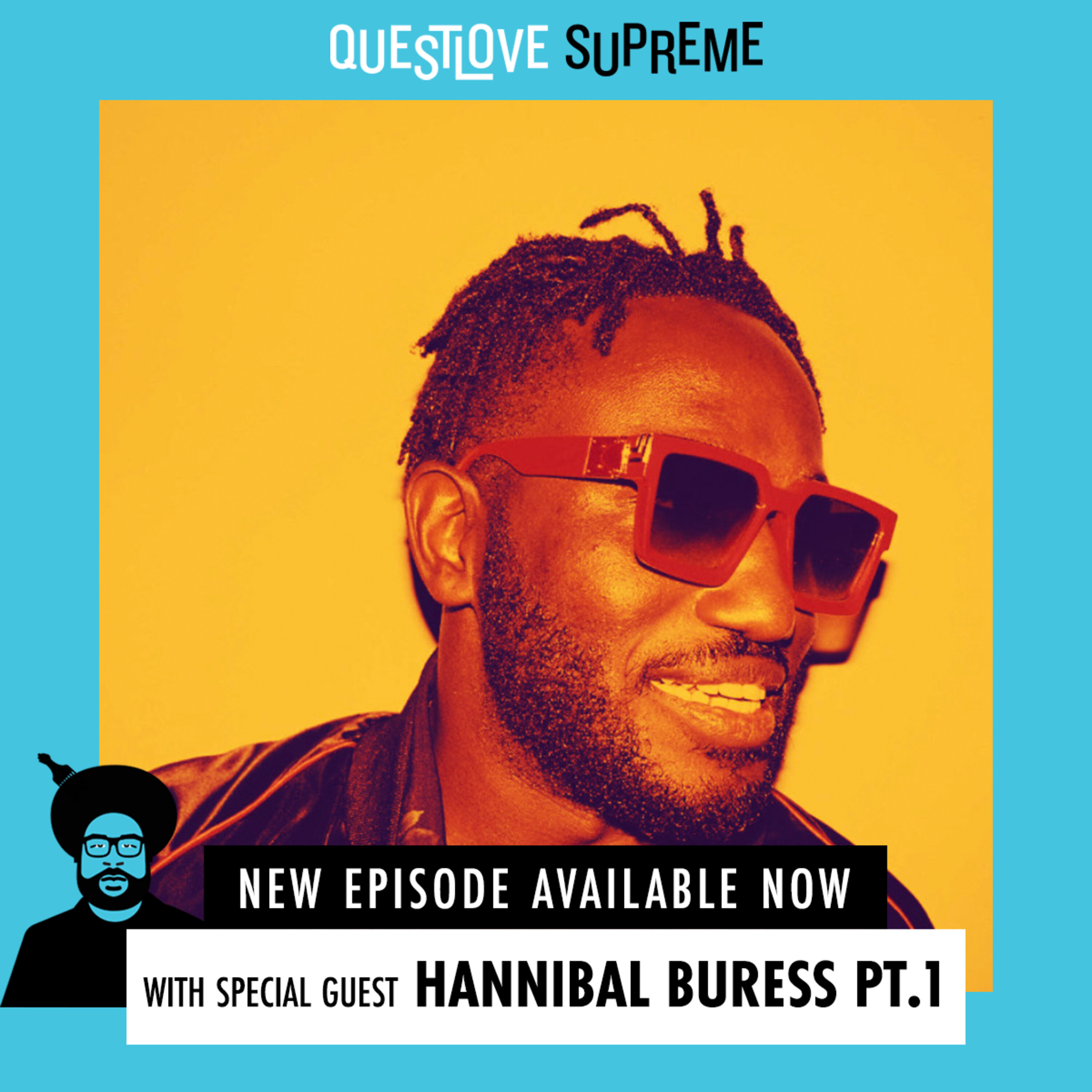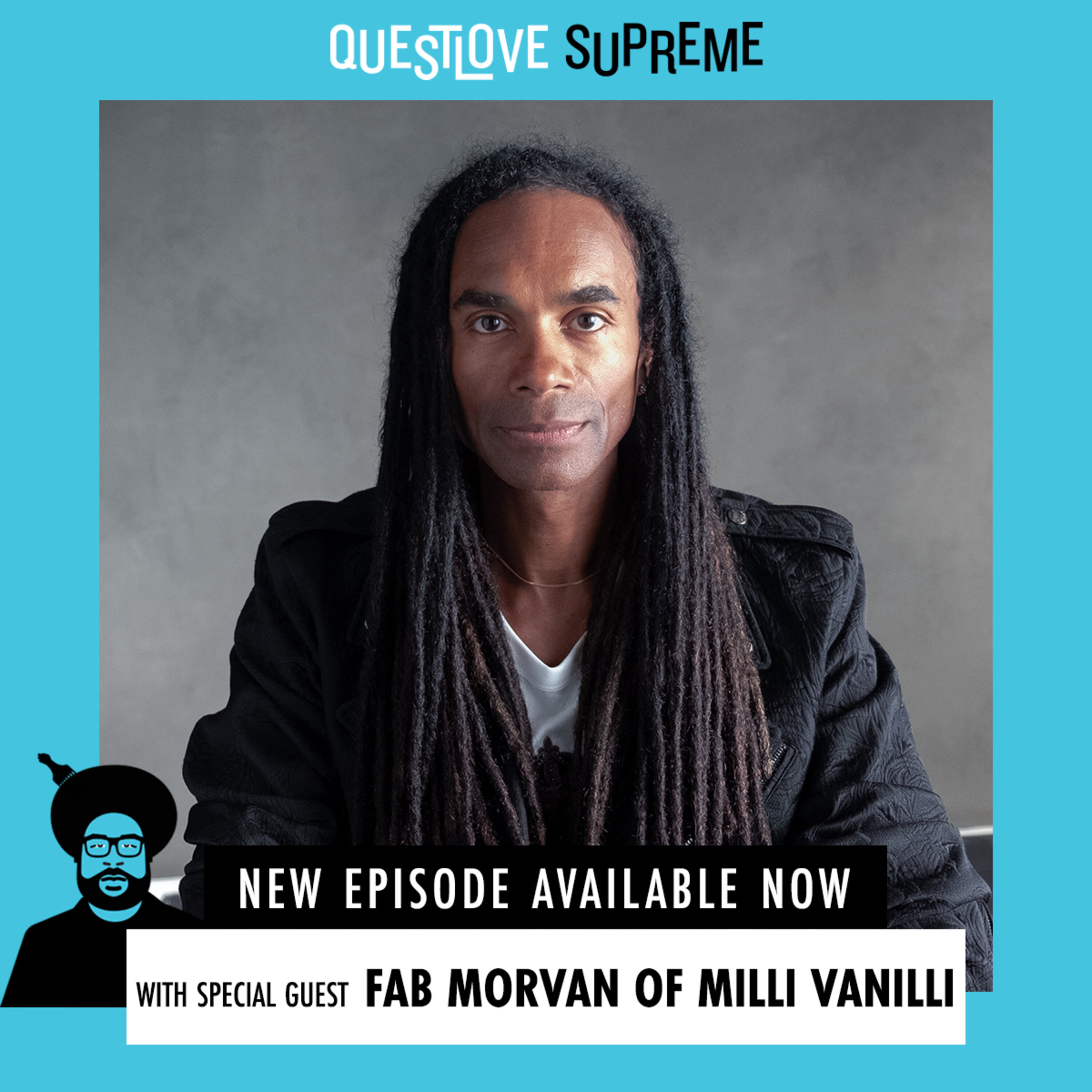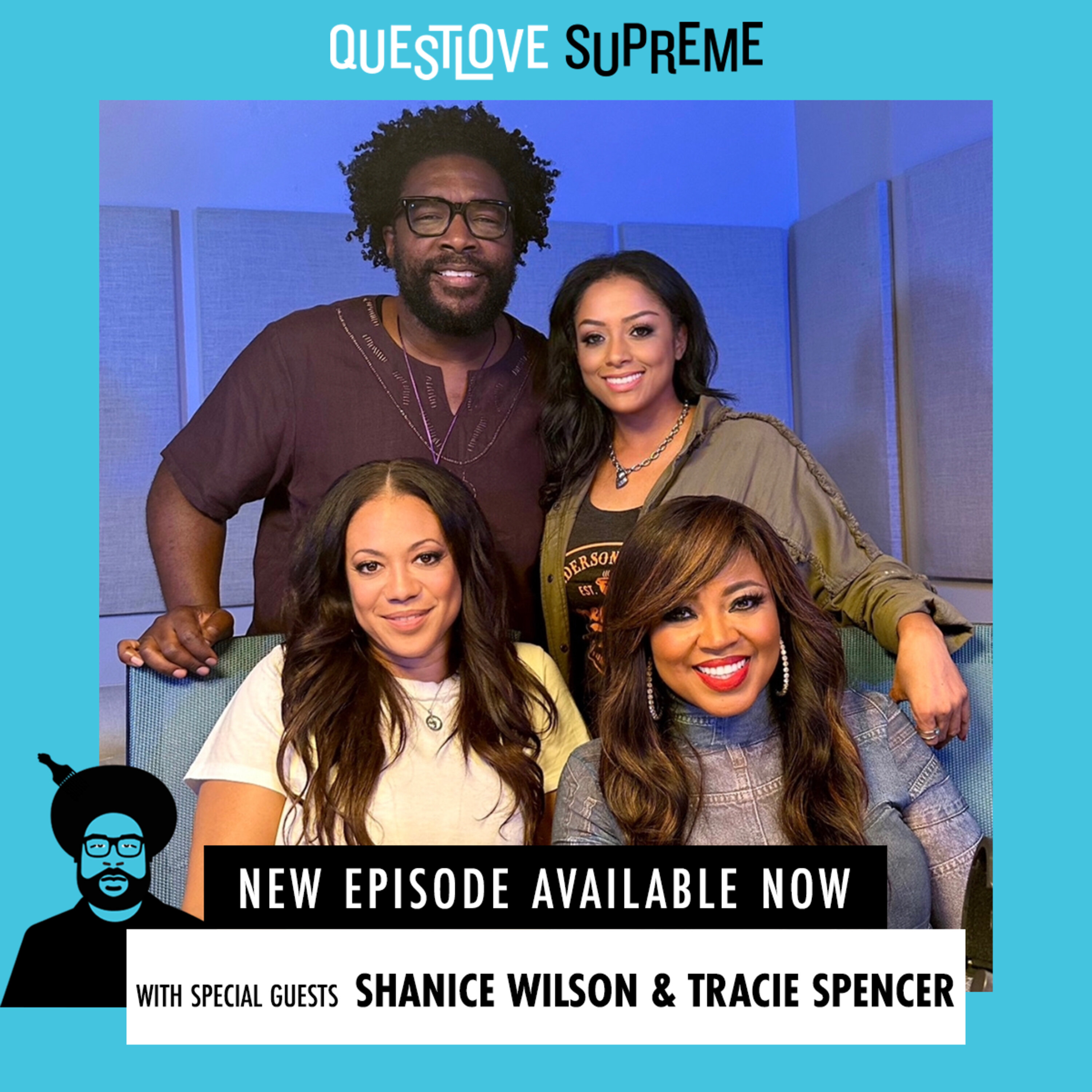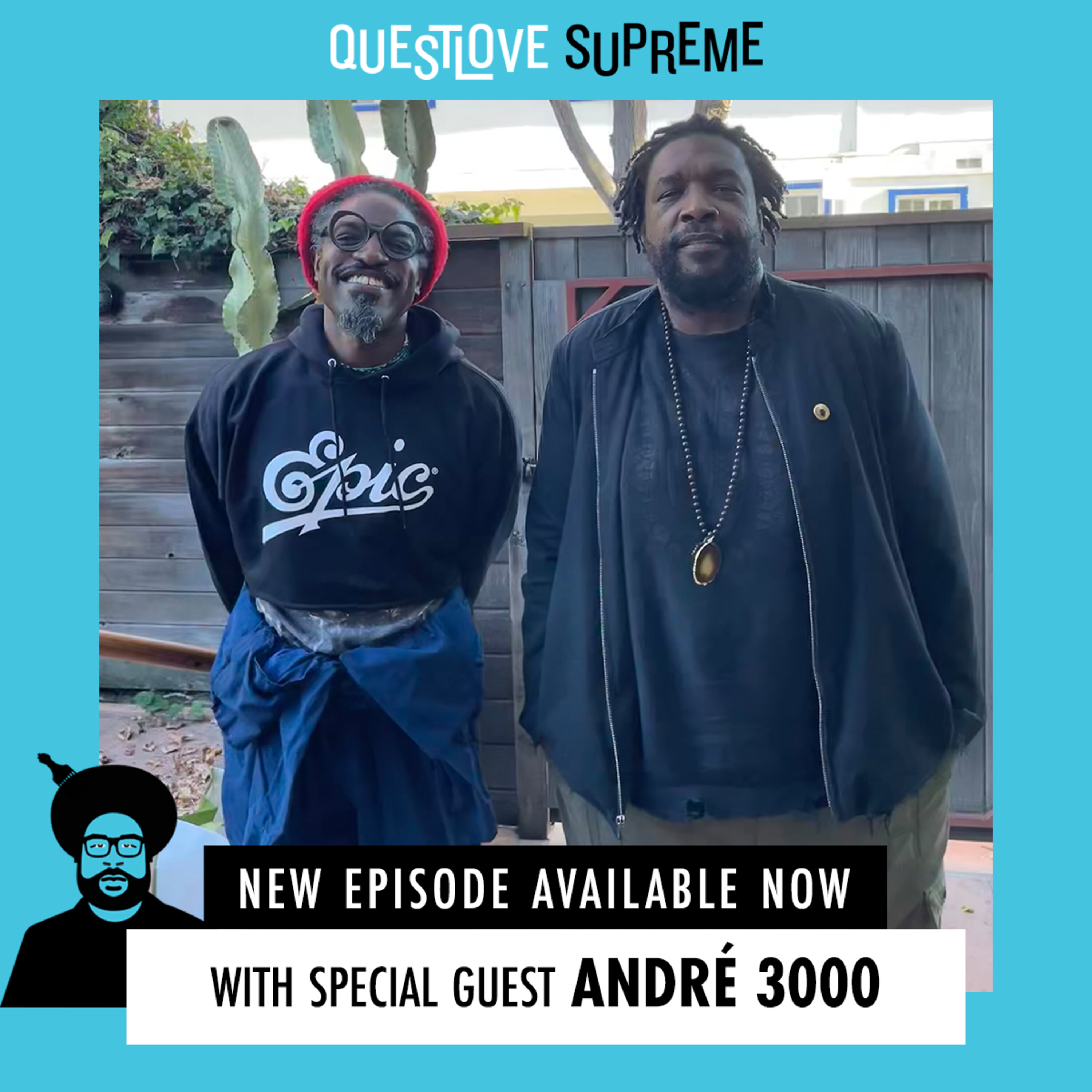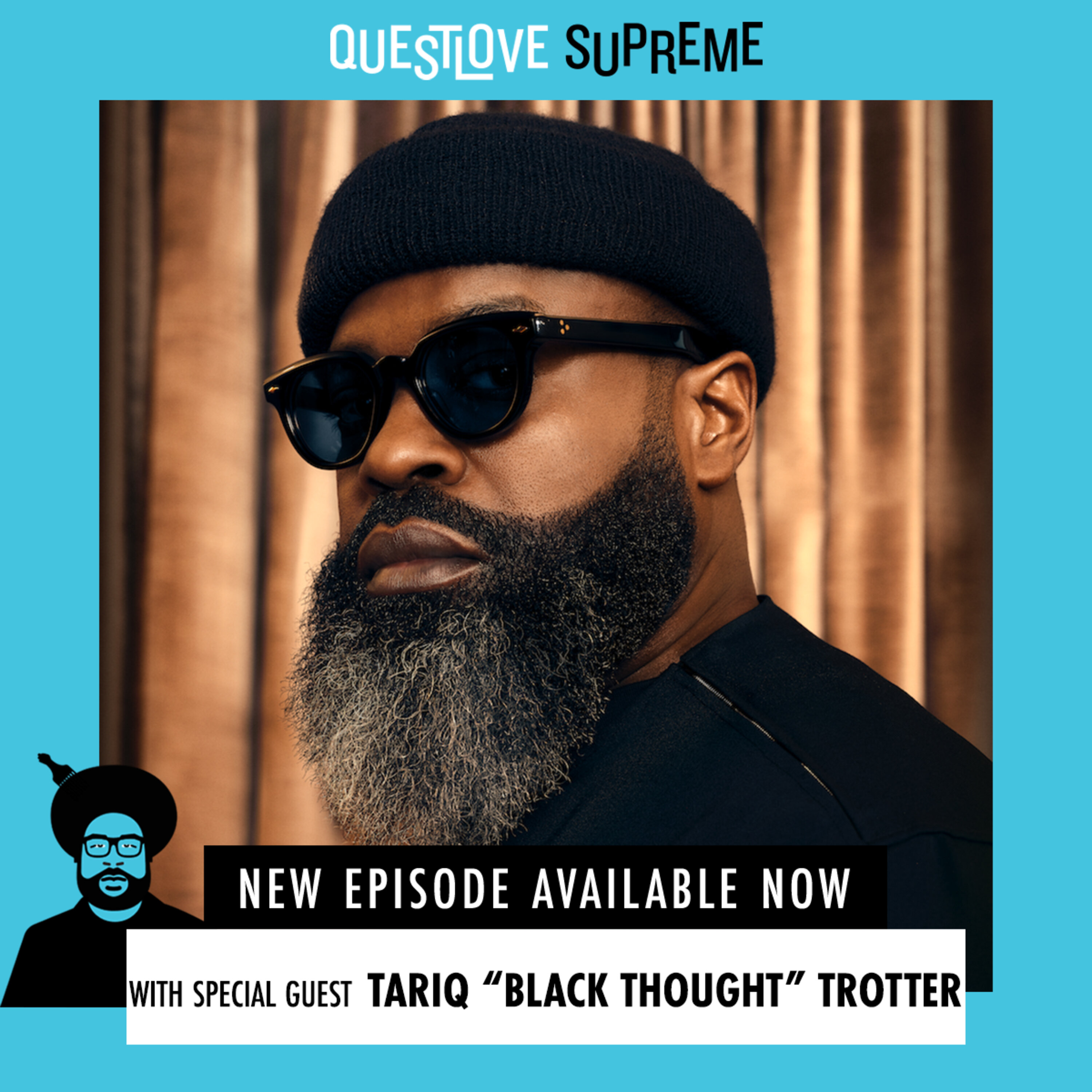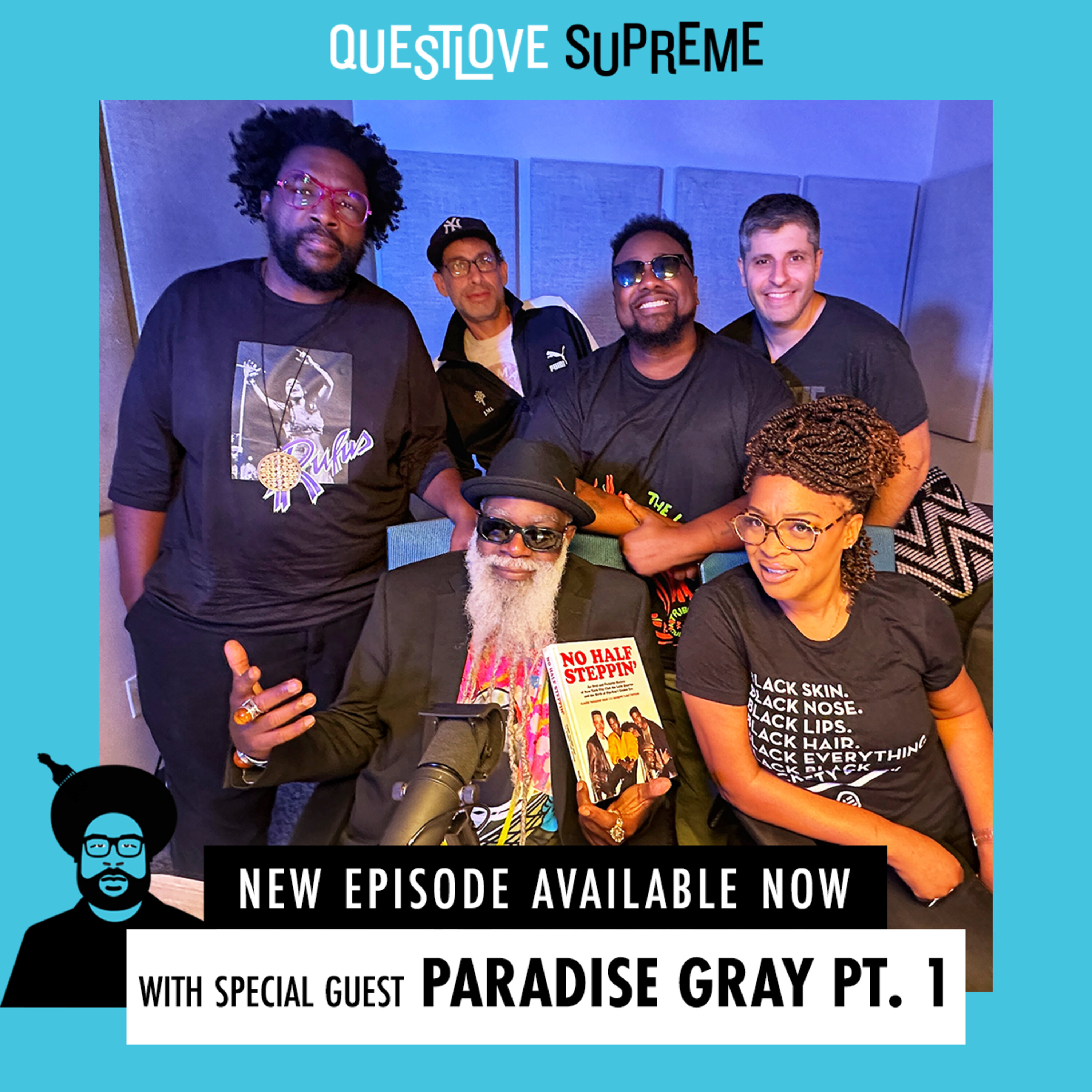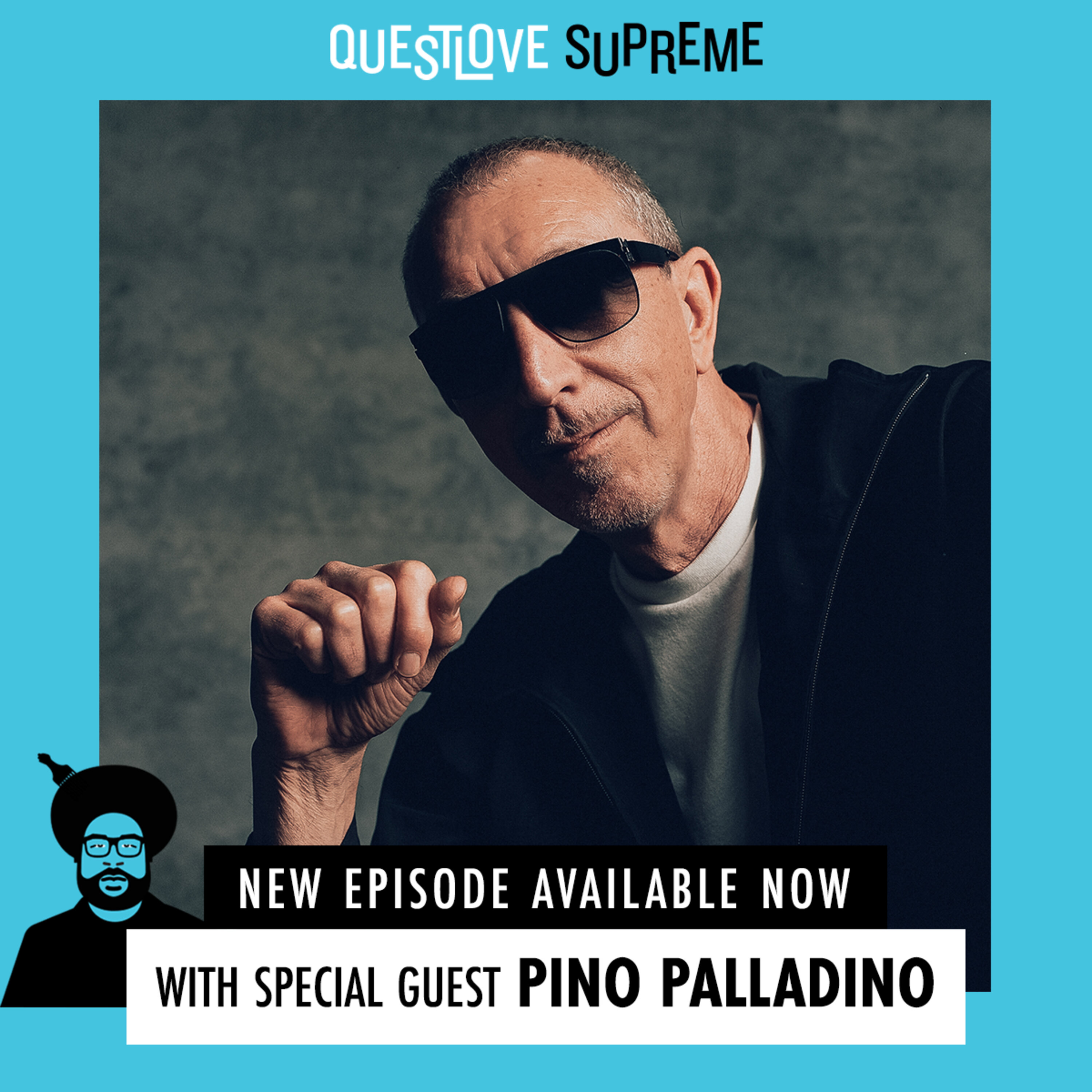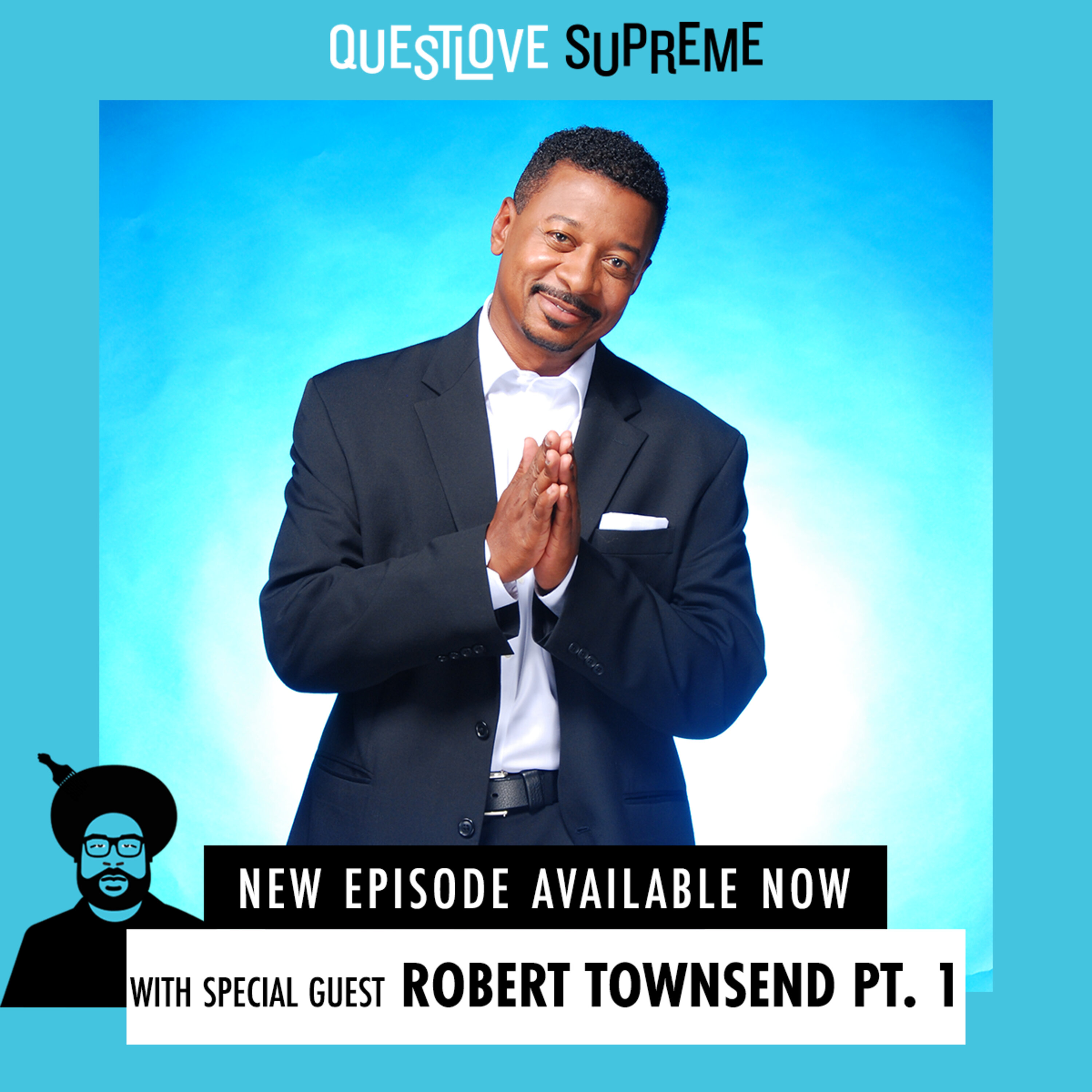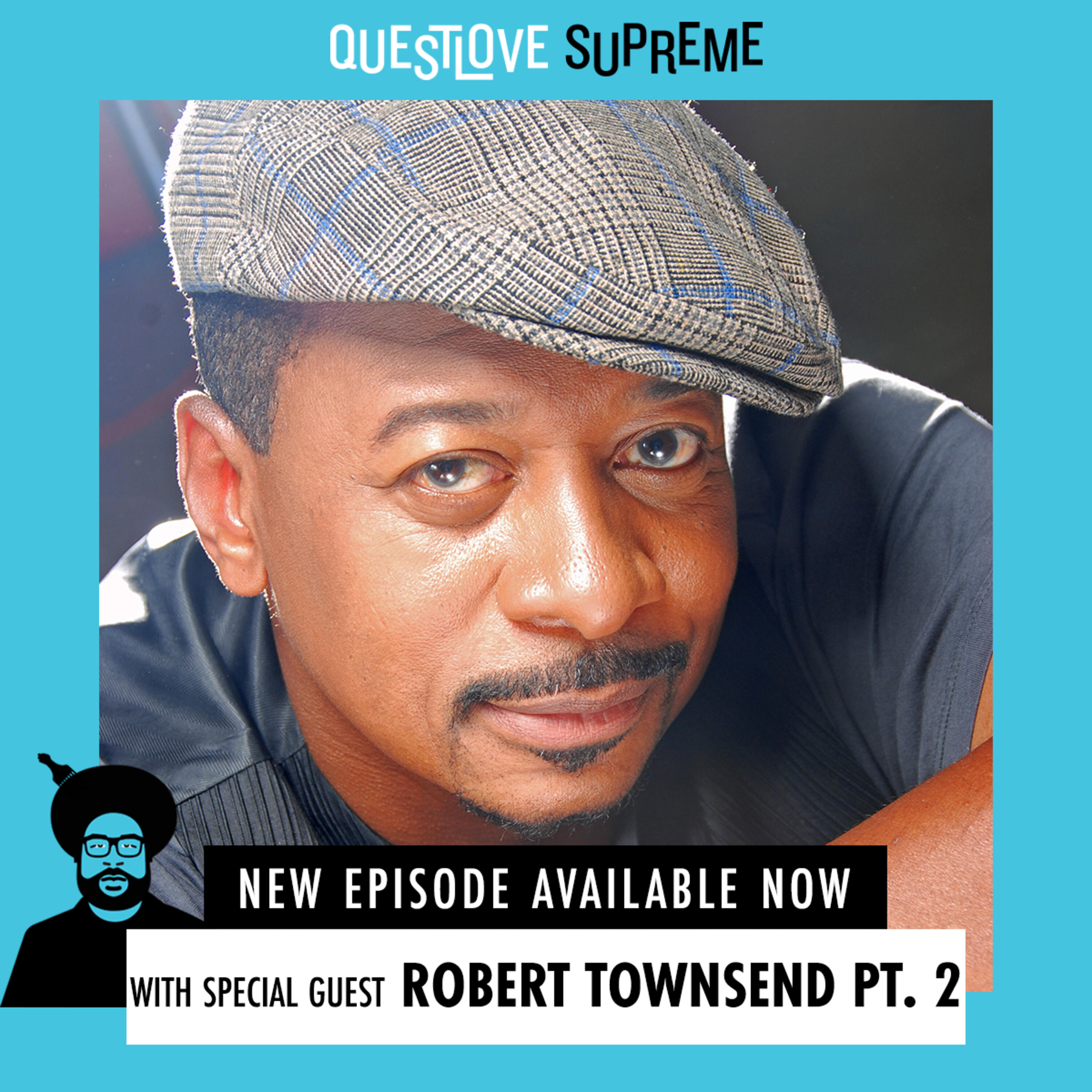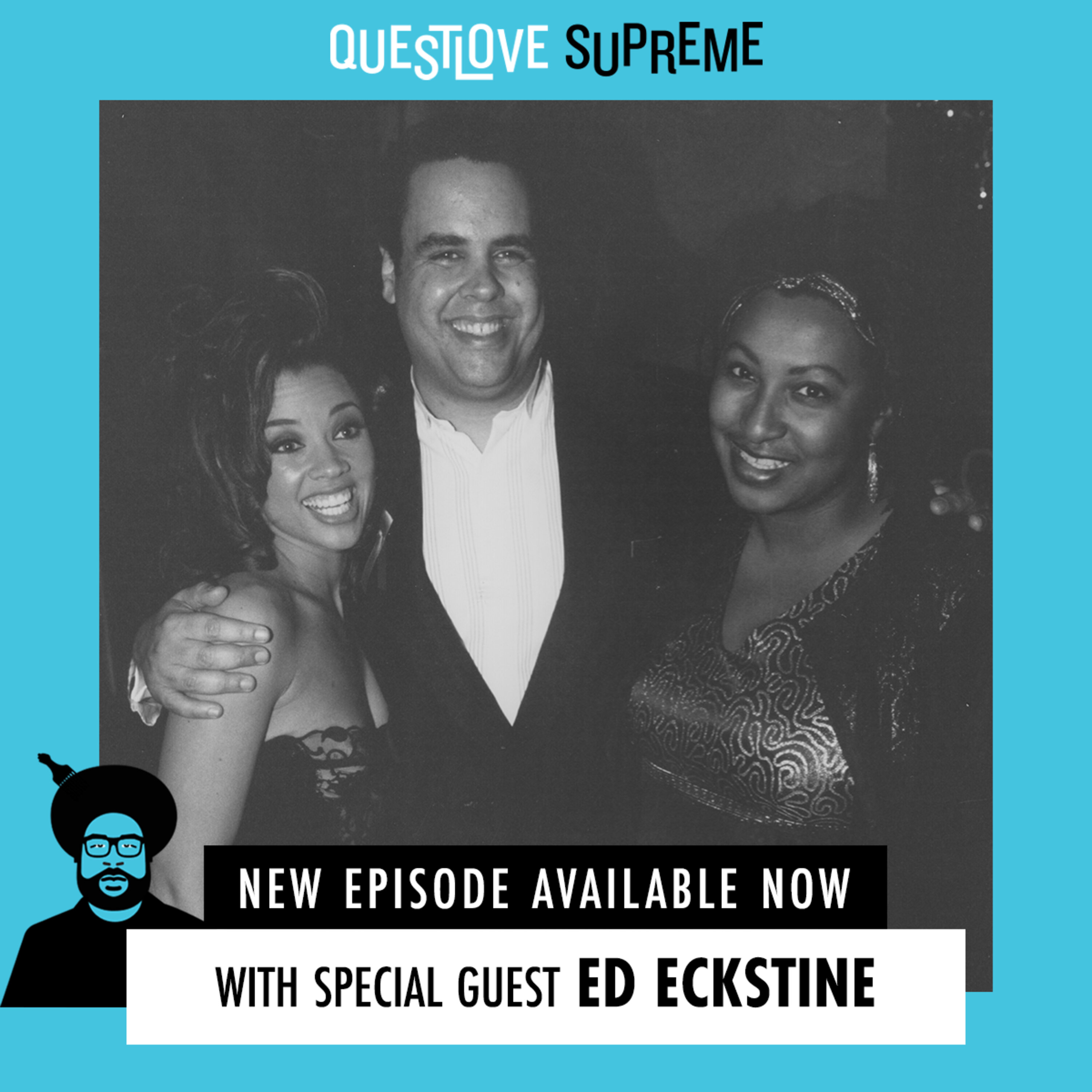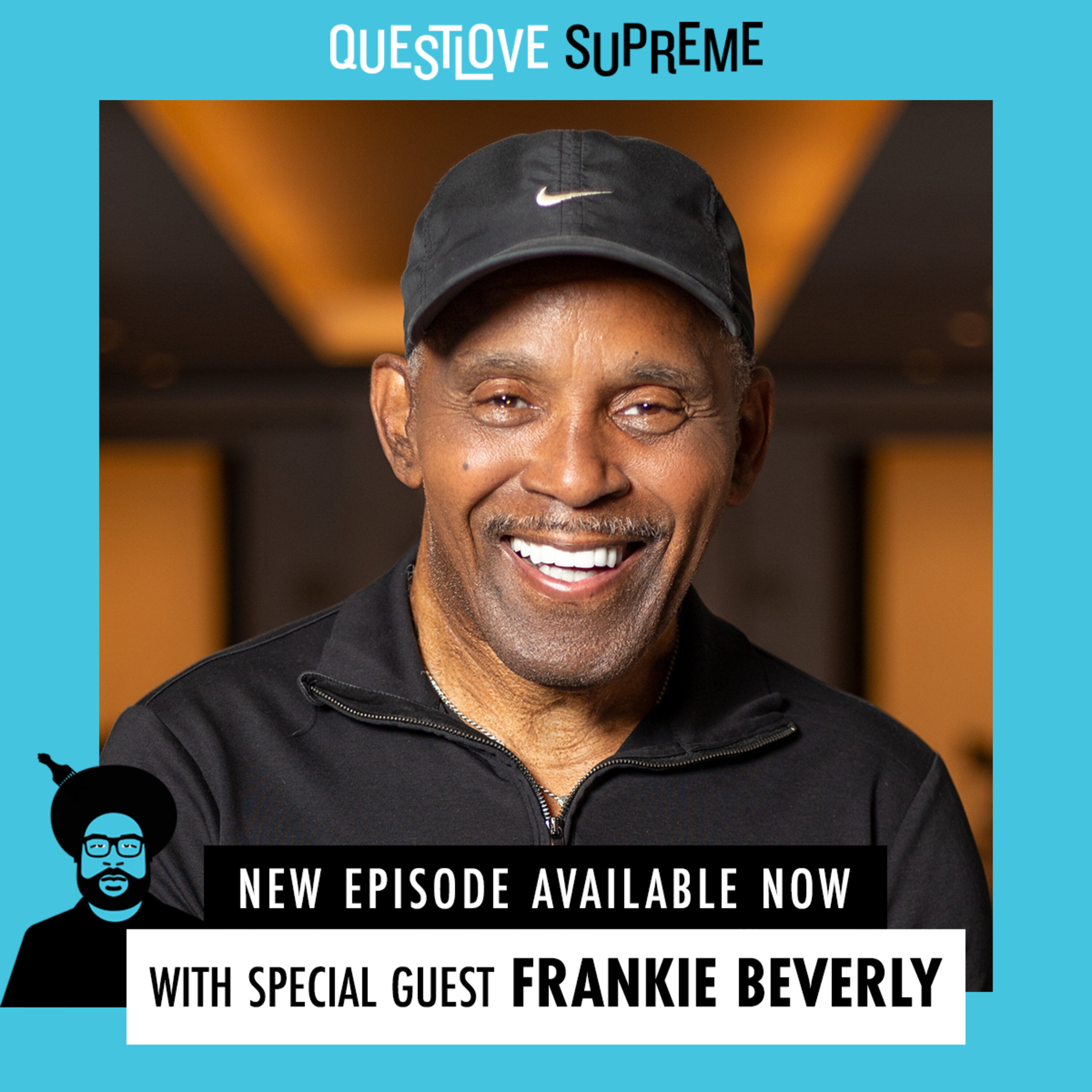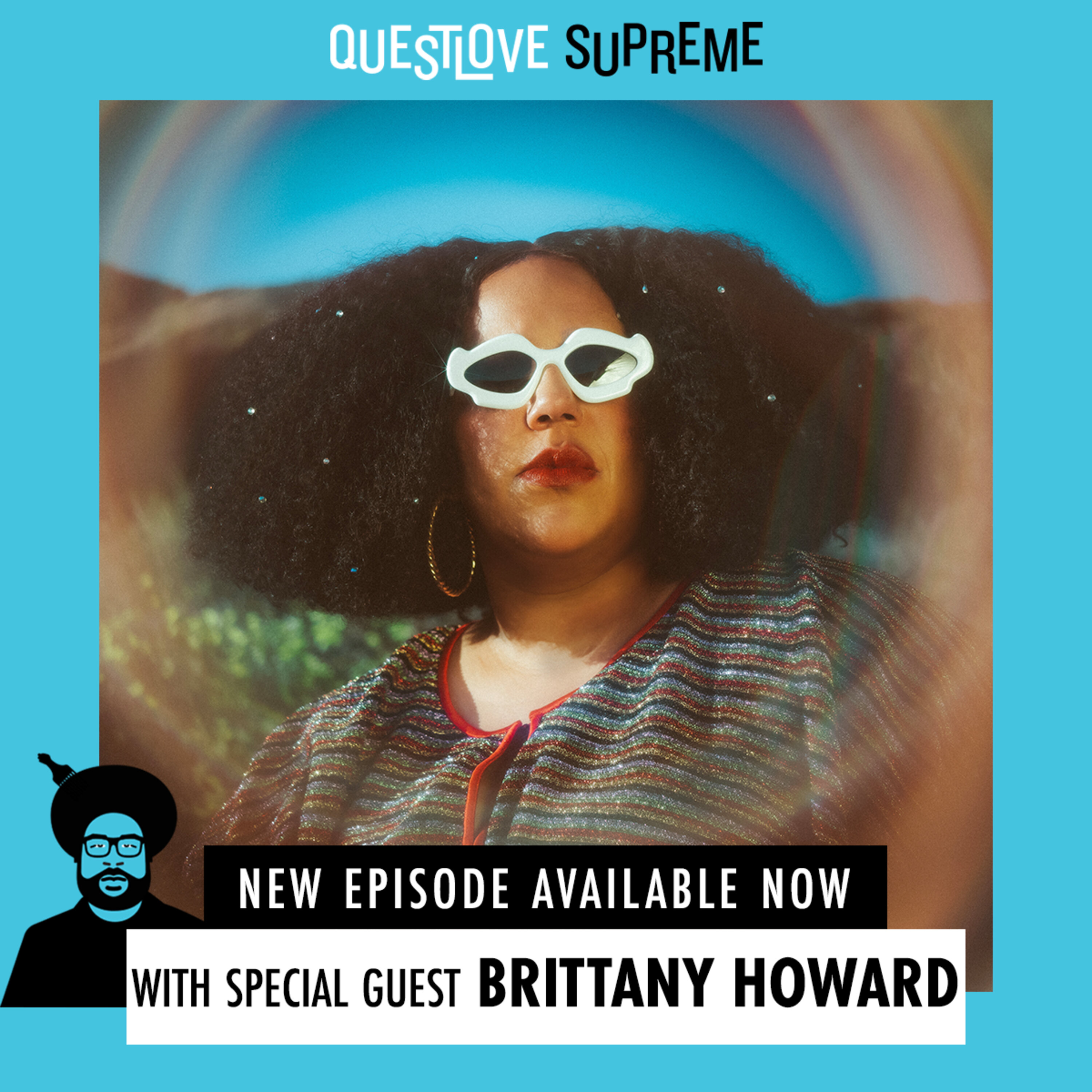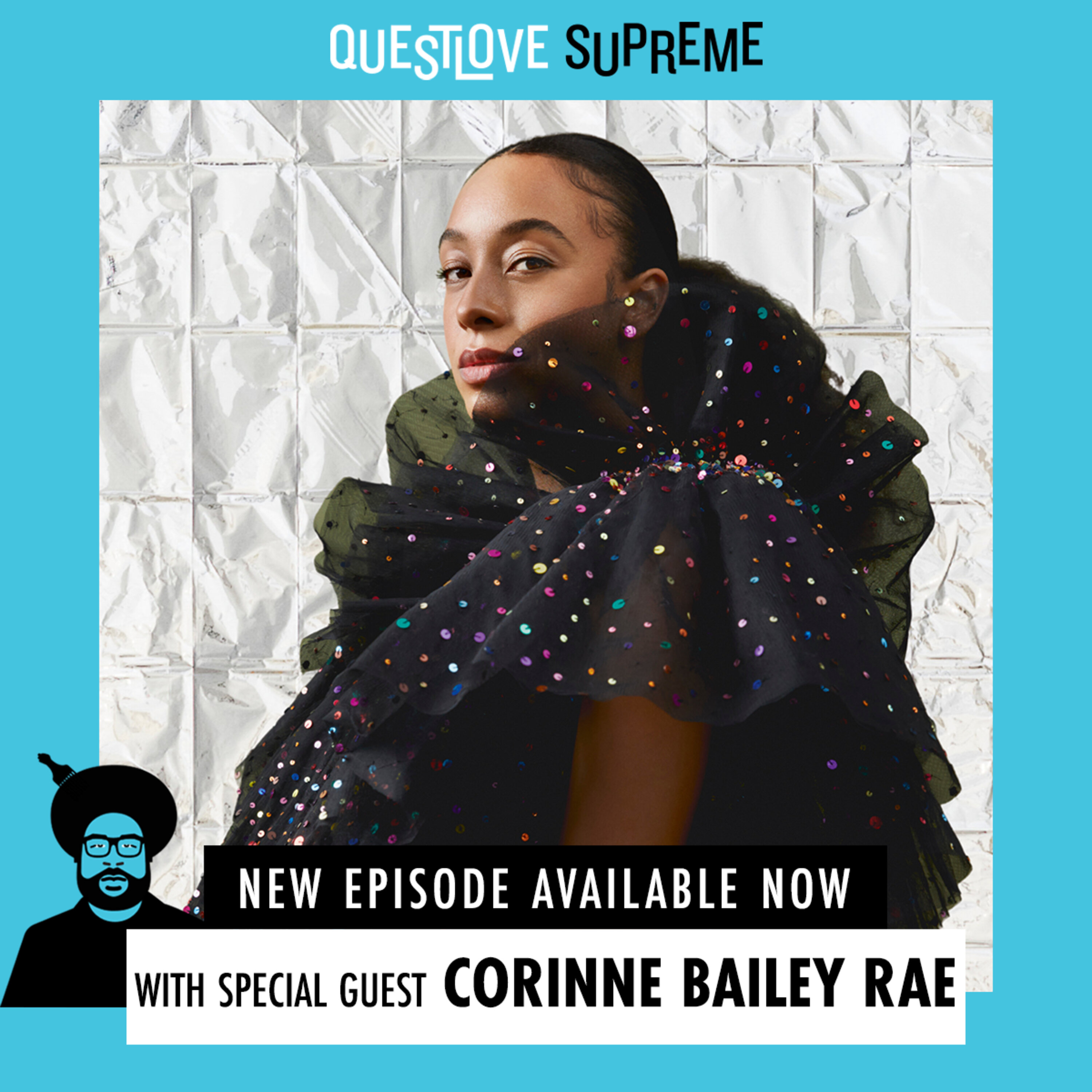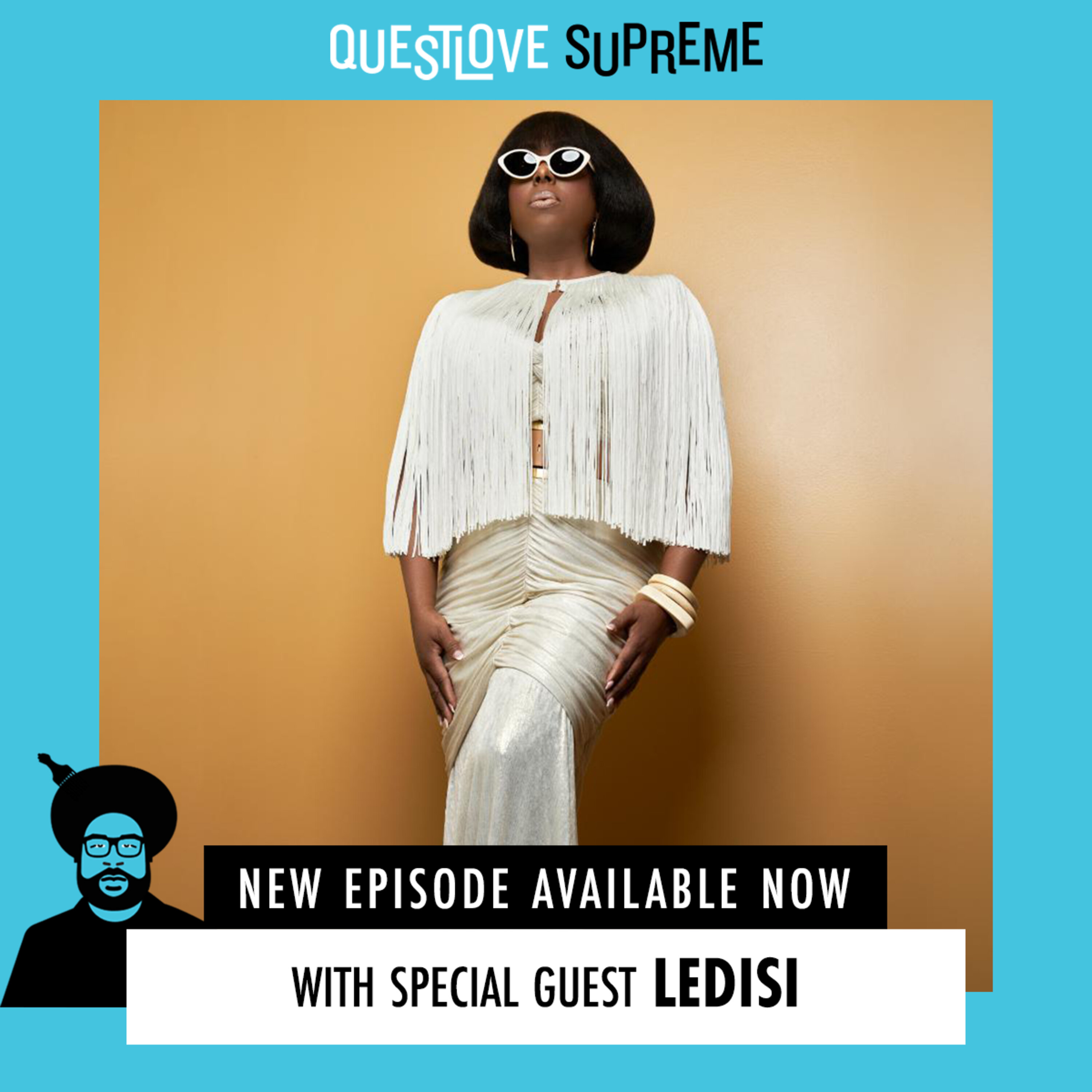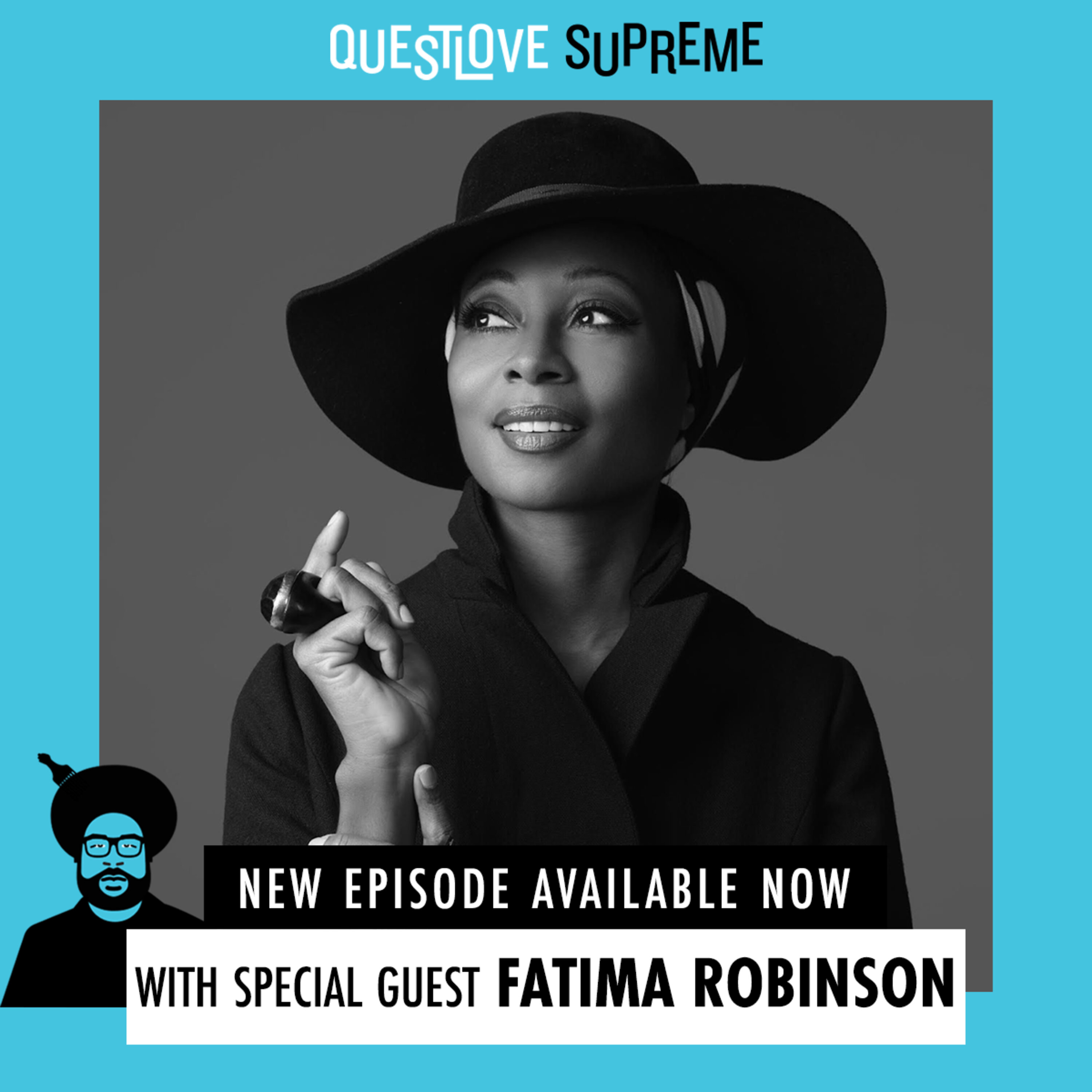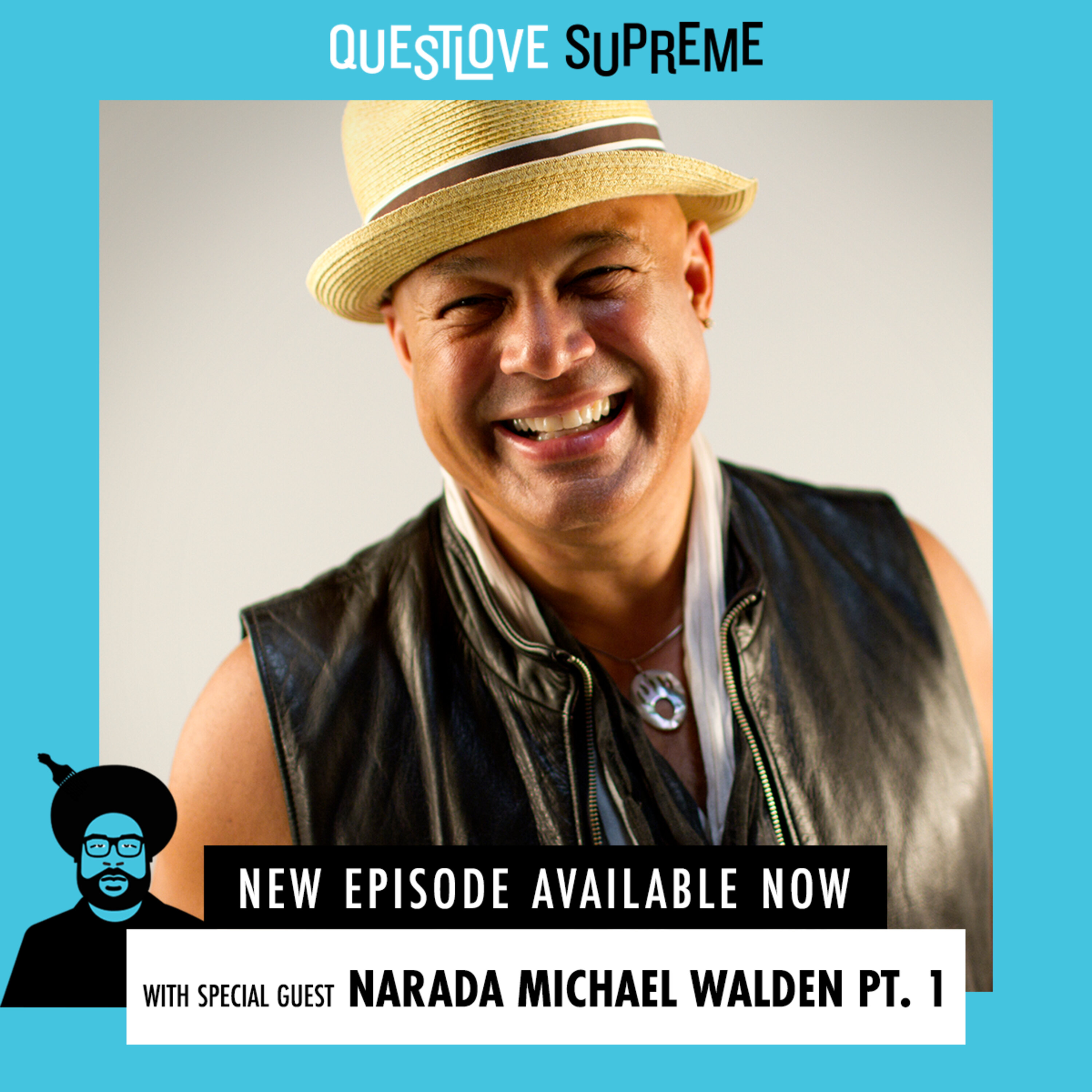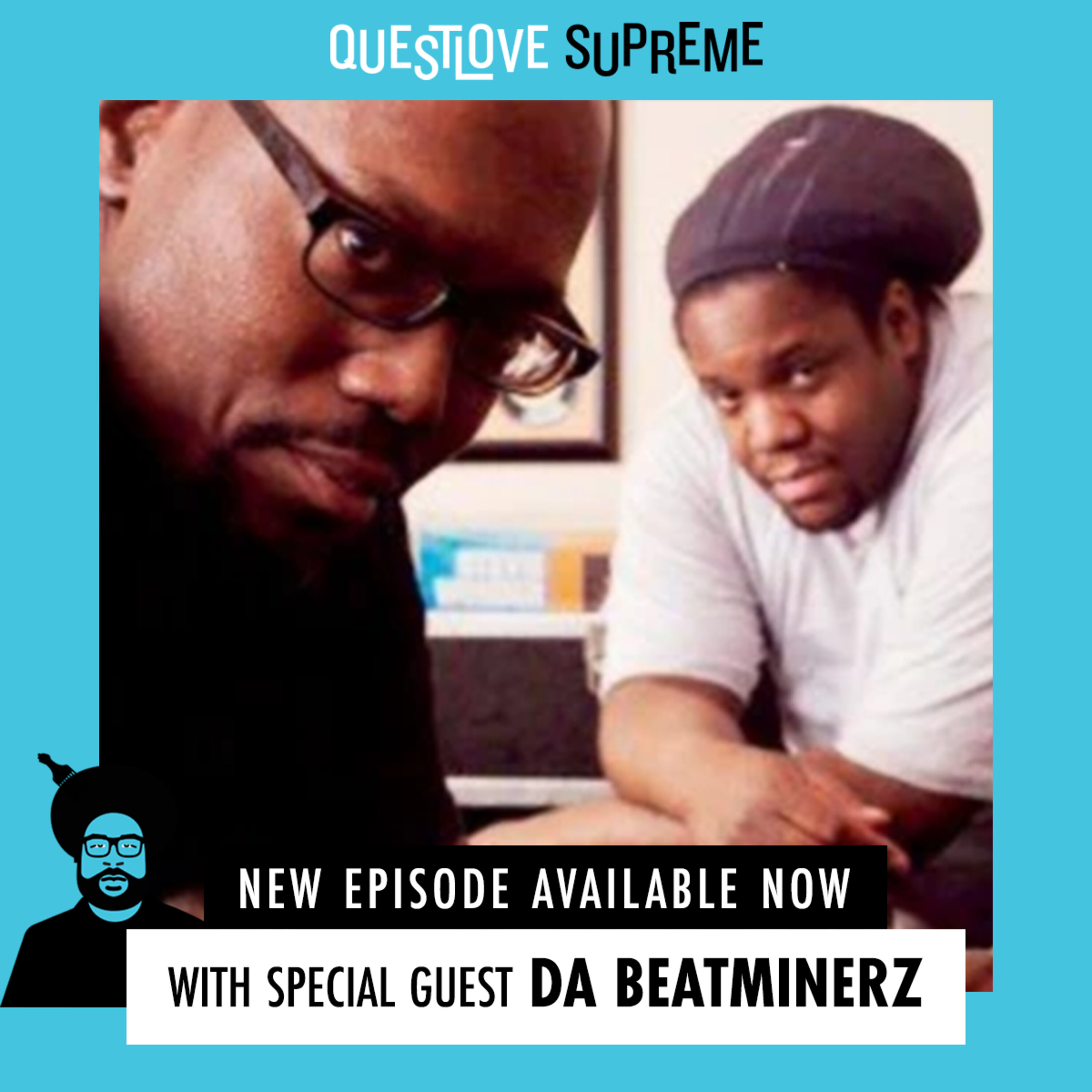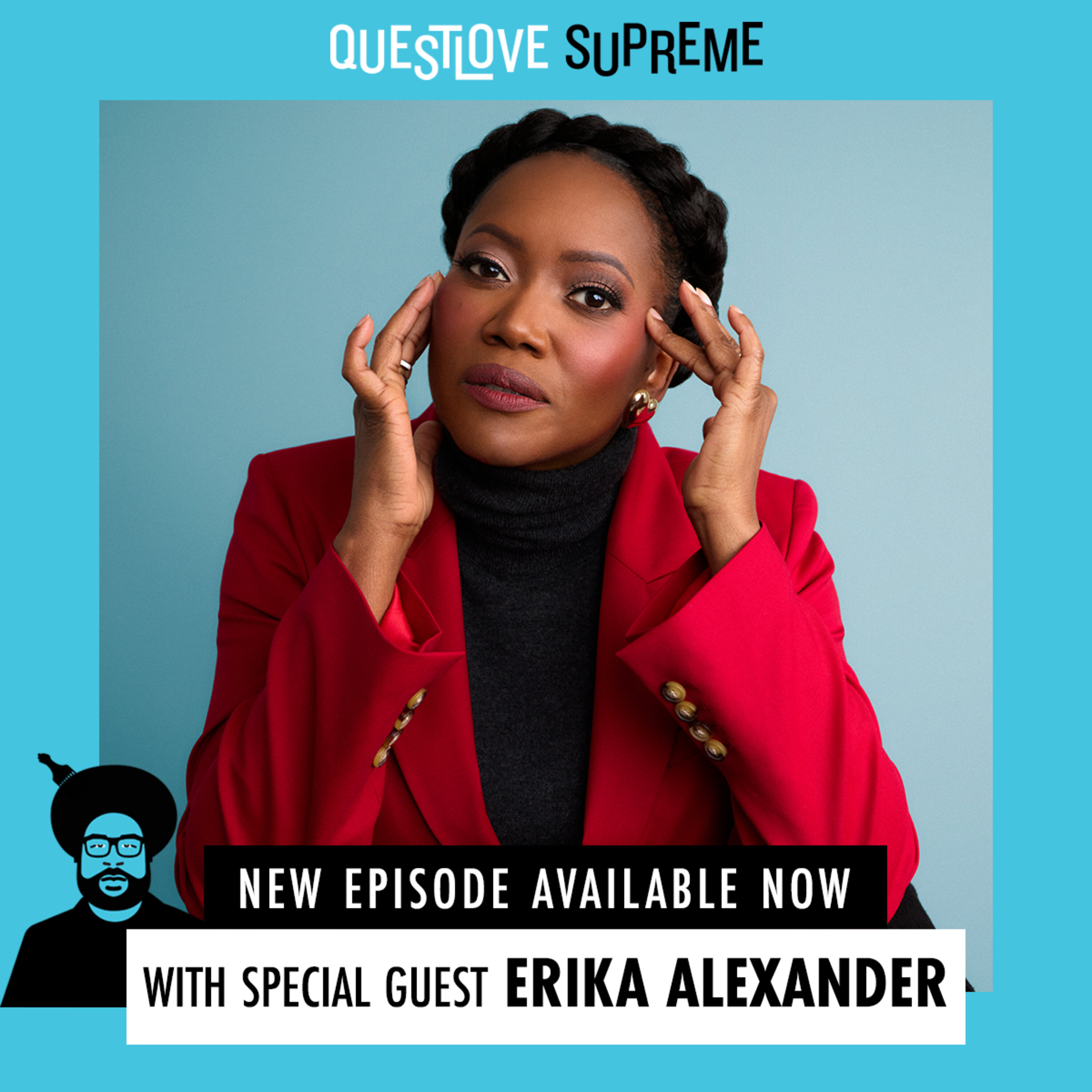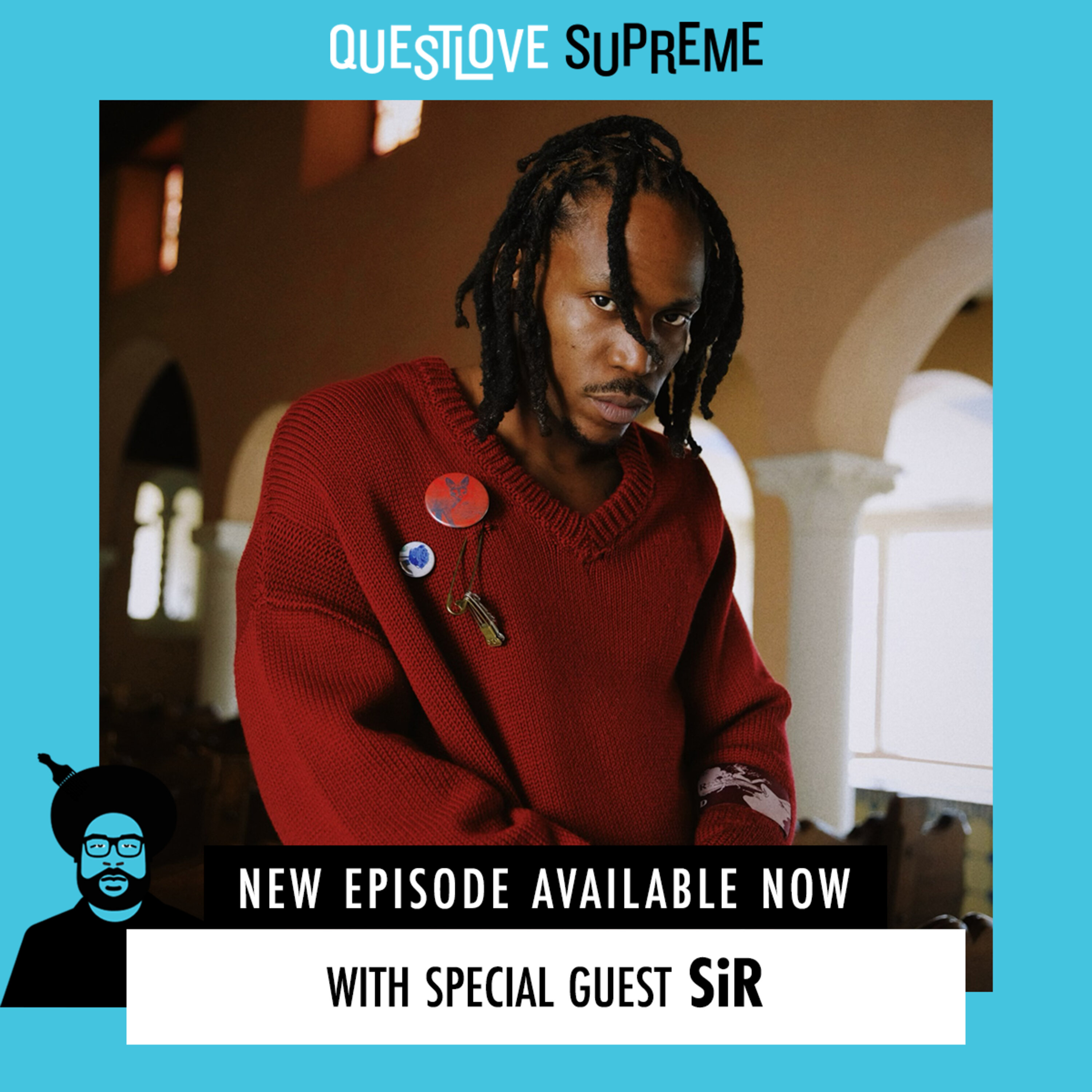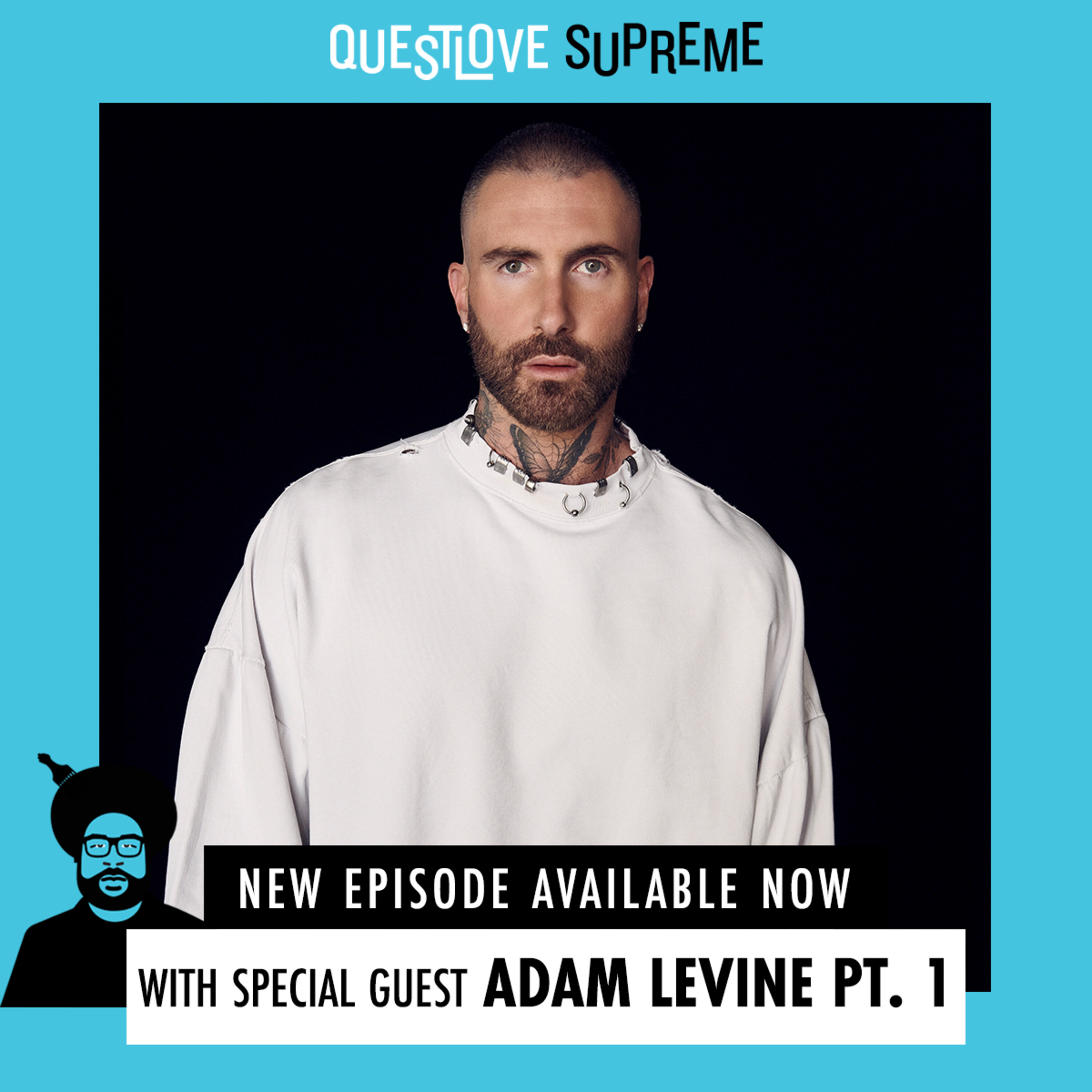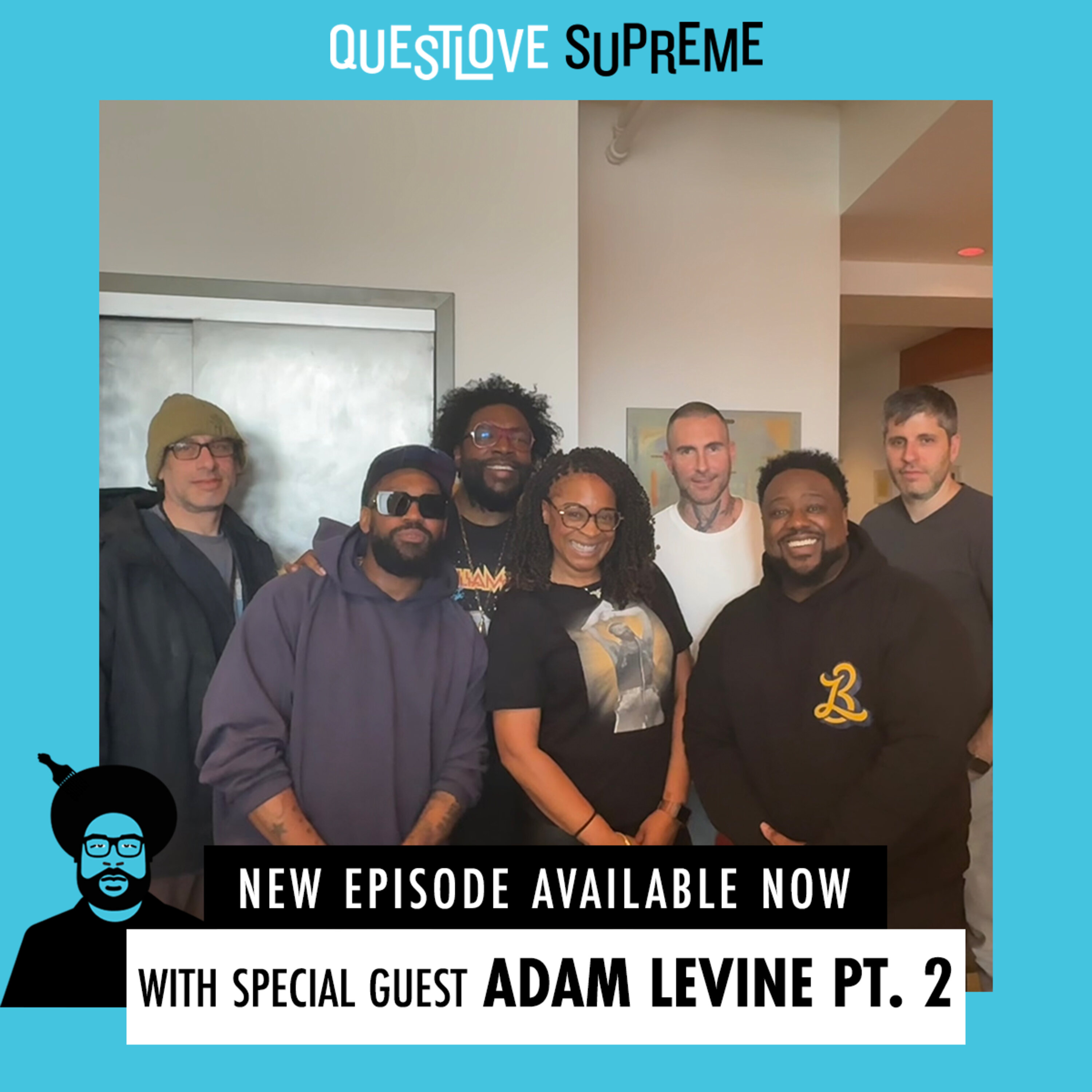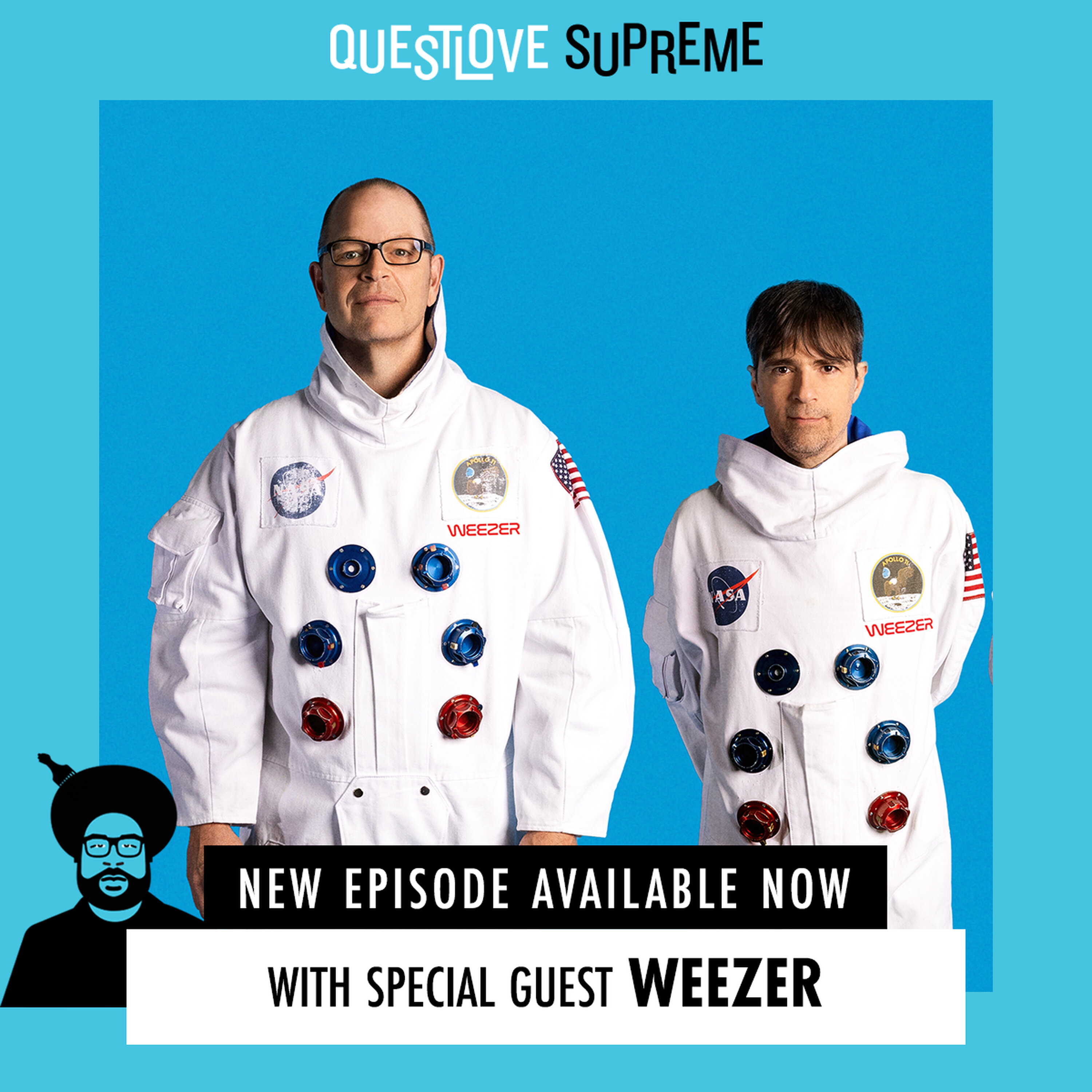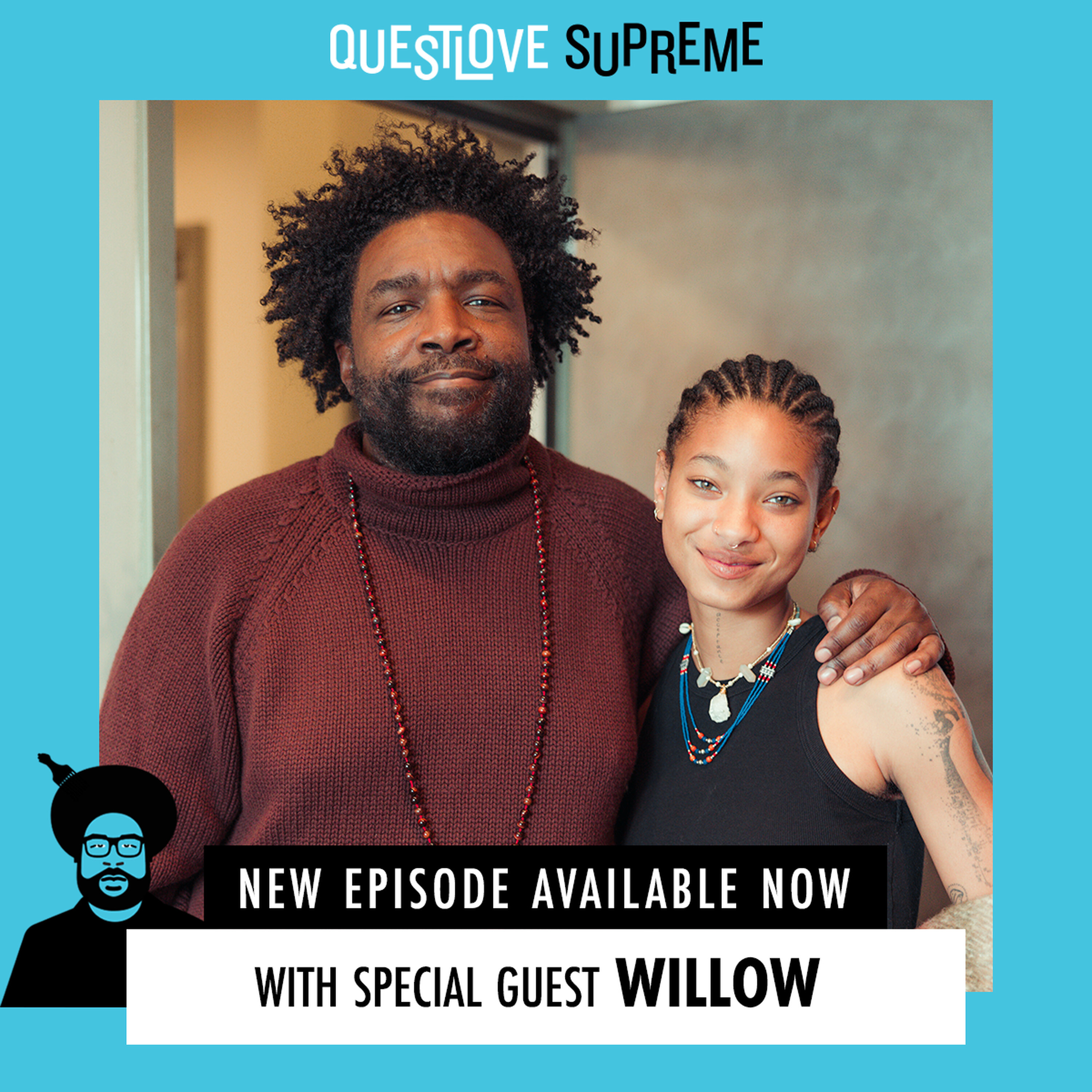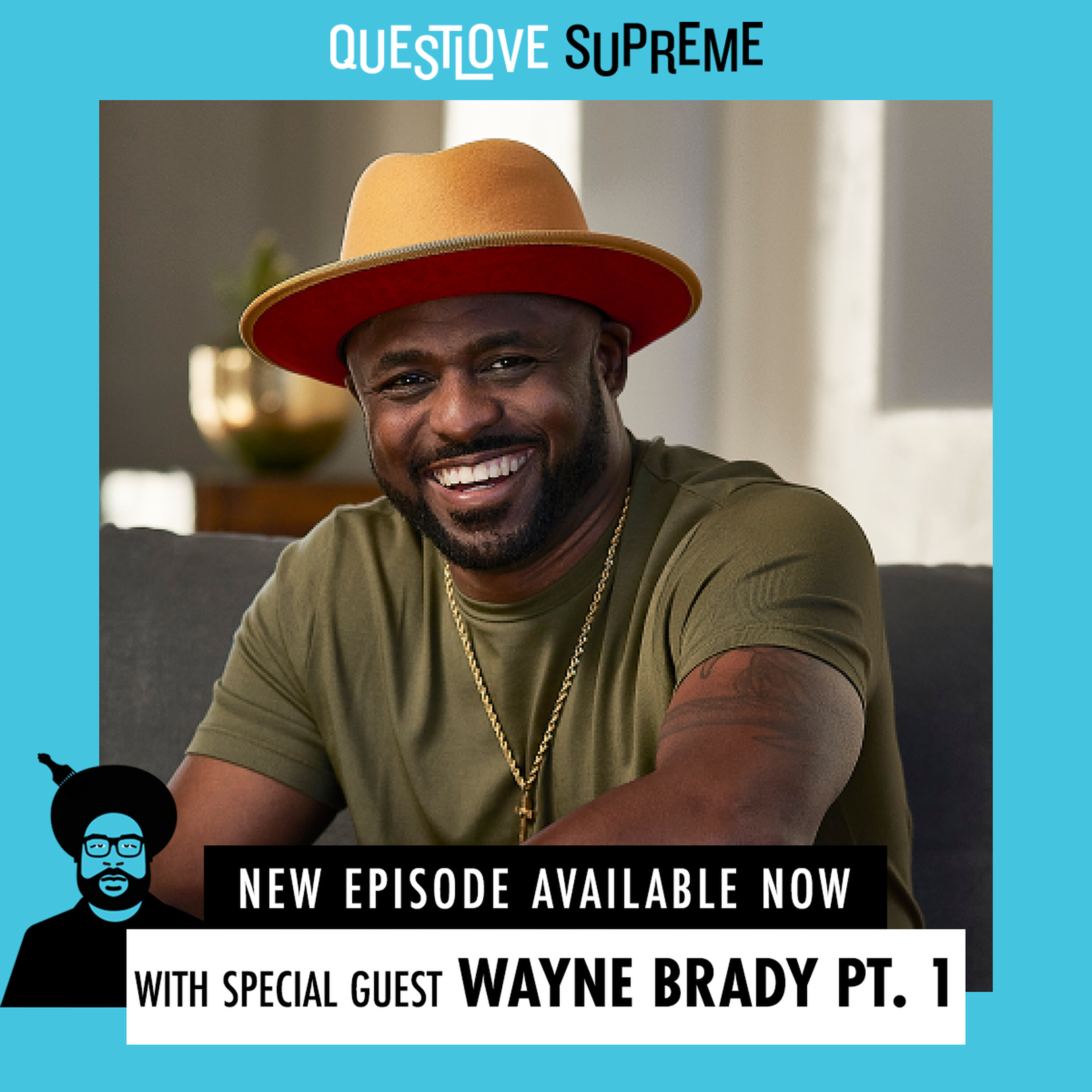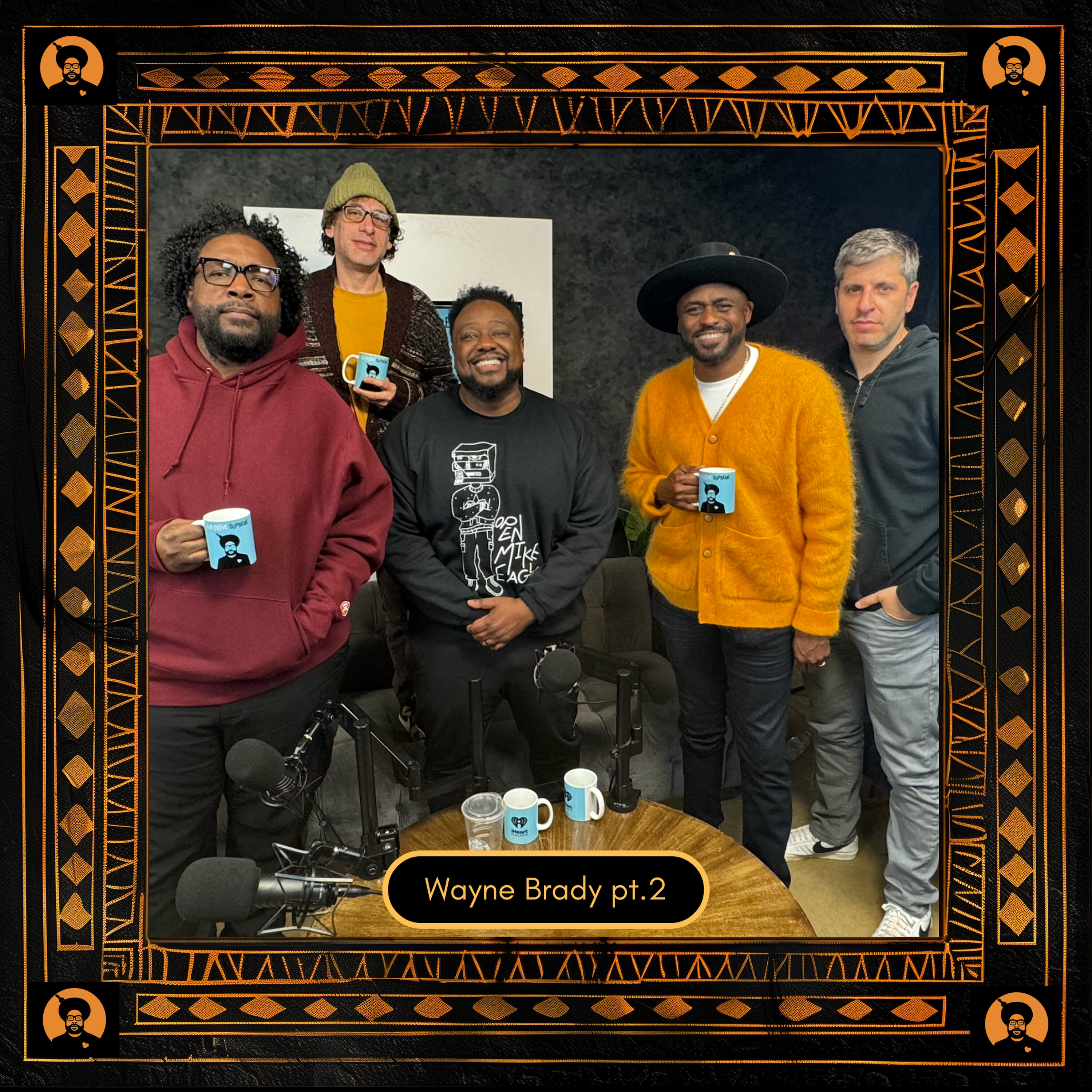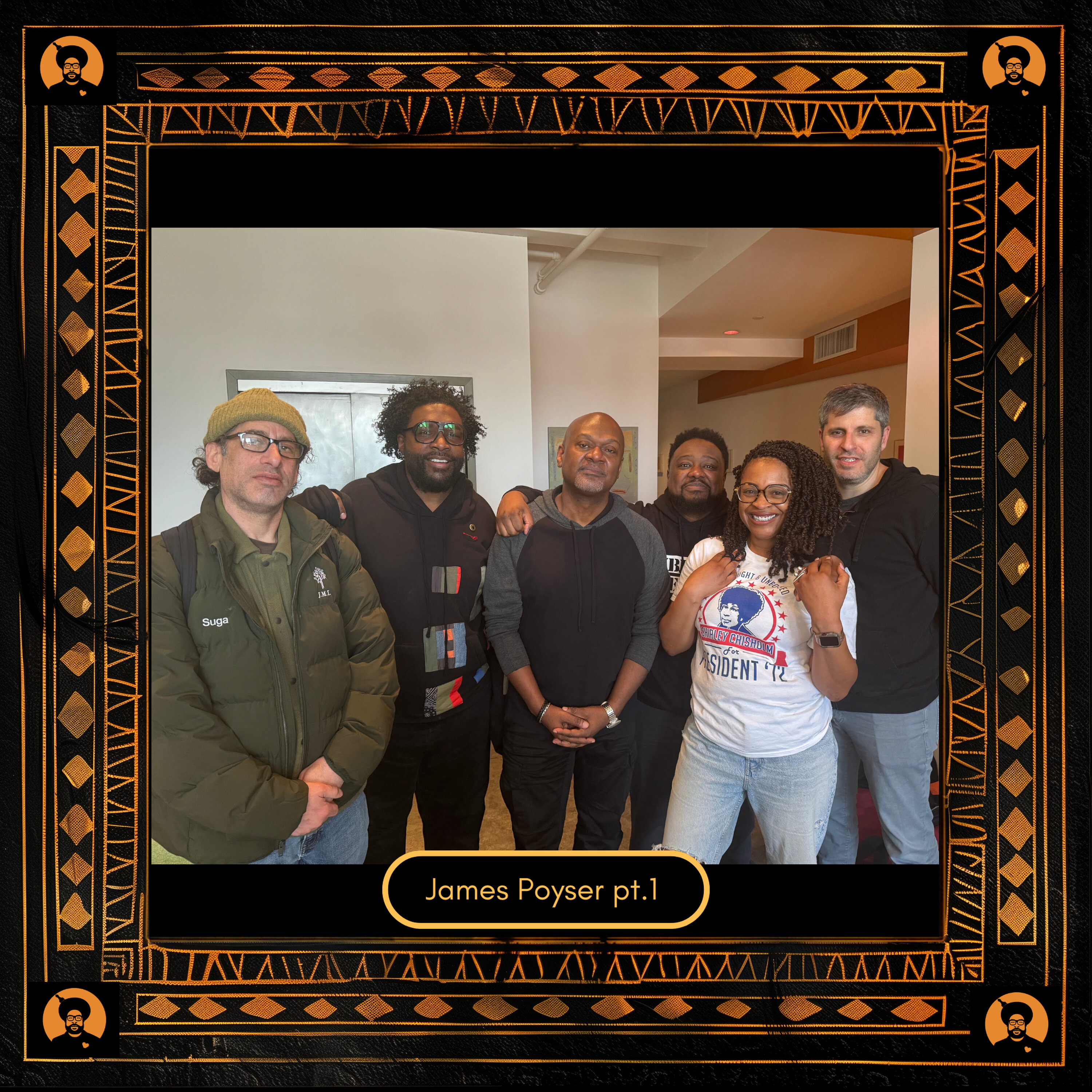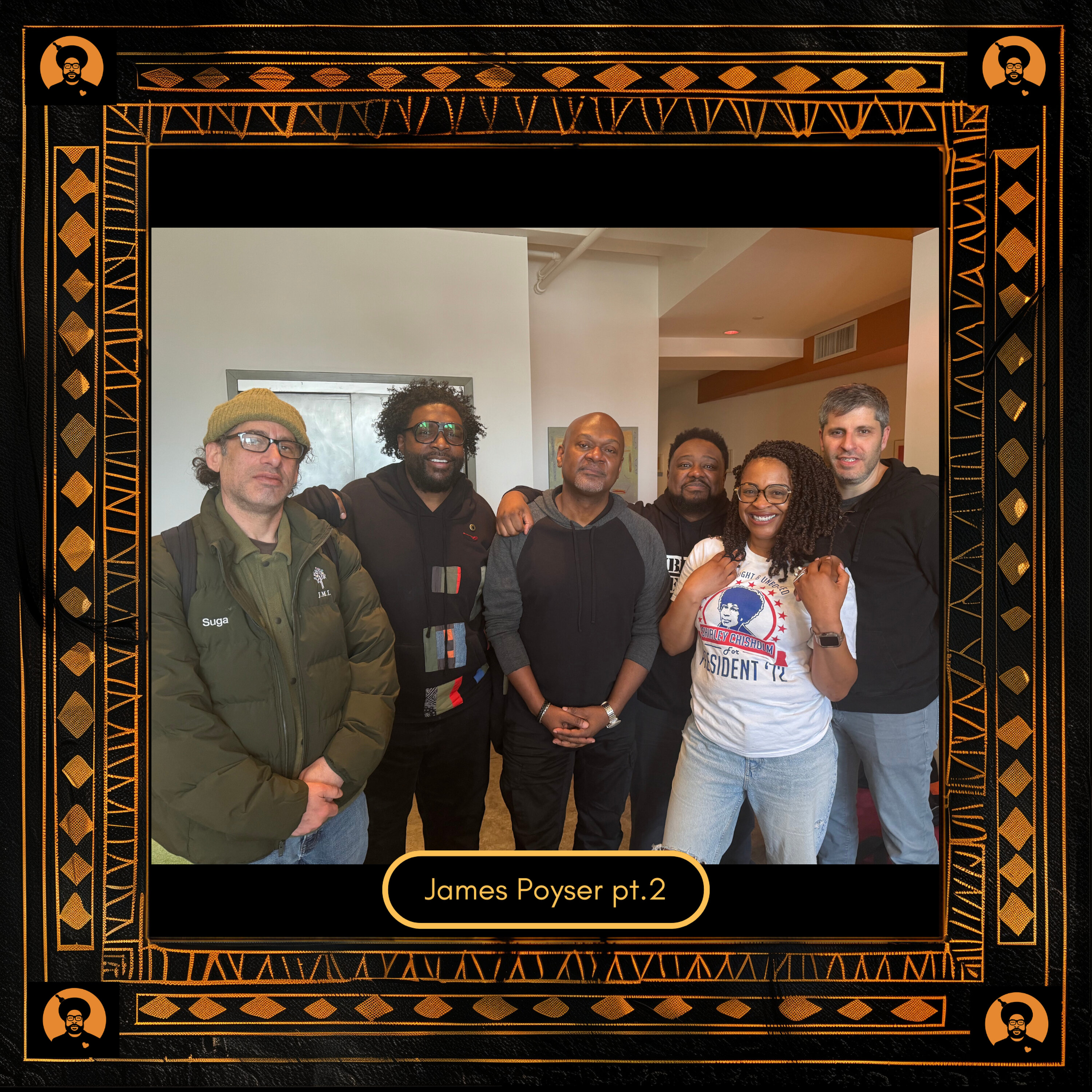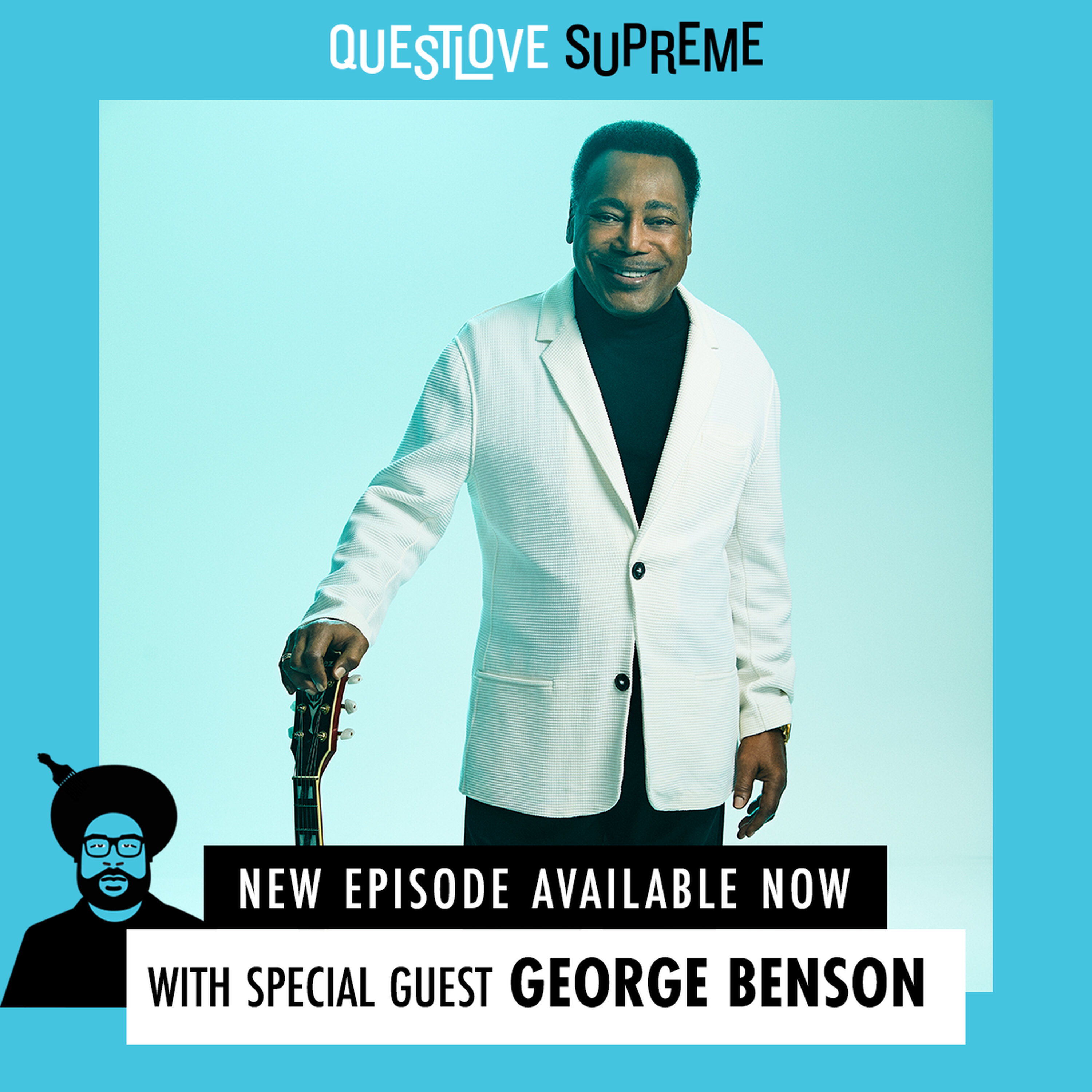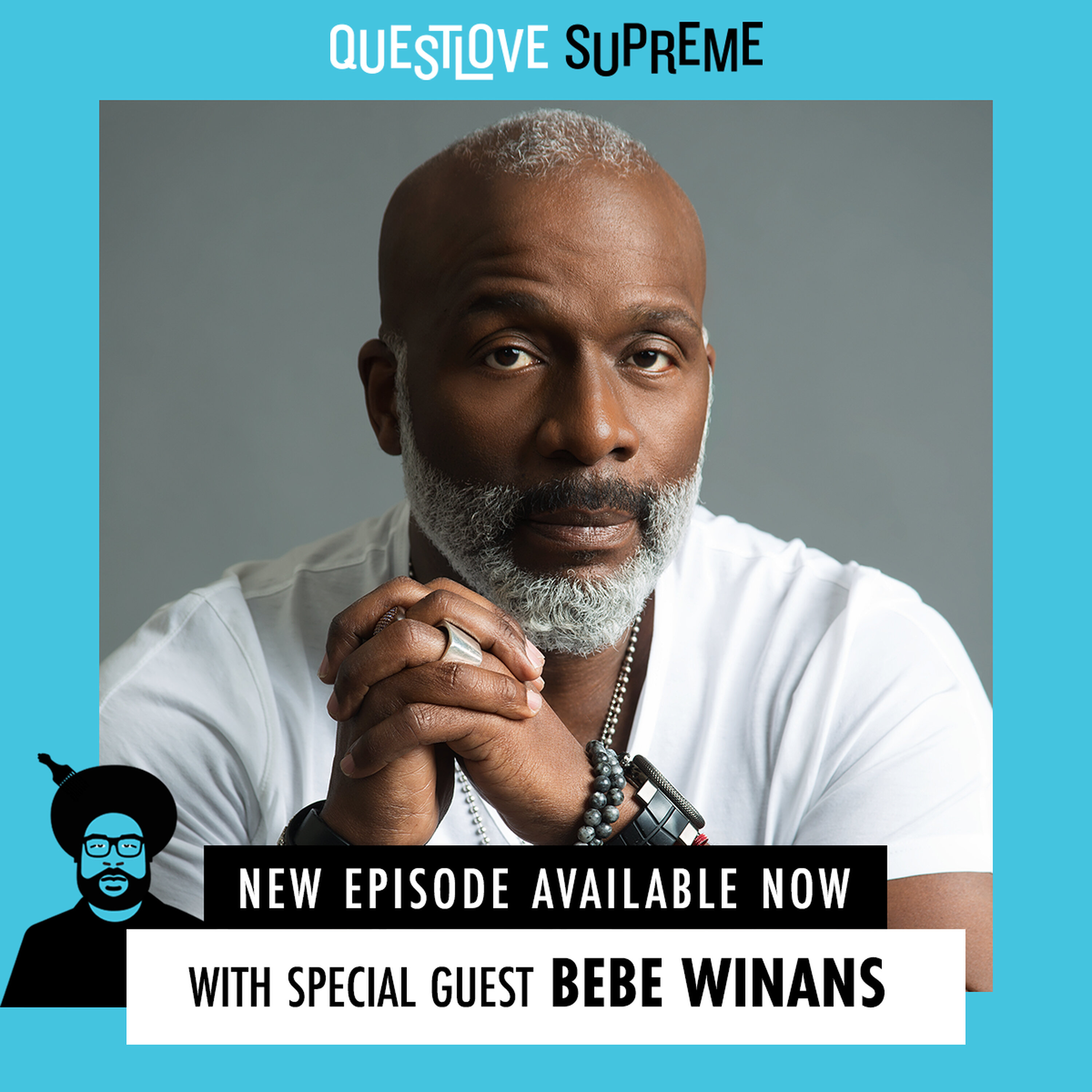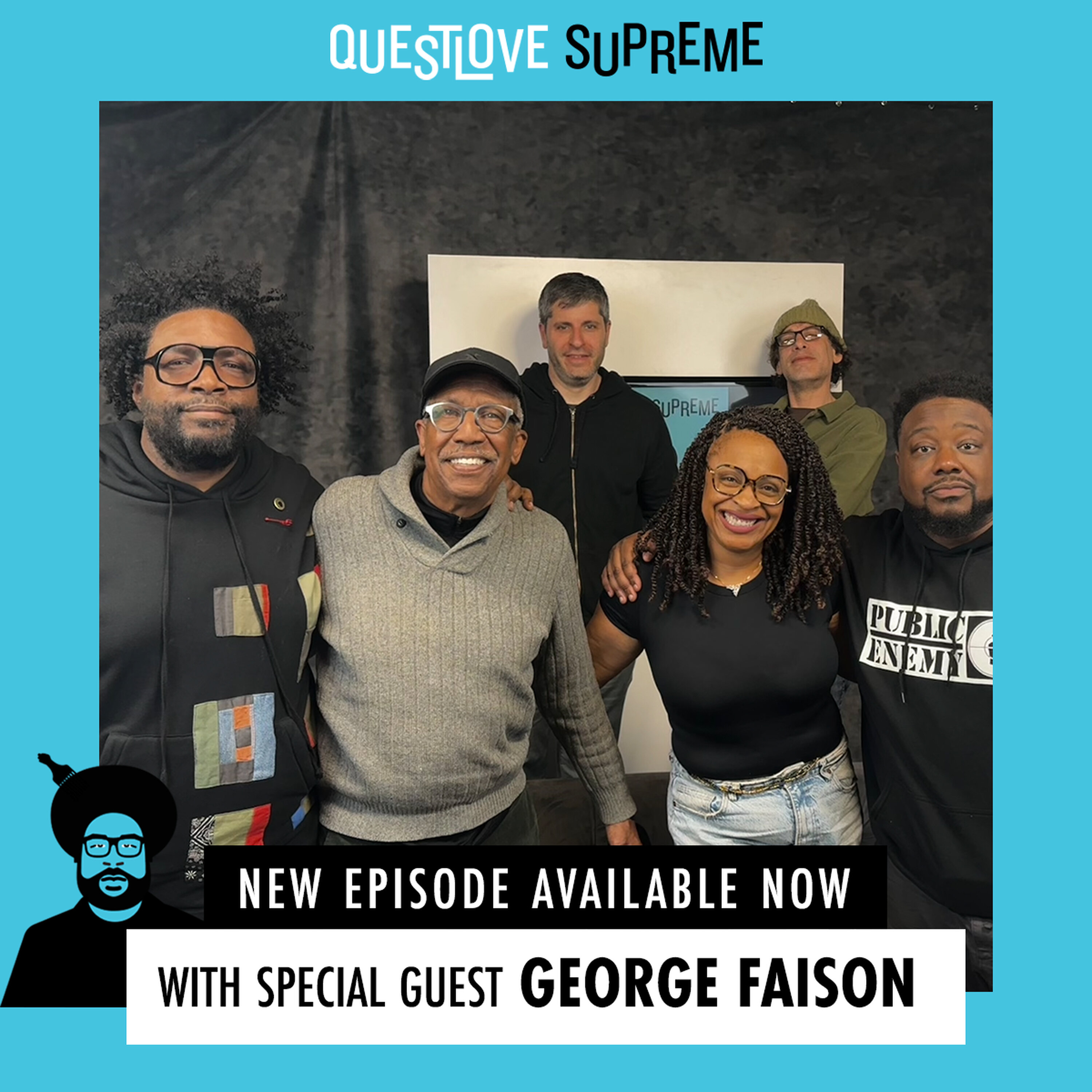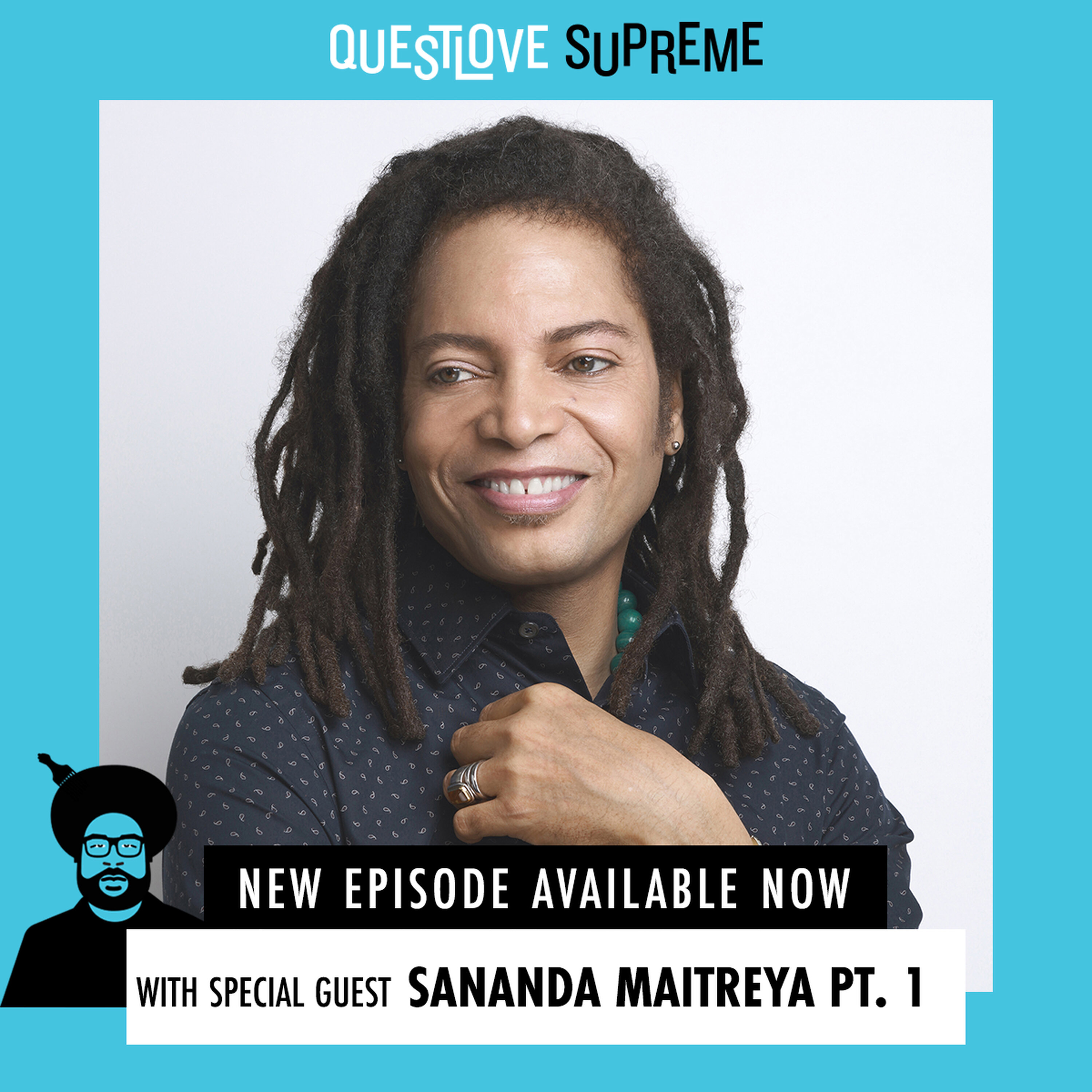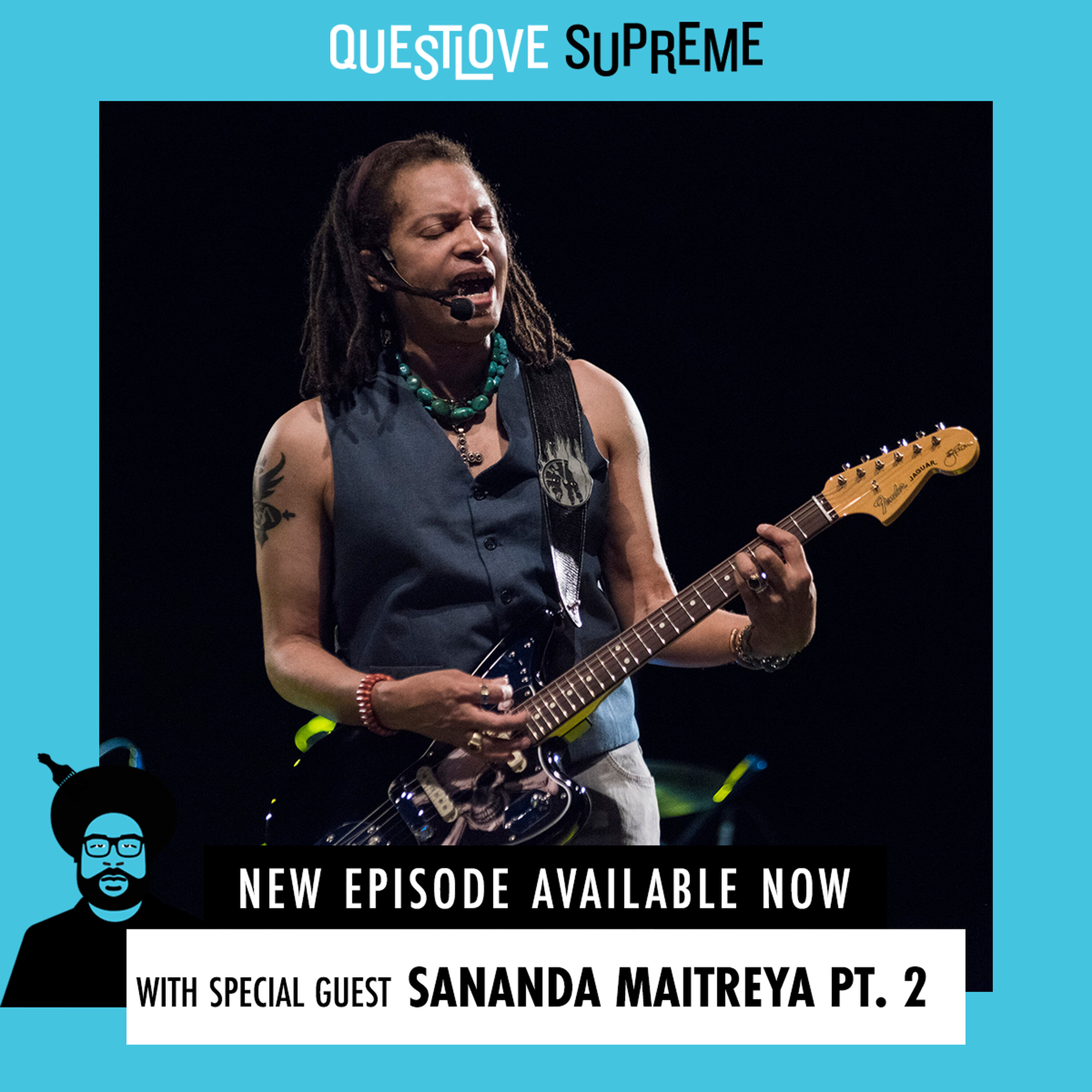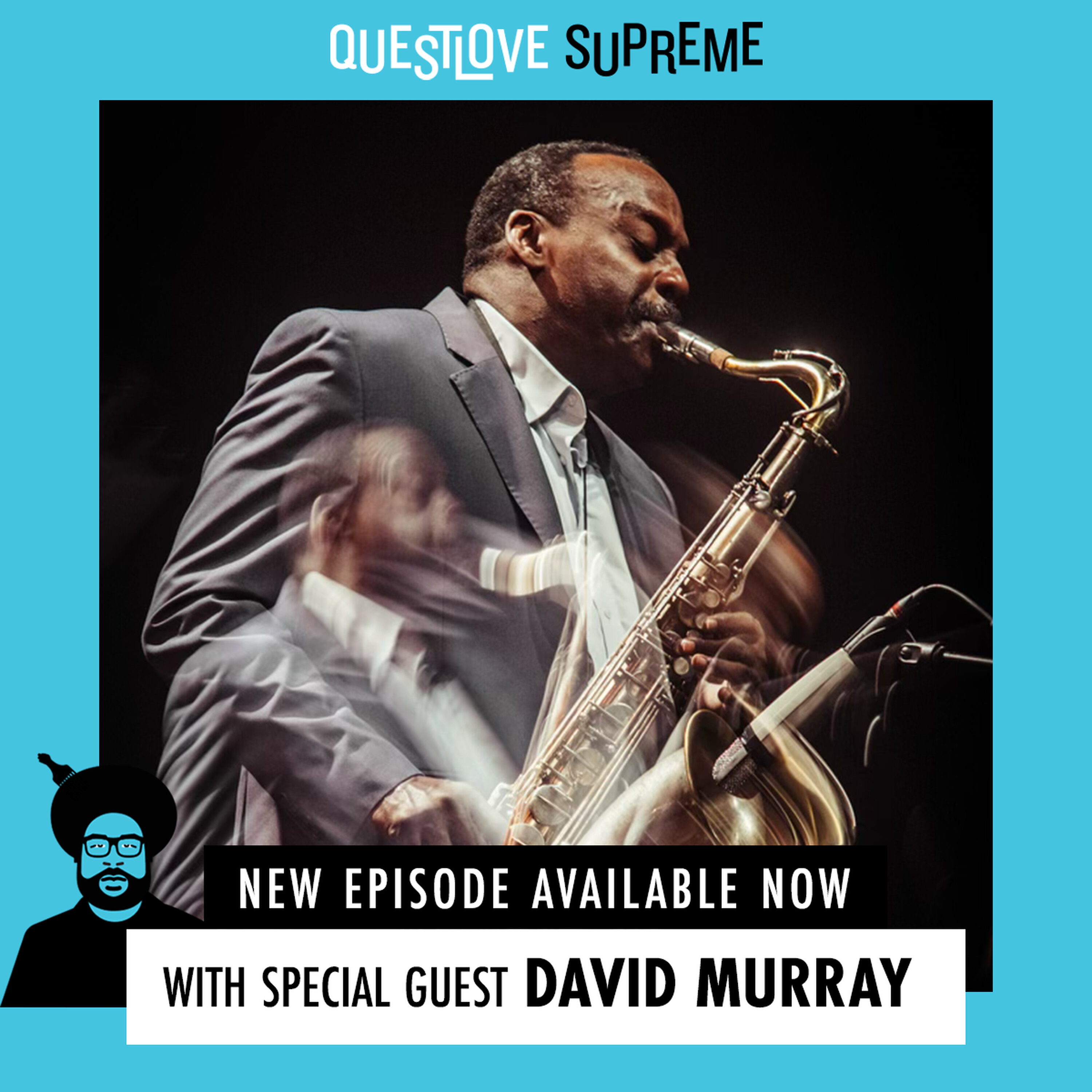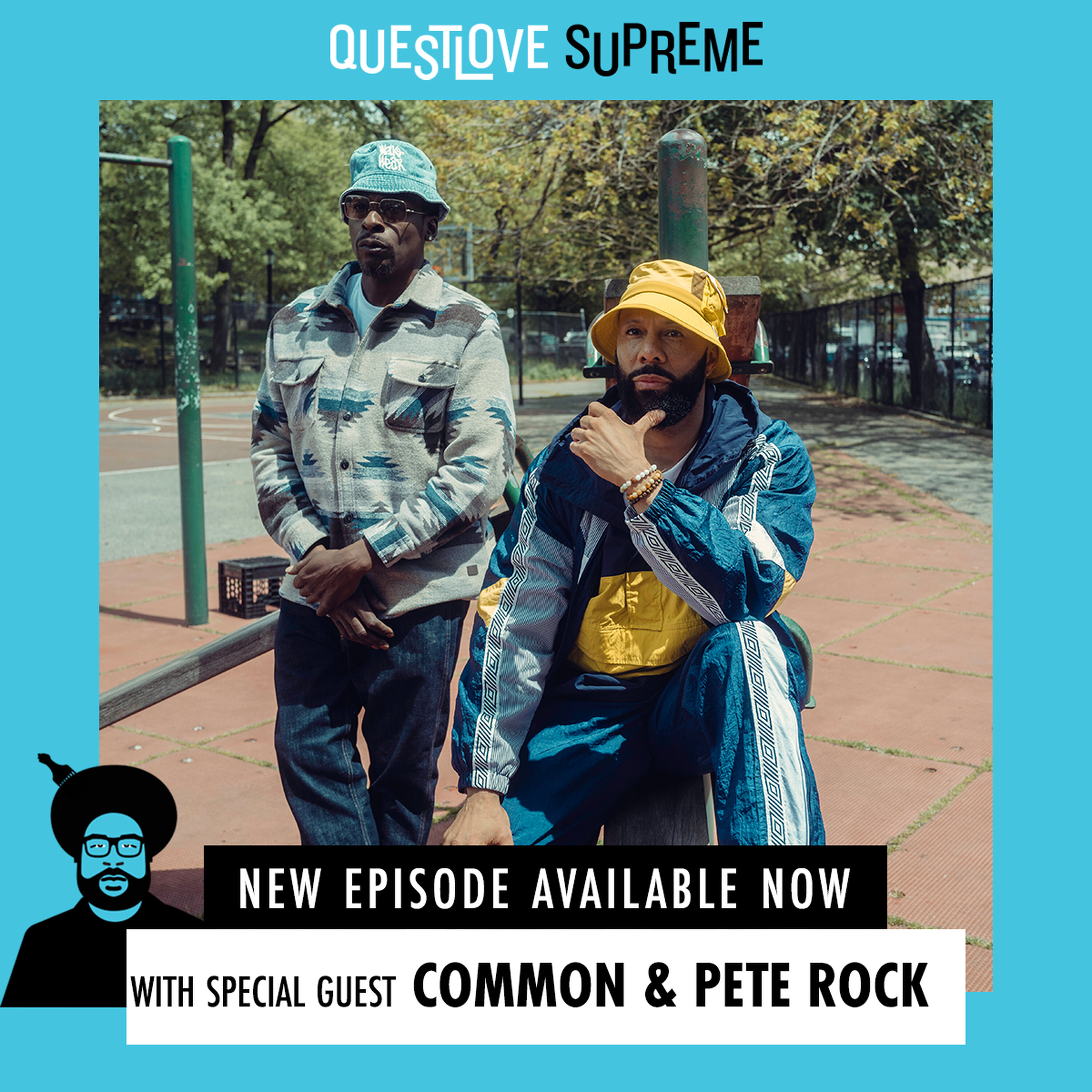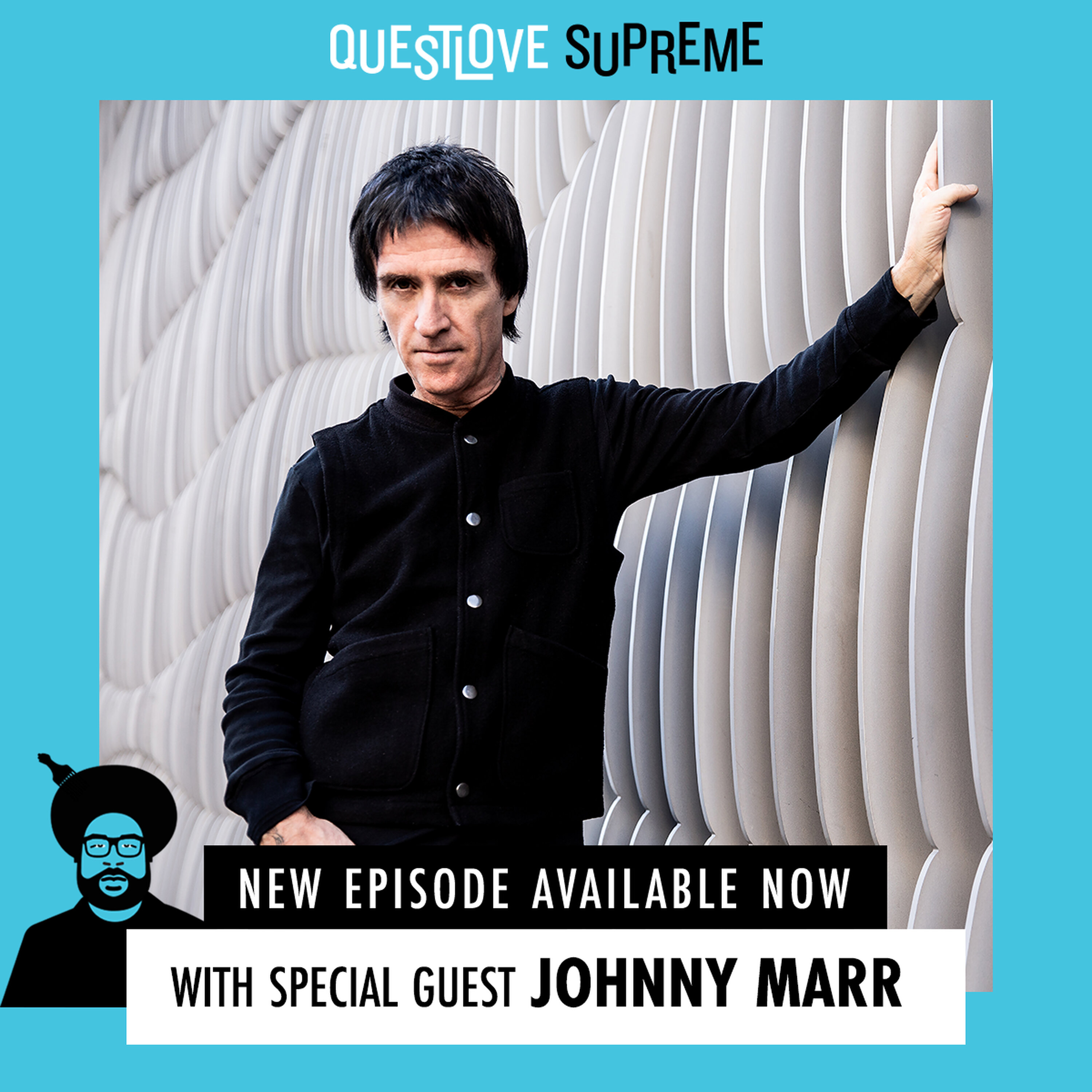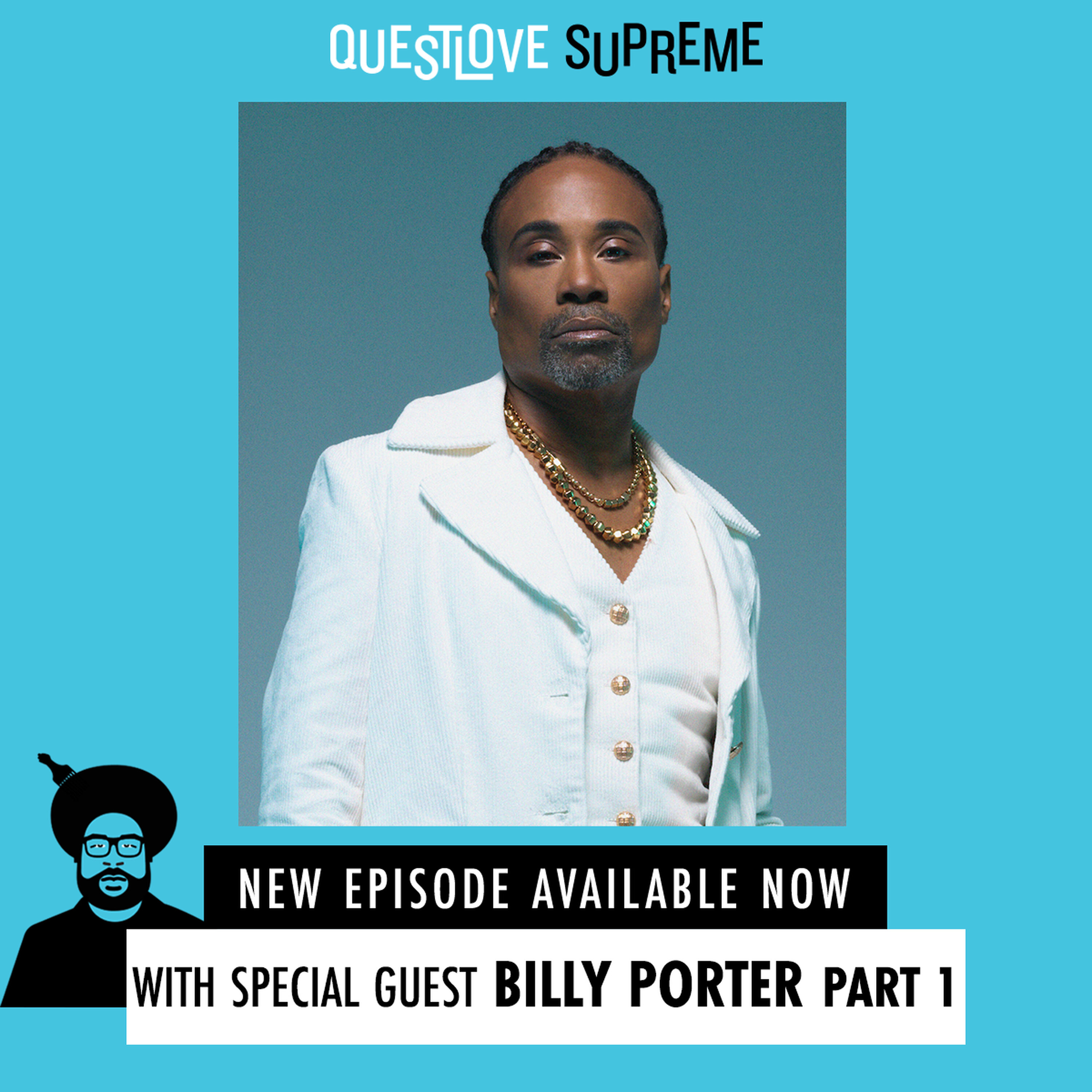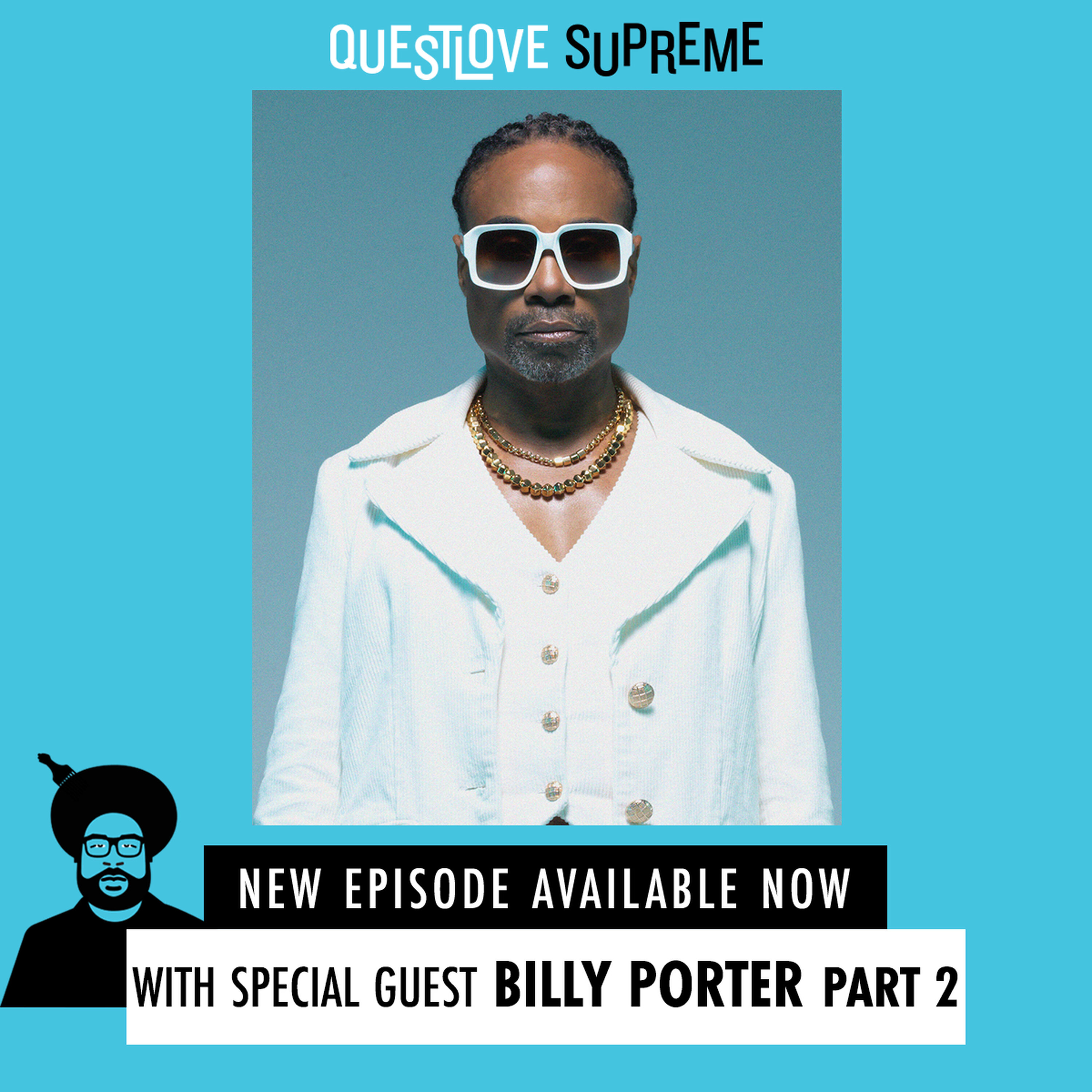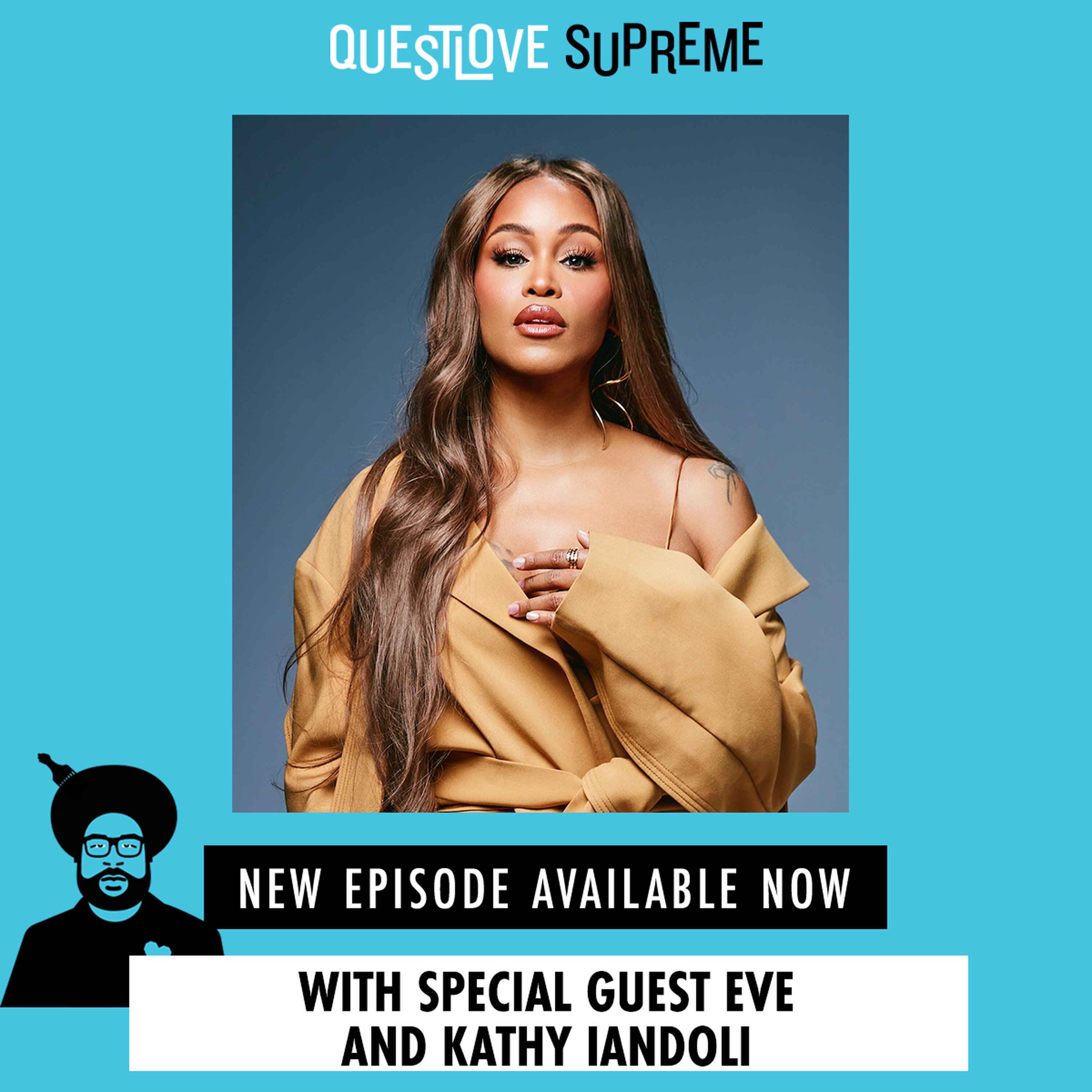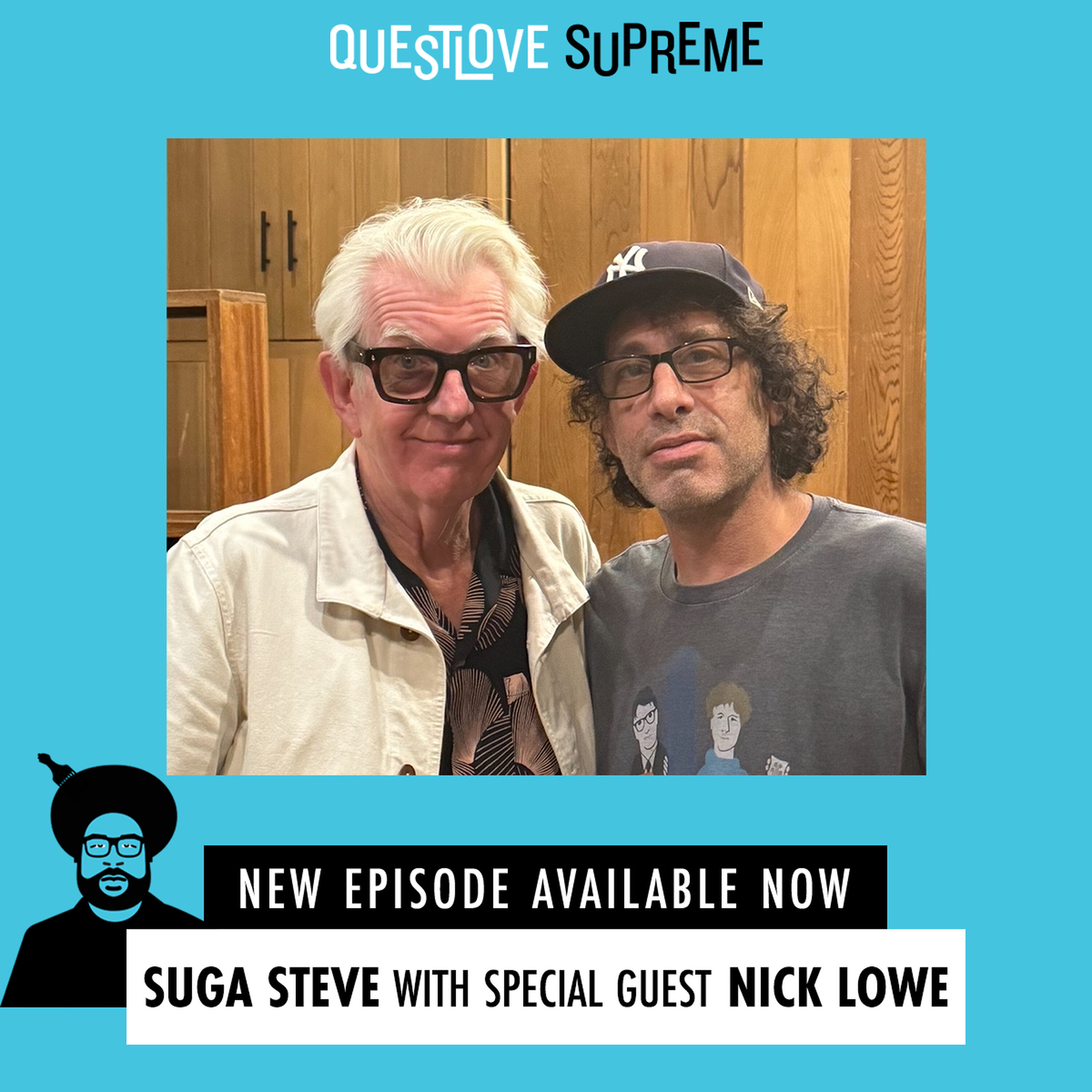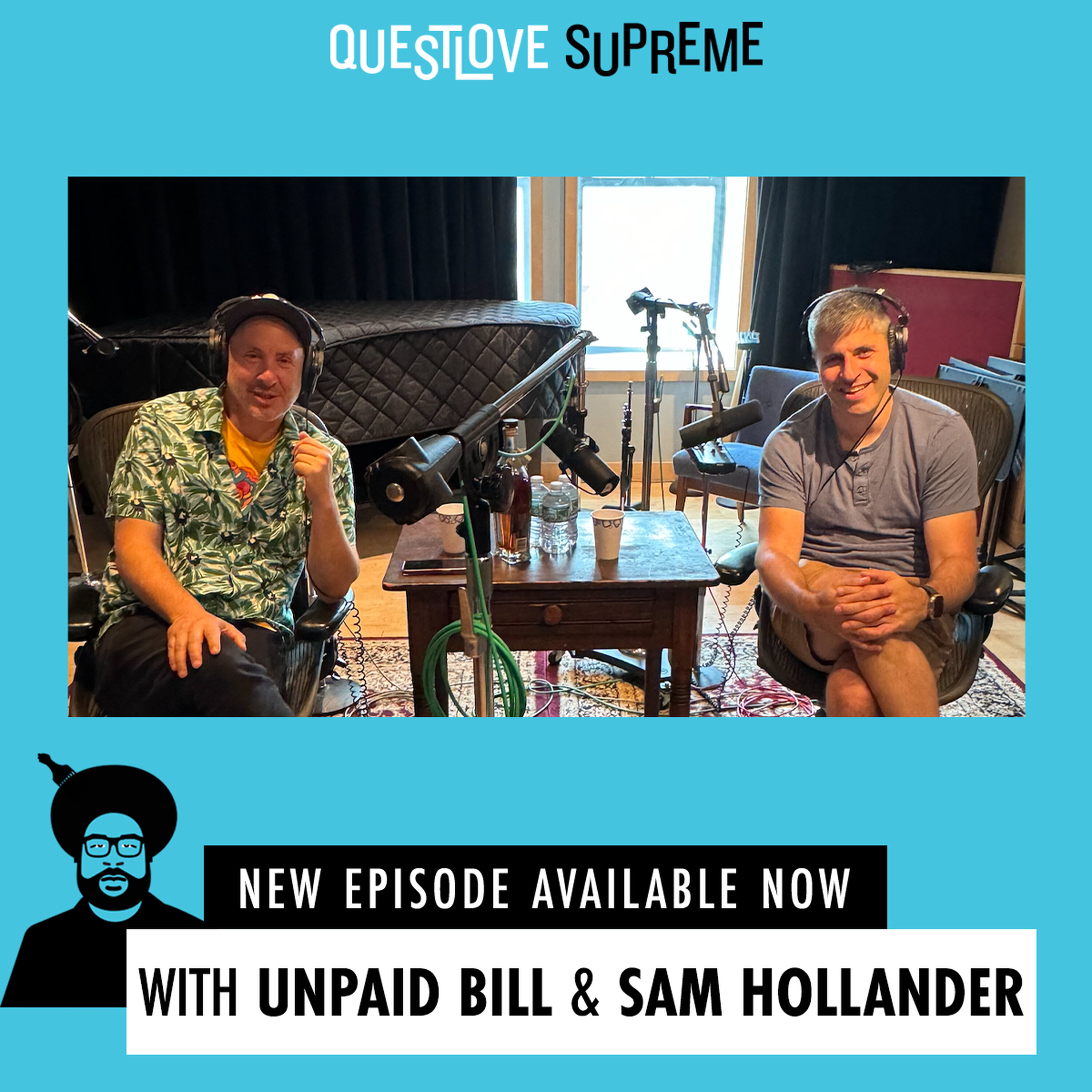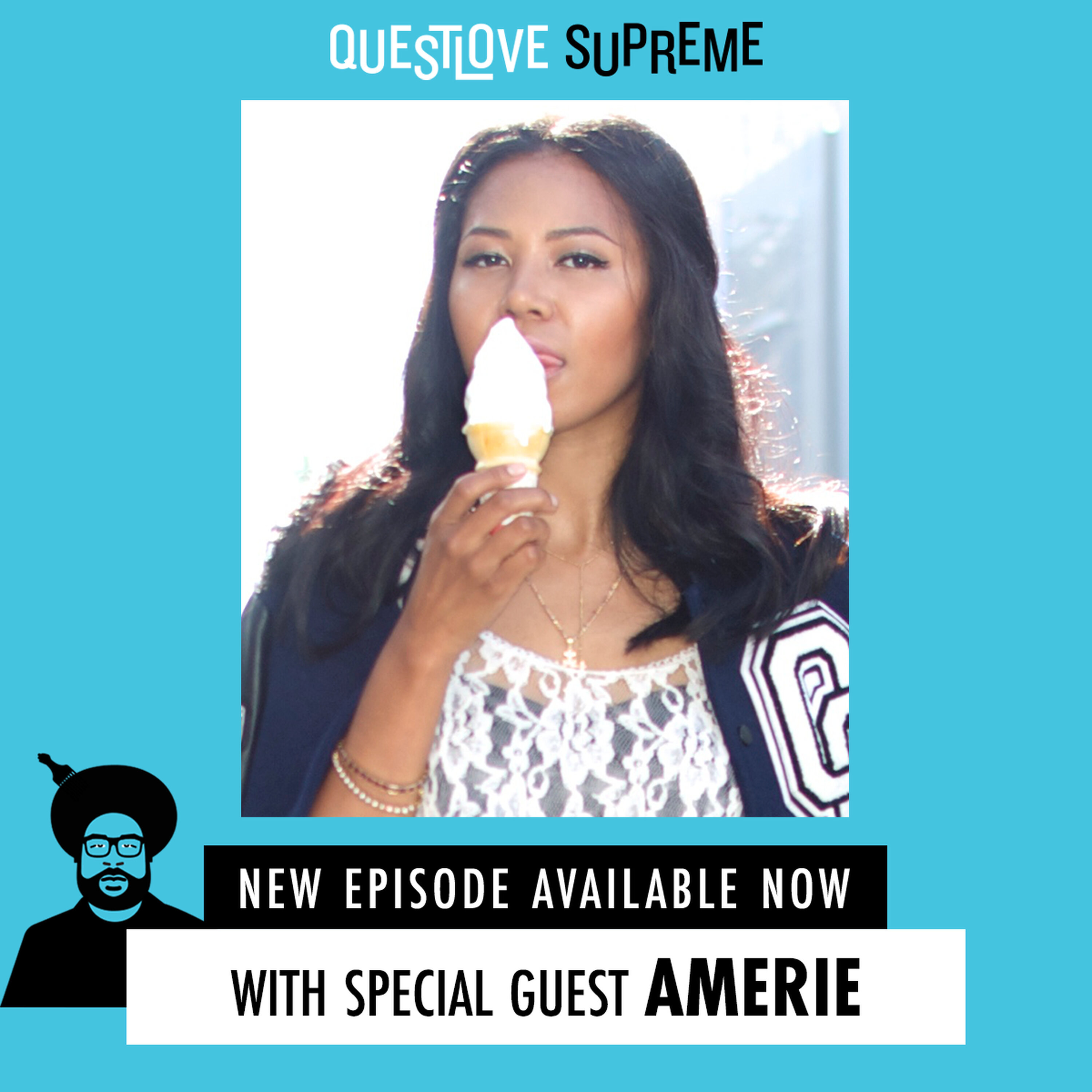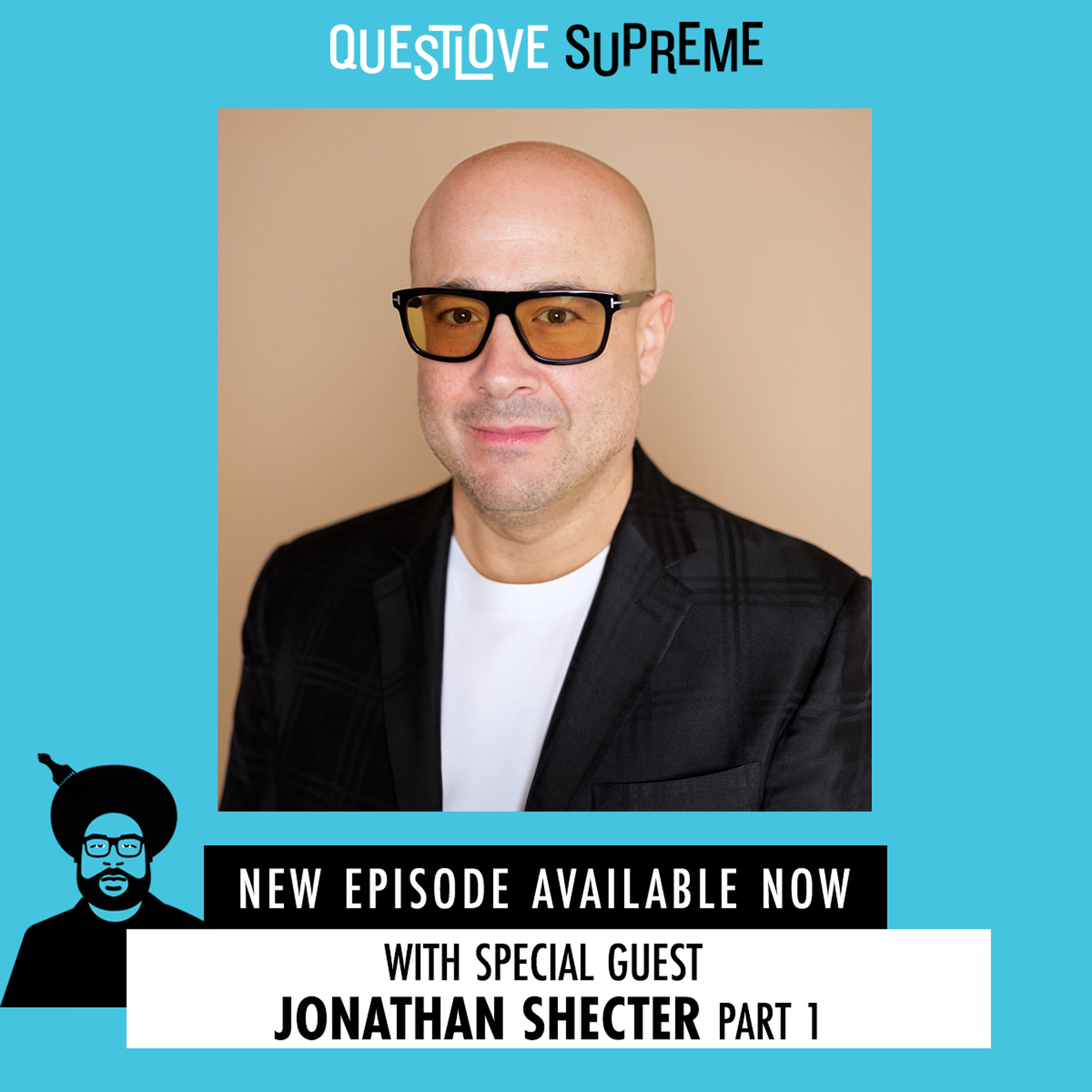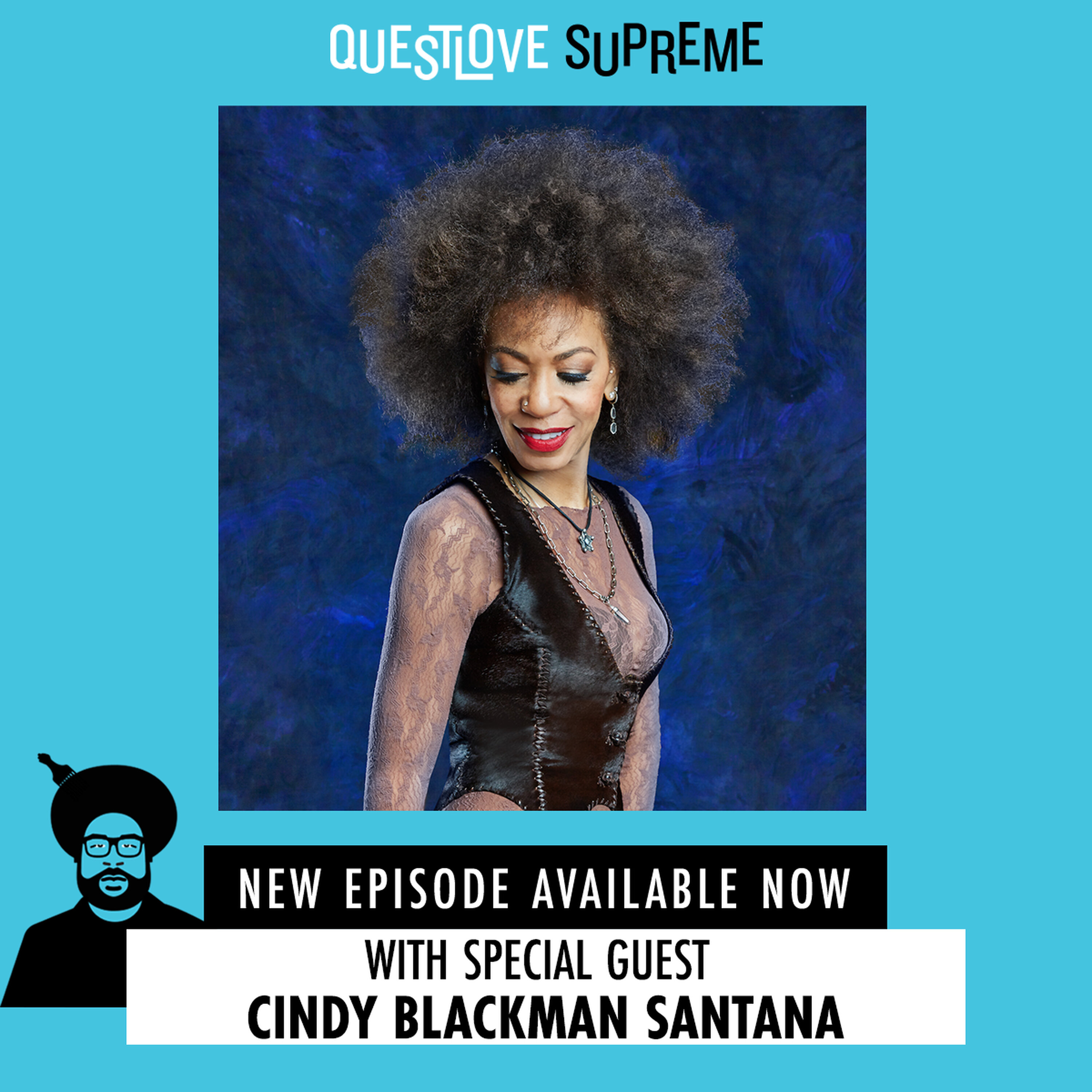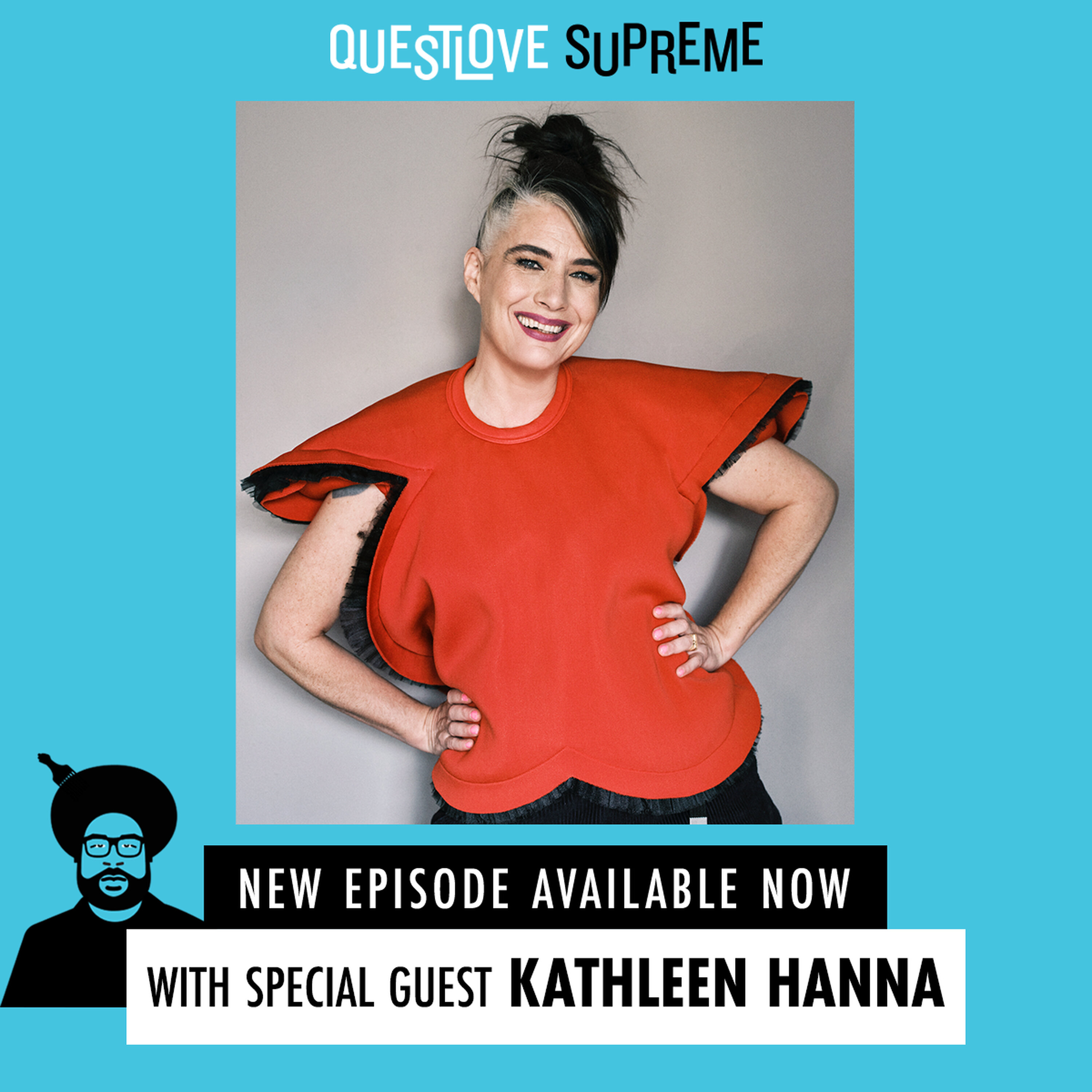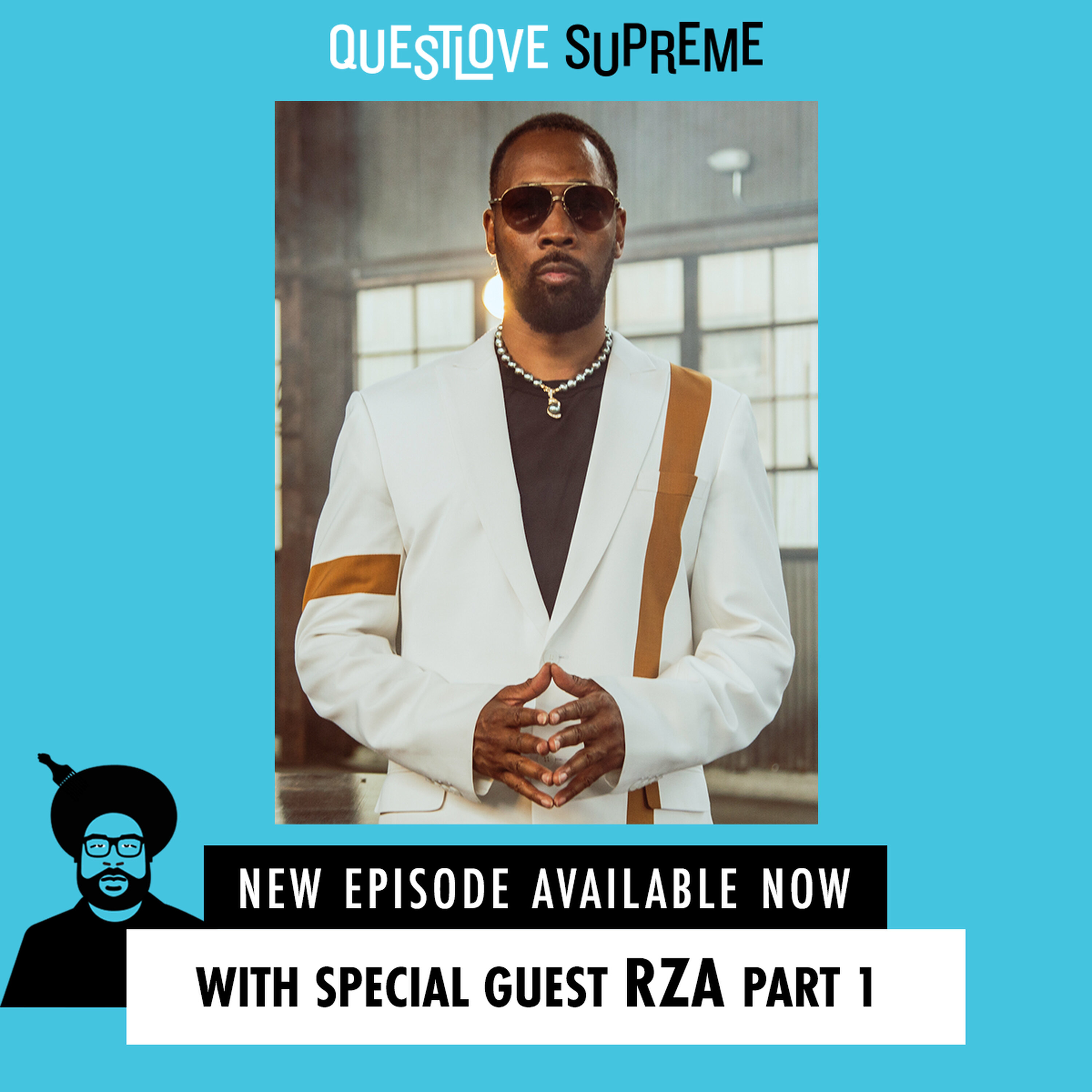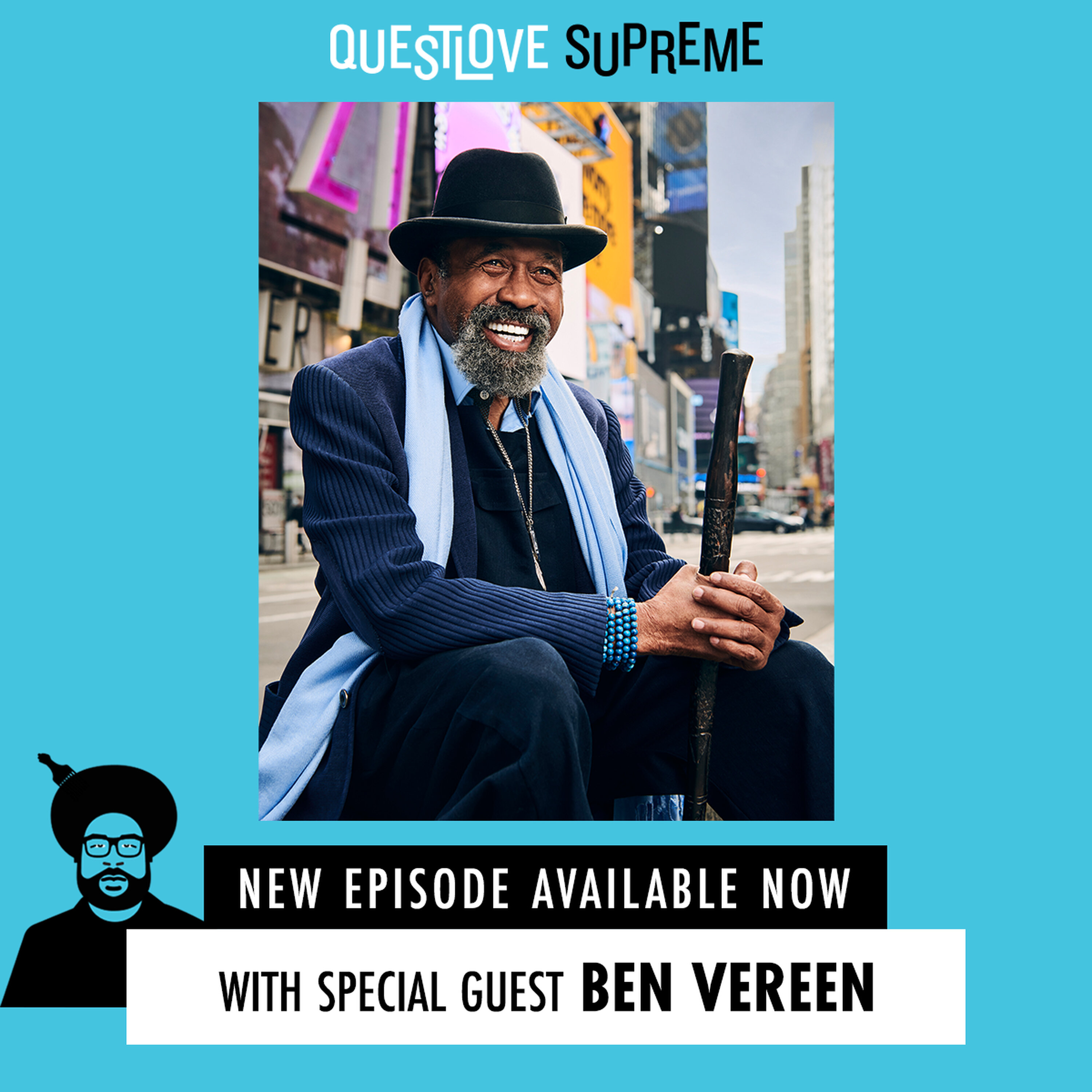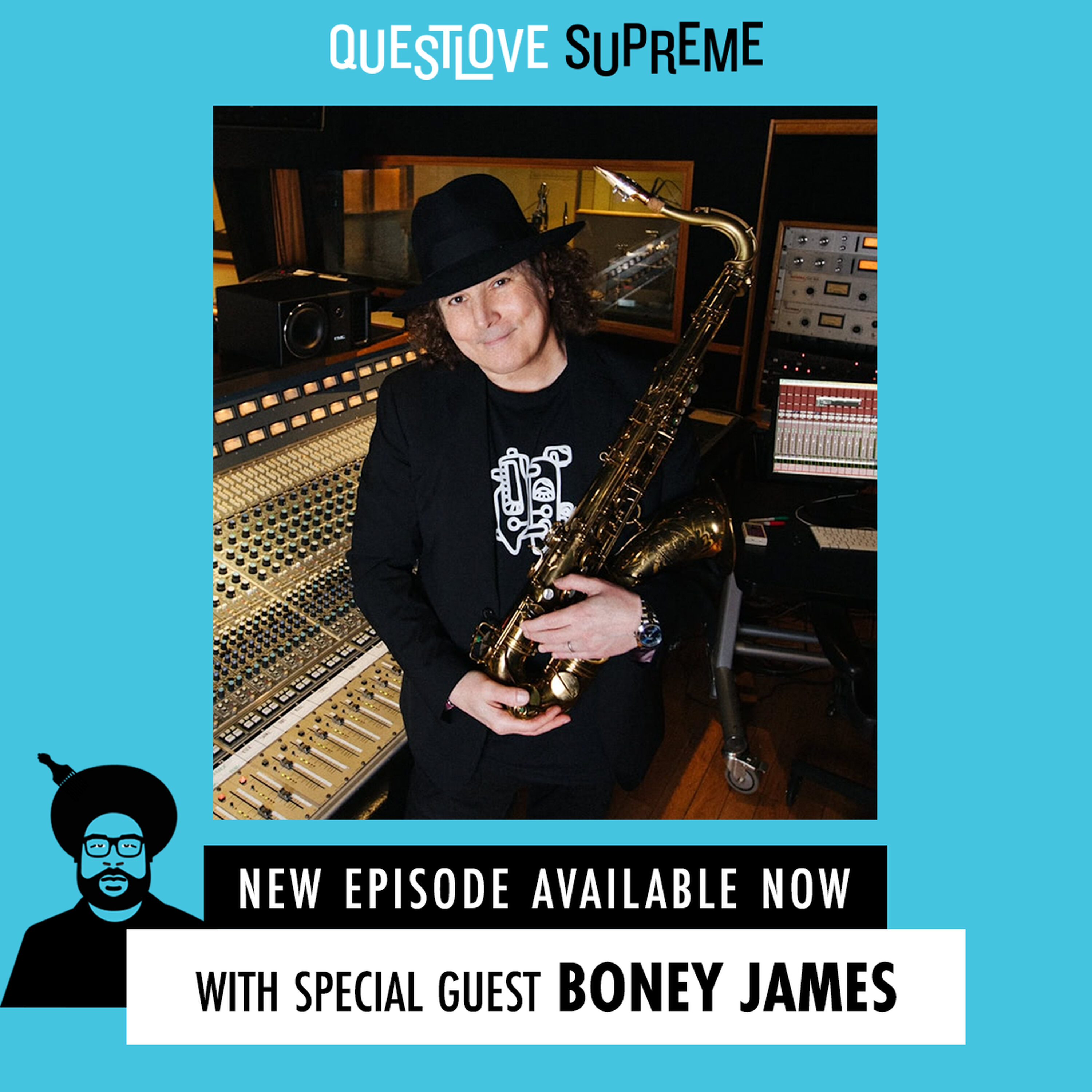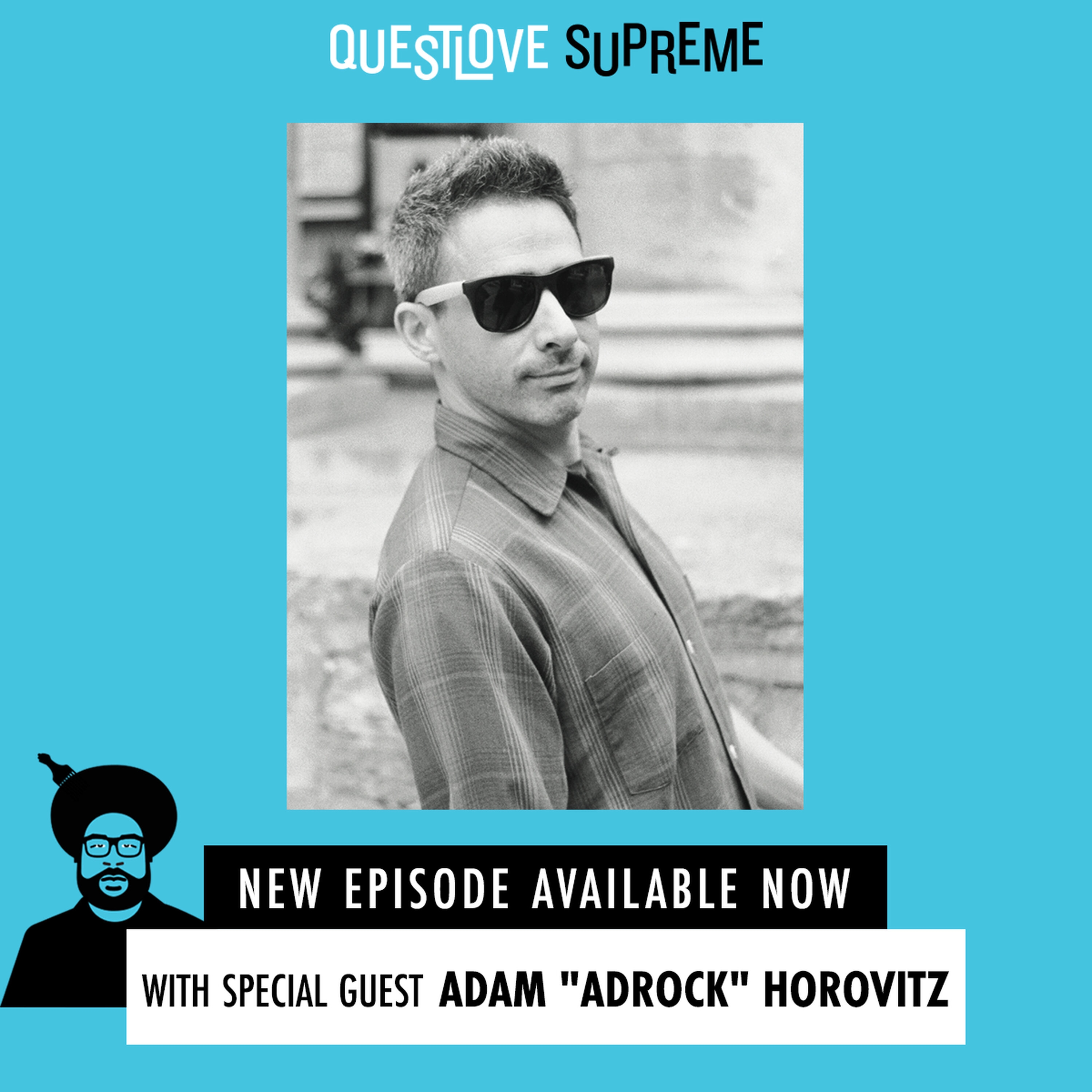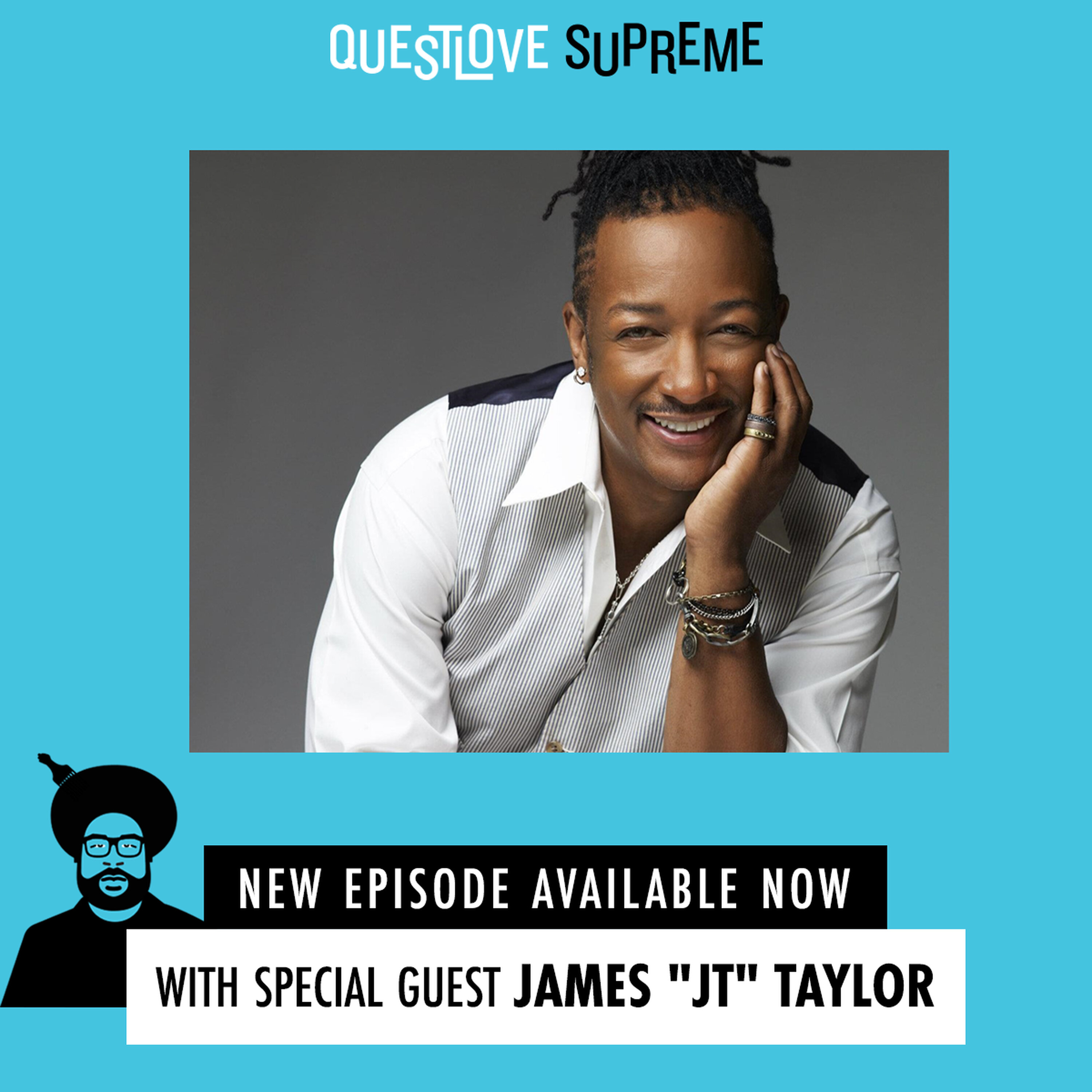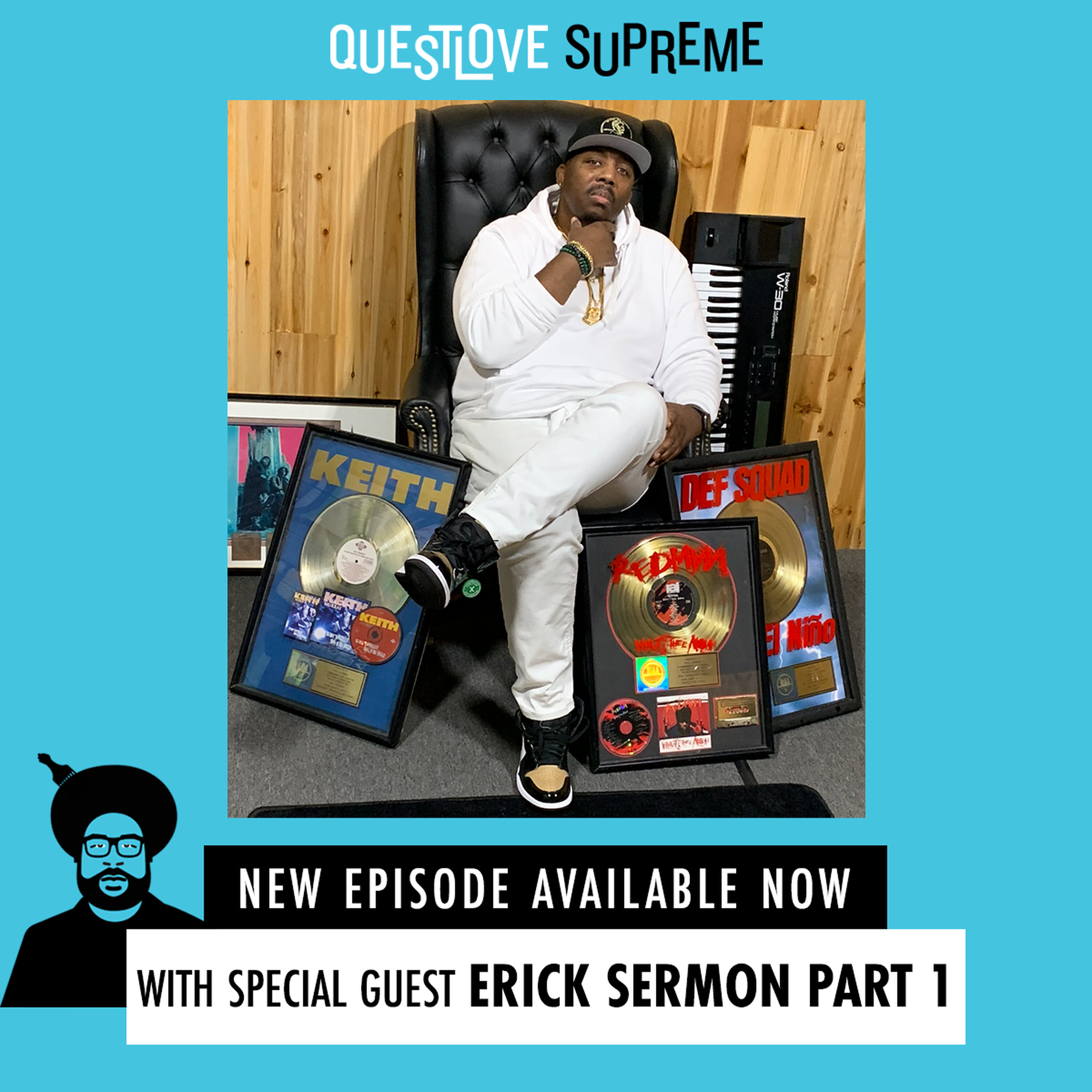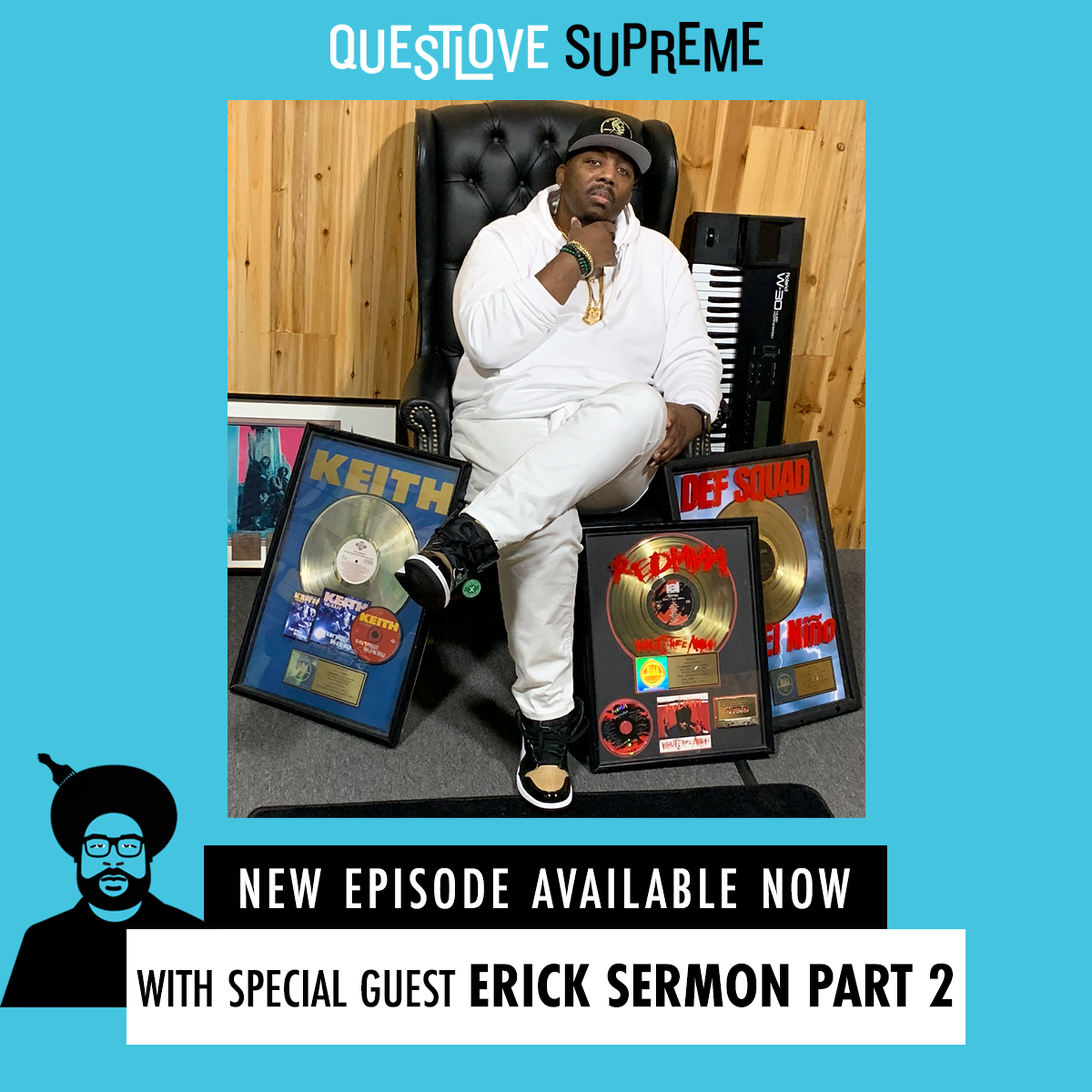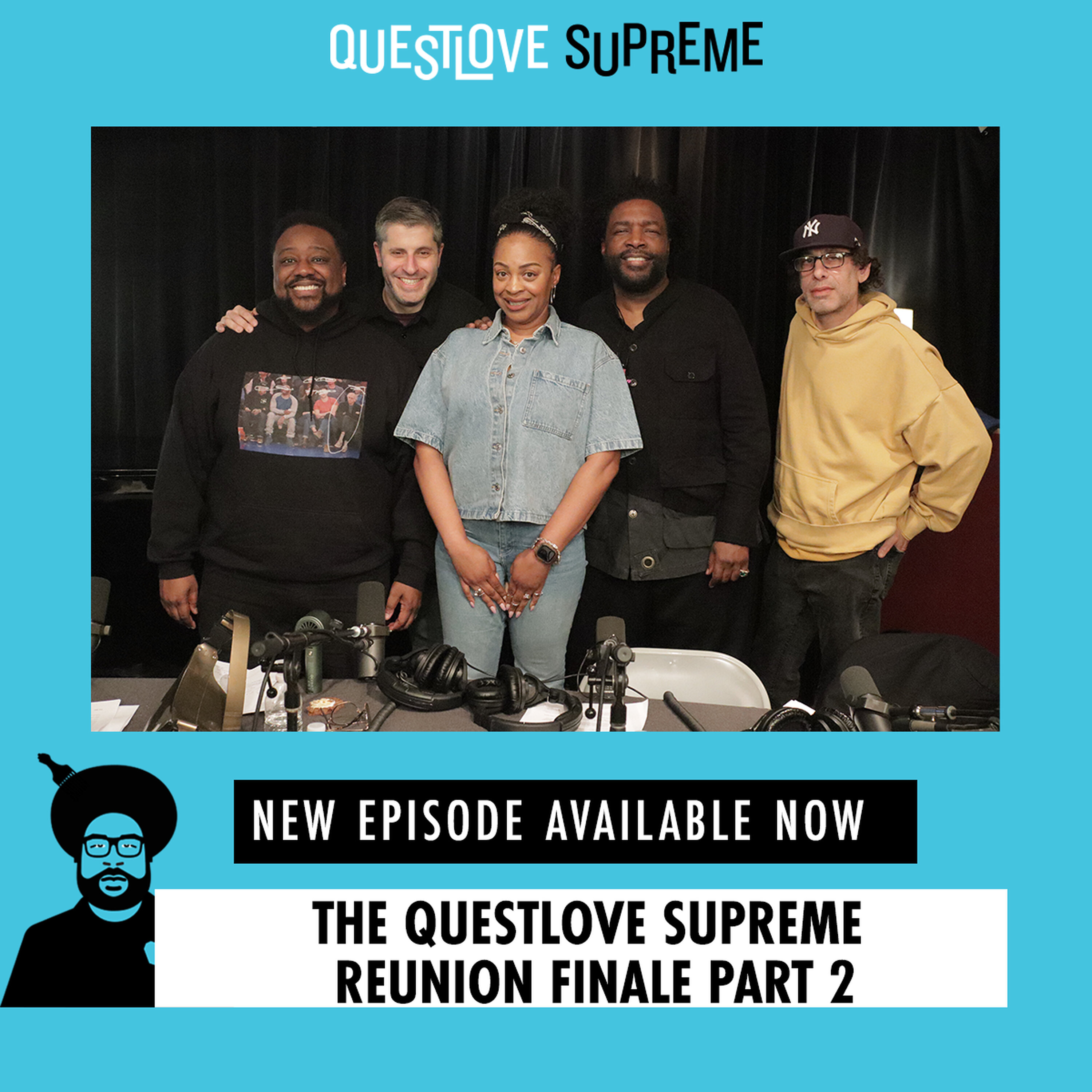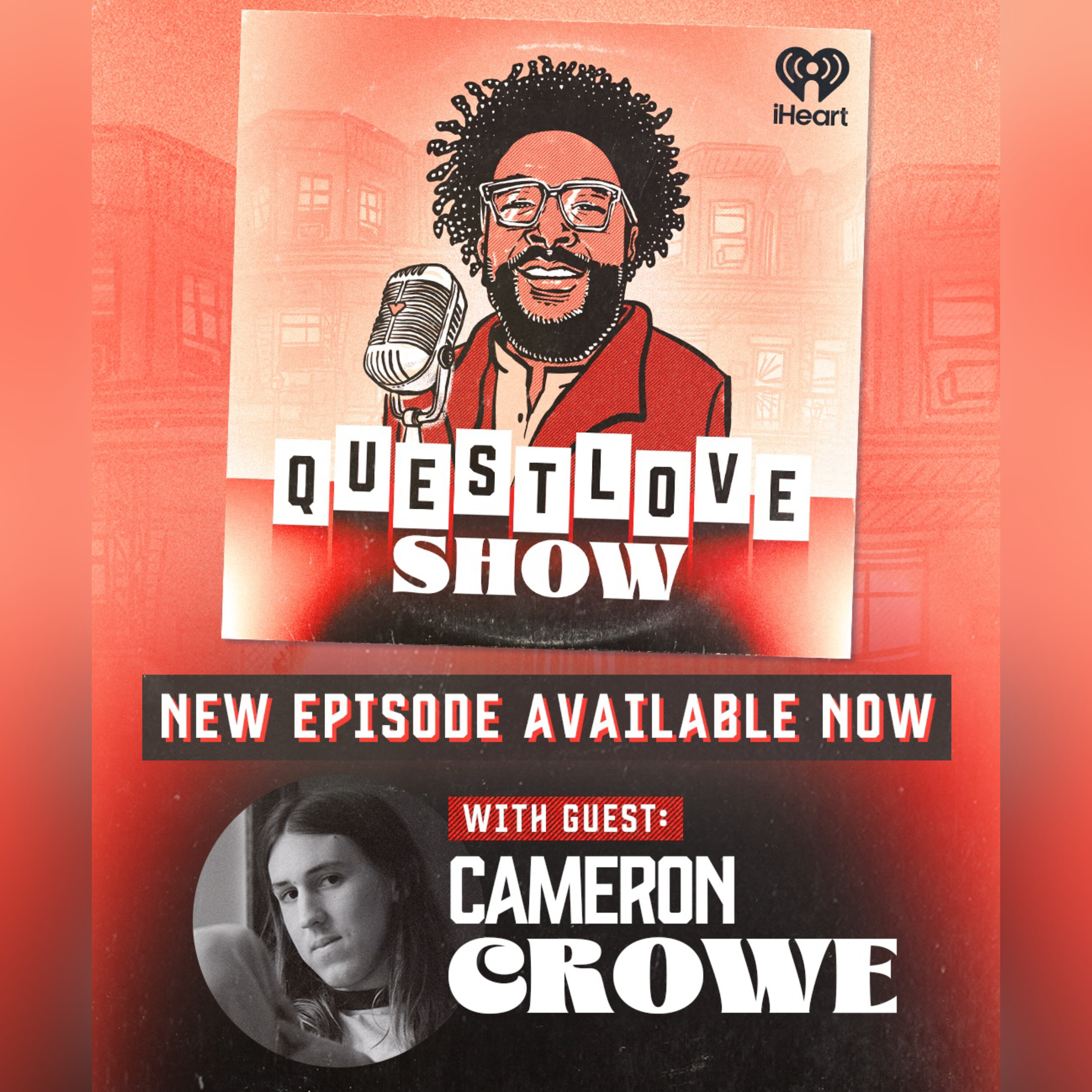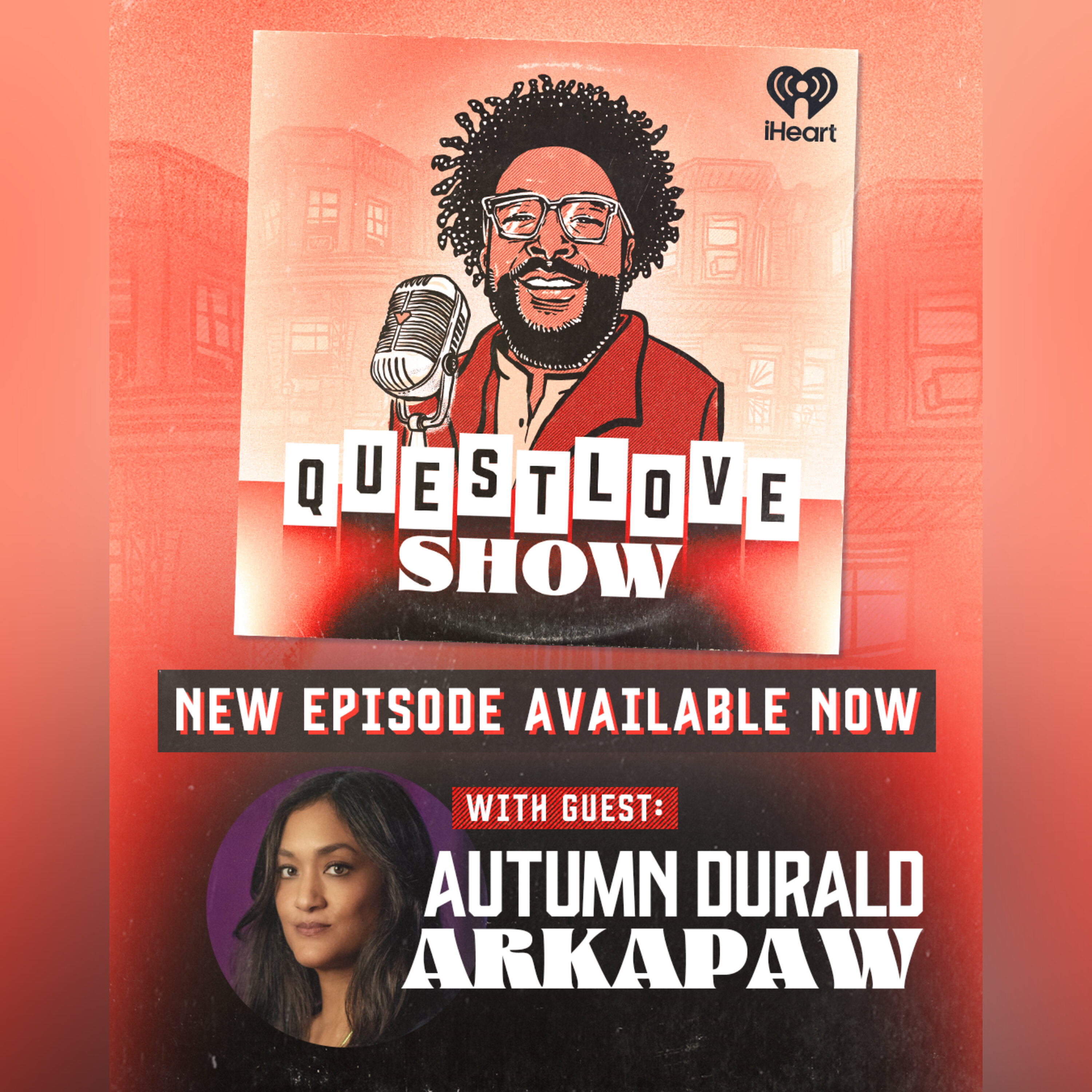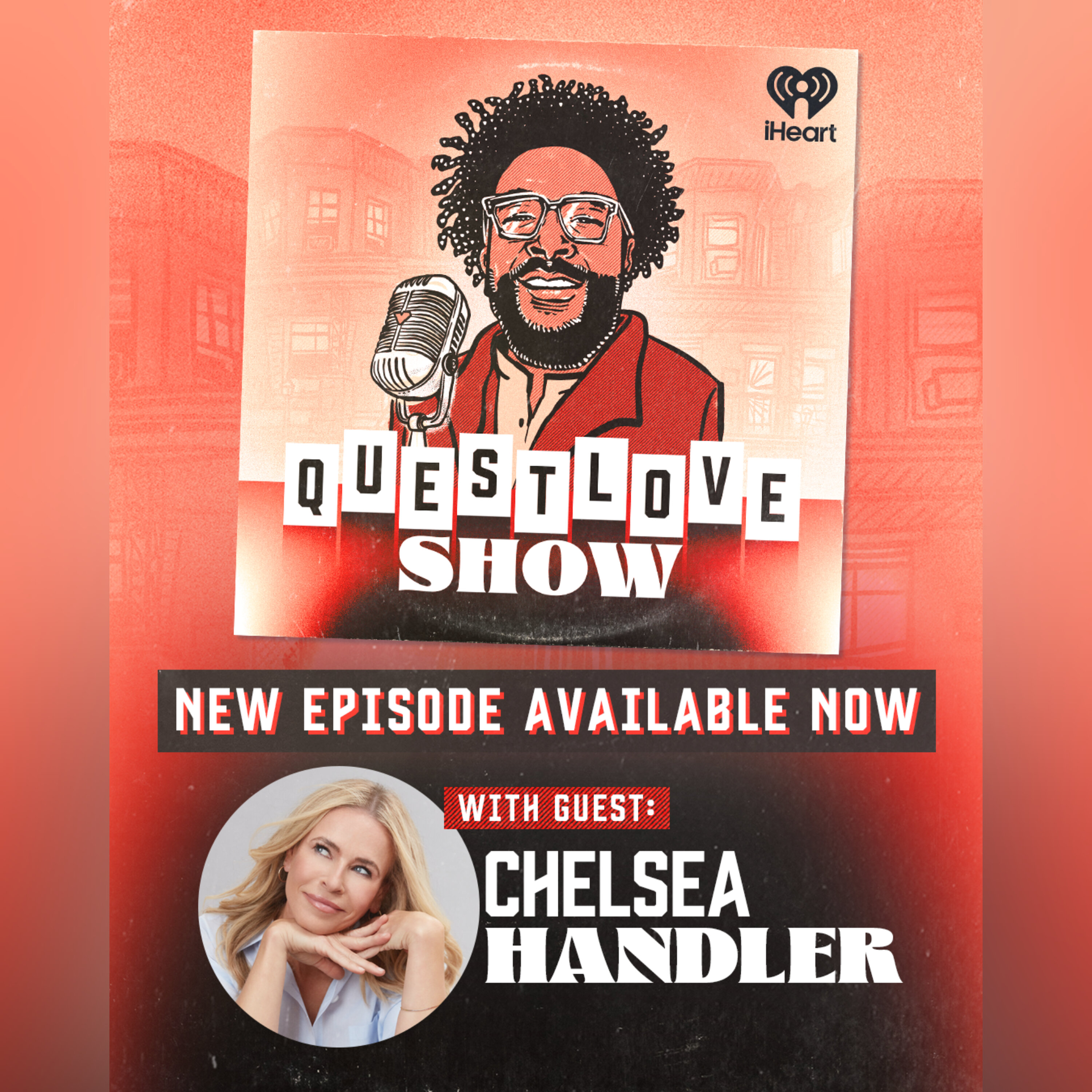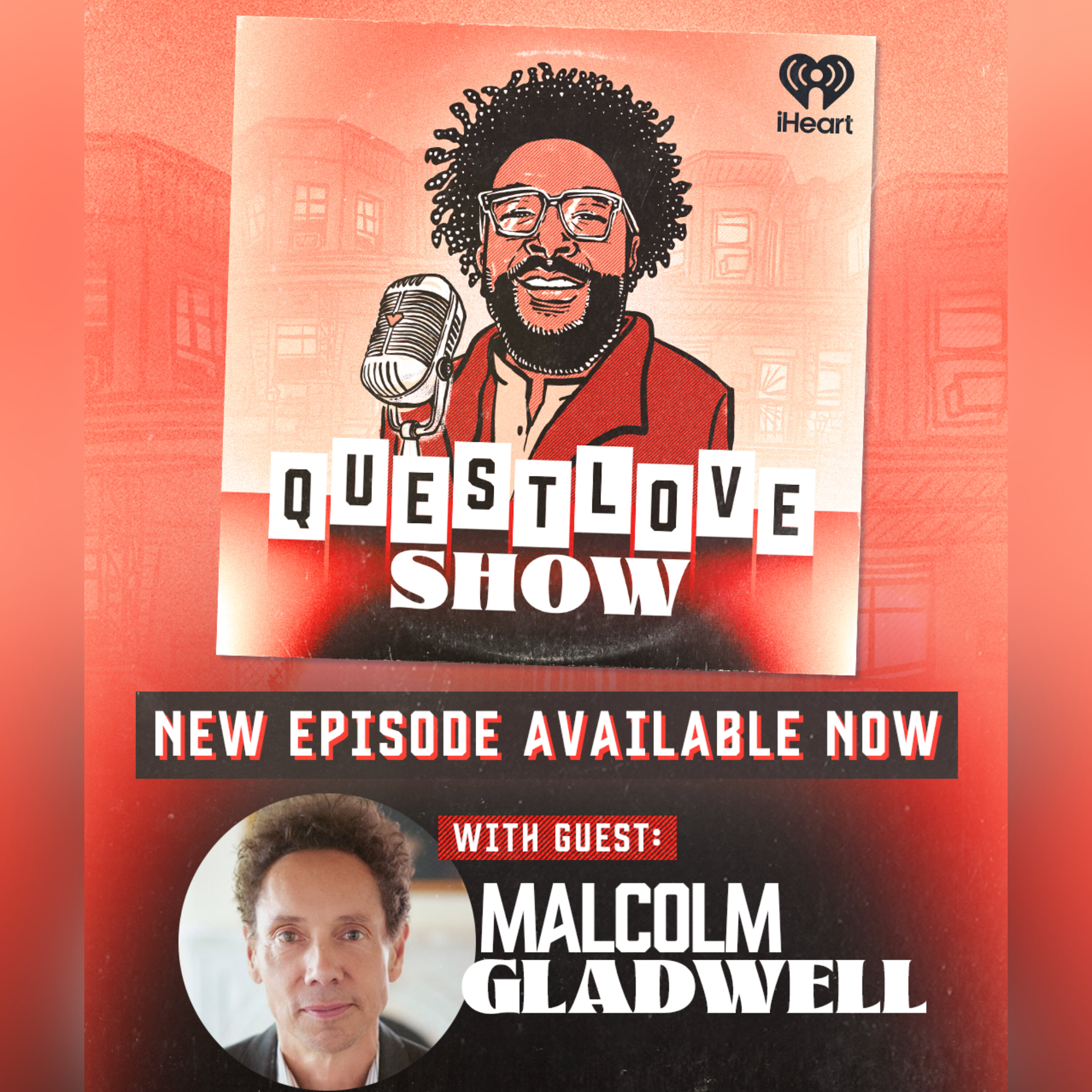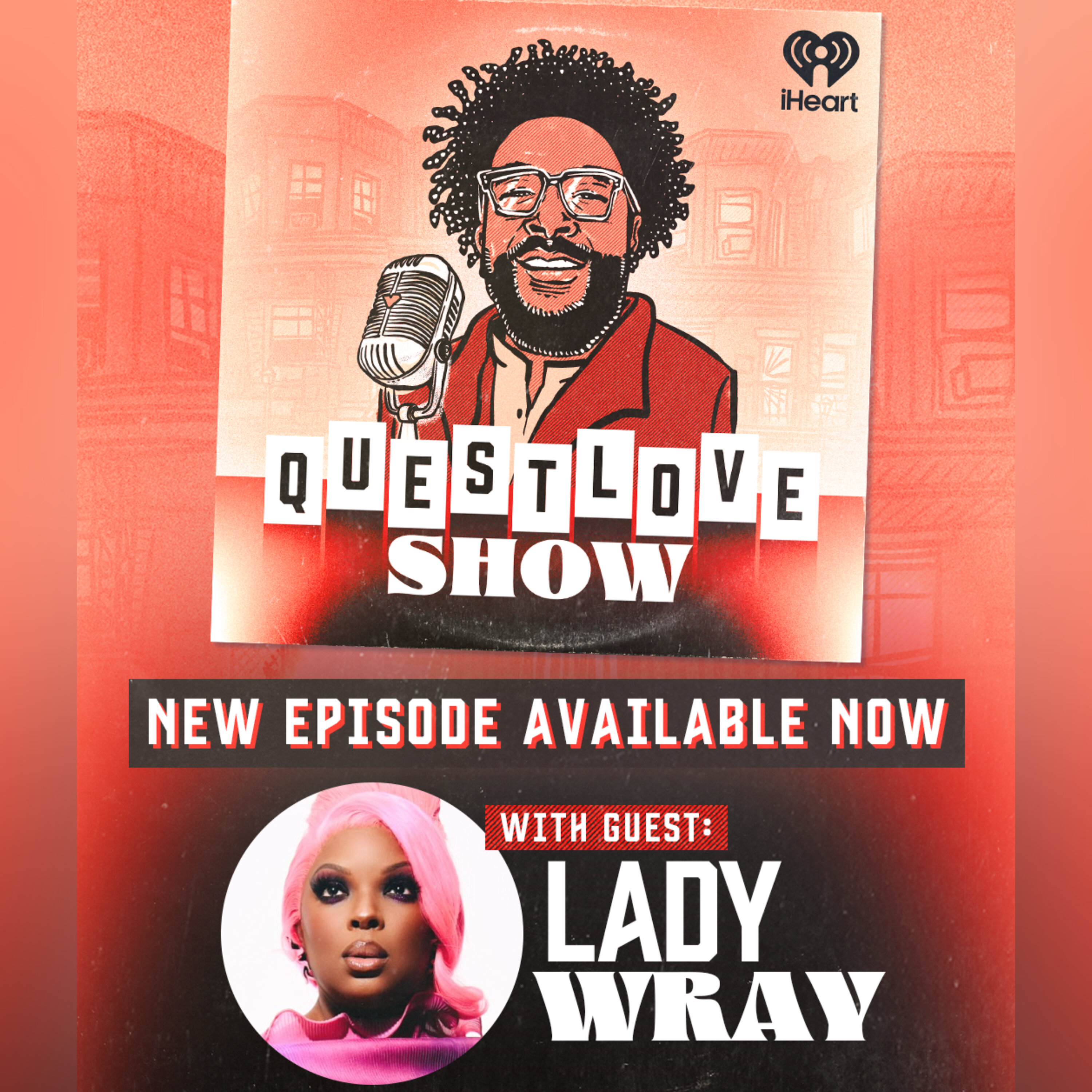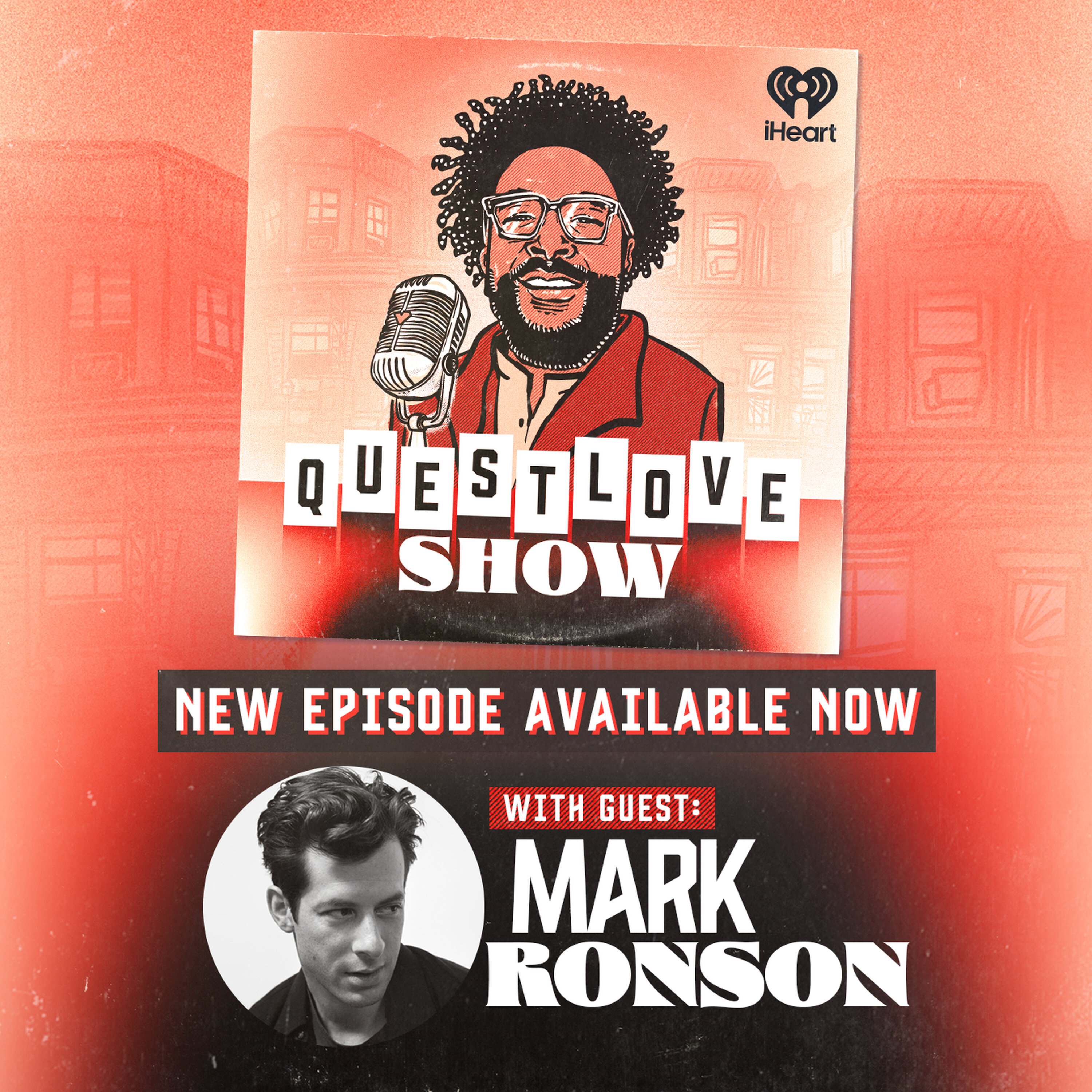Erika Alexander Part 1

Actress Erika Alexander joins Questlove Supreme for a special two-part interview. In the first half, Erika recalls an unusual upbringing that brought her from a childhood in a motel room along Route 66 to the city of Philadelphia. She details making a powerful impact on Camille Cosby to land a part in a beloved sitcom and how that experience prepared her for a definitive role on Living Single. Erika is an incredible storyteller who speaks with heart and draws from experience.
00:00:00
Speaker 1: Quest Love Supreme is a production of iHeartRadio.
00:00:04
Speaker 2: We're rolling.
00:00:07
Speaker 1: Let's go up.
00:00:08
Speaker 2: Primo se se Primo Robo came up.
00:00:12
Speaker 3: Primo, so so sel Primo Roll Call, Supremo Supremo roll called.
00:00:20
Speaker 1: So prim So Primo. It is Quest Love. Yeah, aren't you glad?
00:00:27
Speaker 4: Yeah?
00:00:28
Speaker 1: Ronald timmis here. Why he's gonna get mad Upremo Road Call, Prima Supremo Road. My name is Spante, Yeah, that's who I am. Yeah, letting you know. I too have a cousin named Pama.
00:00:50
Speaker 4: Supremo Road Come Supremo Supremo roll Call.
00:00:55
Speaker 1: My name is Sugar.
00:00:57
Speaker 3: Yeah.
00:00:57
Speaker 5: And this is my phone.
00:00:59
Speaker 2: Yeah.
00:00:59
Speaker 5: And if you're still living single, yeah, I live alone.
00:01:04
Speaker 4: Supremo Rod Suprema Sou soun Supremo Road.
00:01:11
Speaker 6: I'm on paid bill.
00:01:13
Speaker 1: Yeah, now take it easy.
00:01:15
Speaker 7: Yeah.
00:01:15
Speaker 6: Might have drank, Yeah, a few martinis.
00:01:20
Speaker 1: Suprema So you turn Erica Sprea Road.
00:01:29
Speaker 8: Yeah.
00:01:29
Speaker 9: And let's talk style Yeah. TV couples. Yeah, it's Max and Kyle.
00:01:37
Speaker 4: Supremo roll Suprema your Supremo role.
00:01:43
Speaker 2: My name is Erica.
00:01:45
Speaker 1: Yeah, I'm the coolest.
00:01:47
Speaker 2: Yeah. I don't know what I'm doing. Yeah, I don't hope, I don't hope.
00:01:50
Speaker 4: To Supremo Rome Suprema So Supremo Road Up, Preema Shu Sun Sel Primo Road call Prima sut sun self free Road.
00:02:14
Speaker 1: So much I had to do that. We gotta have to dance in silhouette like.
00:02:21
Speaker 2: Funky Fresh. I feel very welcome.
00:02:24
Speaker 1: Thanks up from fact in doing the LL tour.
00:02:30
Speaker 10: Whenever Latifa went on the road with us, the biggest like bigger than any LL song, bigger than any song than when we did live in single.
00:02:39
Speaker 1: It was like doing smells like teen Spirit mind.
00:02:42
Speaker 10: I believe it like Dana thought I was lying to her when I said, Yo, we need to do that twice, like literally, as soon as it came on, check and check check, whole crowd started.
00:02:55
Speaker 9: All the way time. I'm glad I got my girls. I love it well that.
00:03:02
Speaker 10: This is a new version of Quest Love Supreme, which we are still in the room together, but we're doing uh a virtual episode.
00:03:12
Speaker 1: We're live in sort of live short of yeah in person. Right, Well, we're here together.
00:03:19
Speaker 9: Better than us being all on zoom.
00:03:21
Speaker 1: This is still cool, yes exactly, but sure here the team Supreme.
00:03:26
Speaker 10: How are we good man? So we're just we're not going to act like We're not going to act like we weren't doing this like three hours ago. No, I'm just yeah for you, Bill, fantastic. I had a good afternoon. Thank you for asking. And then I took myself out to dinner and I feel fantastic.
00:03:42
Speaker 1: What did you have for dinner?
00:03:44
Speaker 2: Uh?
00:03:45
Speaker 6: Martinis and sea Best?
00:03:47
Speaker 1: It was great? Wait did y'all eat together? I wish?
00:03:50
Speaker 10: Well, let me ask, how's it going? Did you have to buy yourself date as well? You just not actually meet Cargo and.
00:03:57
Speaker 1: We went and had some Mexican food for lunch in New York? Yeah? Yo, how that turnout? Shit was banging. I was surprised.
00:04:04
Speaker 3: Won't you go the spot in the hotel, the those cominos, those caminos.
00:04:09
Speaker 10: To hear episodes in which we do not remote but like in person, all of your hotel, culinary inventions adventure sound awesome.
00:04:17
Speaker 1: Like I've yet to hear a bad review. And you have to have the.
00:04:20
Speaker 8: Fante experience in a restaurant. We were just talking about this earlier. There is an experience with Fante. He likes to recommend things, he suggests. You know, he's really good.
00:04:28
Speaker 1: At I'm a man of husk.
00:04:29
Speaker 3: I've been decided a long time. So I don't get food wrong. I know that I know snacks, speaking of which I actually you know infamously.
00:04:39
Speaker 10: Well, yeah, as a foodie, people will think that my culinary choices are very hoity toity and whatever up there the way that I am you right now, However, Captain Crunch, no dog, you know what, I gave a chance for the first time and wasn't mad.
00:04:56
Speaker 1: I'm not mad at Chipotle, No, no, no, I mean Steve's taking.
00:05:03
Speaker 5: I very much preferred those Toros. If you're going to go that fast food, well well across the nation. I can't do anything about that. But wait, those totals is I like those tauruses, uh steak much more than Chipotle, And that's what I normally get.
00:05:19
Speaker 1: Let's intro our gust today.
00:05:21
Speaker 10: So you know, it's hard to say whether or not the category that you fall into is just actress or character actress.
00:05:33
Speaker 1: However, I will the way the ways you look like.
00:05:37
Speaker 10: In my opinion, I think you are an ace character actress because you often come when I don't expect you to show up in any film no matter what you're in, and you really have the ability, Like I get excited when oh damn, it's gonna be good. Like I've I've yet to have a actual response to like if she if I'm unaware that she's part of it, Like I didn't realize that she was going to be versus mother in WU tanks at that.
00:06:08
Speaker 1: Part right right that party get out or whatever, like where you just don't expect to see her then my ears prick up like a puppy, like, oh, you know that sort of thing makes the movie more interesting?
00:06:22
Speaker 2: Oh, thank you well.
00:06:23
Speaker 10: First of all, Caroline in the in the Oscar Nominated American Fiction American Fiction, what was your last.
00:06:29
Speaker 1: Name in that?
00:06:30
Speaker 2: I was Coraline?
00:06:32
Speaker 1: Yes, But did you have a last name in that?
00:06:36
Speaker 2: Not that I know of, I was just coreline.
00:06:39
Speaker 10: Okay, side question before I say your name. If given a character, are you allowed to give yourself a last name? If it's not they're in your bios, are you allowed to make your character up.
00:06:52
Speaker 2: If you're yes, I mean I am.
00:06:54
Speaker 7: I'm able to do what I want as long as I don't put it in the lines the story.
00:07:00
Speaker 1: I get it, okay, all right?
00:07:02
Speaker 10: Also, uh, barb ballot and run the world, which I don't know I enjoyed right in in the brand new Apple series of Swimming with Sharks. She's a mayor to Lockhart and no, no, no, you're in Shining Girls, right, You're at Girls Apple right exactly. I'm sorry, I'm getting my networks mixed up. But of course, uh we we would be remiss, of course, uh mentioning the world in which at last she entered my life, even though I know you you've had a life of acting before then. But of course, as cousin Pam on The Cosby Show, but probably I will say that Maxine Shaw is one of the most loved characters period, and to this day I still wonder if her and Overton not Overton, Kyle.
00:07:52
Speaker 1: Yes, are are making it like? Yes exactly, Erica Alexander, Yes, thank you, happy.
00:08:04
Speaker 2: I'm proud to be with you all. Thank you. Chris.
00:08:08
Speaker 1: So, where are you right now as we speak?
00:08:11
Speaker 7: Well, I'm zooming in on a zoom from Vancouver because I'm filming for the Apple Plus series Invasion.
00:08:19
Speaker 9: I'll watch that. Where are the second season? Second, third season, third season? Girl, that's a good one. Yeah, that's a good one.
00:08:28
Speaker 2: A lot of secrets on his set.
00:08:32
Speaker 7: Simon kim Berg is the showrunner and he famously did a lot of well, all of the X Men movies and Deadpool I think, or Dared Devil one of them. Yeah, he's pretty awesome.
00:08:45
Speaker 9: So you're going to be a recurring I am going.
00:08:48
Speaker 2: To be a regular character, but only on season three.
00:08:53
Speaker 1: So you're in Vancouver right now.
00:08:56
Speaker 7: I am in Vancouver and we are filming, and it's a big production. It's an international global production. They did a lot of their filming the two previous years in South Africa, Morocco, Japan, England, and now they've kind of rested here in Vancouver.
00:09:18
Speaker 1: I see how many how many weeks have you been there so far?
00:09:22
Speaker 7: I think I'm going on my fourth week. I just got here just after the ENDAACP Awards.
00:09:26
Speaker 10: You know, I often here like right now. I mean Vancouver of course is an acting hub. Like how often as an actress are you in Vancouver? Like how regular are so? And why besides the tax reasons or whatever? Like visually, like why is Vancouver the designated You know?
00:09:47
Speaker 7: Yeah, I filmed here before in onent He sixteen. It was another Side five series.
00:09:53
Speaker 2: I forget the name of it. But I don't think there's any other reason.
00:09:57
Speaker 7: Beside the tax incentive, because up here. It's actually quite beautiful and it can double for New York City or maybe a European street. It really matters that it's got a lot of non descript places, a lot of outdoor spaces, so that.
00:10:13
Speaker 2: You can do a lot of action here.
00:10:15
Speaker 7: They've got a really great amount of crew and talent up here. So I think the idea is is that the American dollar compared to the Canadian dollar also helps.
00:10:25
Speaker 2: So there's all these.
00:10:26
Speaker 7: Factors and it's very close to La. You fly here two and a half hours you are here.
00:10:31
Speaker 10: Oh, I forgot the proximity that helps. Hey, by the way, are you familiar at all with Lacasa Gelato?
00:10:39
Speaker 1: Have you heard it?
00:10:39
Speaker 8: Oh?
00:10:39
Speaker 2: It sounds delicious though.
00:10:42
Speaker 10: Lacasa Gelato is a place in Vancouver. They have five hundred different types of ice cream flavors. Like when you first walk in, literally it's the biggest ice cream quality you've ever seen in your life. However, like once you get in the middle, when you get past the regularly strawberry vanilla, then you get into intricate things like cheddar cheese ice cream, but saw mc vinegar ice cream, ghost pepper ice.
00:11:08
Speaker 1: Cream alway supposed to be ice cream, chicken and ice cream. It sounds awful. No, no, no, no, it's it's it's it's worth it's worth it. Why y'all shaking your hand. I take your word for it.
00:11:20
Speaker 9: I believe you, right, Gravey ice cream, There is.
00:11:27
Speaker 1: Pickle flavor ice cream though, No, no, I highly recommend it for people to, you know, just.
00:11:36
Speaker 9: Vancouver.
00:11:36
Speaker 1: Yeah it is, yeah, I mean it's it's one of their like a landmark spot in there.
00:11:43
Speaker 7: But for sure, well, if I ever want to have diarrhea and the dribble ships, I will.
00:11:53
Speaker 1: So I am not the only one that's not lactose intolerant.
00:11:56
Speaker 2: Good for you a mirror, Yeah that's great, but.
00:11:59
Speaker 1: I feel like I can't be the only black person.
00:12:05
Speaker 8: But y'all, I'm suggesting invasion because I gotta imagine this show is like a super sci fi show, but it's also like super emotional.
00:12:15
Speaker 9: Like like it's an amazing show.
00:12:17
Speaker 8: So I can't only imagine that it's pulling taking all your energies and whatnot, because man.
00:12:23
Speaker 2: Well you know, it's a very big cast, so a lot of that.
00:12:28
Speaker 7: Are shifted to different people's shoulders at different times. But what I imagine is that because Simon kimberb is such a heavy dude. They gave him the type of money that you need for to command that kind of time, so he takes a lot of time to film, and it's a very thoughtful sci fi exploration of what it is to be invaded, you know.
00:12:57
Speaker 2: So that's what you feel. I think you hear that sort of slow crew. And by the way, whenever you feel that in a film, it's because usually.
00:13:06
Speaker 7: The production has more money, don't have to rush through plots and all the types of things that other people do.
00:13:15
Speaker 2: They can really just sort of linger.
00:13:16
Speaker 7: On people's faces and allow people to perform and or emote.
00:13:20
Speaker 2: And that's what's happening.
00:13:22
Speaker 1: See the way she said emote.
00:13:25
Speaker 10: And see clearly tells me that acting like she's a serious, a serious Apian.
00:13:34
Speaker 1: Yes, exactly. Yes.
00:13:35
Speaker 10: So one thing I do know about you, and I never got to talk to you about. You're a Philadelphian.
00:13:45
Speaker 1: Yes, and yeah she graduated. Well, I do know that.
00:13:48
Speaker 10: When I first heard about you, like, it was a big deal in the newspapers, like girls high alumni, I did.
00:13:58
Speaker 7: Yes, And I went to George White in high school for a year, and that's where Kevin Hart went. But I'm actually a transplant from Arizona and I came when I was in seventh grade eighth grades usually, so I went to Roosevelt in Leeds too. Roosevelt was like going to a prison.
00:14:14
Speaker 2: Leeds was month step up.
00:14:17
Speaker 1: From prison.
00:14:18
Speaker 7: Yeah, half, yeah, it wasnt one was more closer to Germantown and that was I think they closed that down. And then, of course the other one was more mount Airy and that was a lot more I don't know better.
00:14:32
Speaker 1: A right, what part of Philadelphia? Where are you from?
00:14:36
Speaker 2: Mount Airy? Oh?
00:14:37
Speaker 9: Nice, nice part of town.
00:14:40
Speaker 10: See when you're from West Philly, I just think anything that's north of City Hall is just n O R F North Philly, even if it's mount Airy. So what was your beginnings in the world of acting? Like, were you a freedom theater kid or was this stuff in your school? Did you do you not want to go to creative and performing arts or well?
00:15:03
Speaker 7: You know, I think we had a conversation in Mire, and I know you've had plenty of them. But you went to school with my little sister Charlanda. Yes, he's the one who went to the School of the Arts that you did. But I was discovered when I was fourteen in the basement theater called new Freedom Theater. The Freedom Theater closed, I talked to the council and the other day we got to.
00:15:27
Speaker 9: Get that back. That theater is beautiful.
00:15:29
Speaker 7: It's beautiful, but it's stuffed in the middle of Temple University and surrounded by I don't think people who understand what it's.
00:15:37
Speaker 9: Significantrification, what's going on with Howard University. I can roger that so discovered in.
00:15:43
Speaker 7: The basement theater by a movie company, merch and Ivory Film Independent Film came to Philadelphia. They were looking for Little Girls Back and Brown to audition for this movie. And after nearly twelve to thirteen audition and for screen screen tests, screen tests, Yeah, I was the one they chose.
00:16:05
Speaker 1: When this is both cleared, Wow, Okay, what happened at Freedom Theater?
00:16:10
Speaker 10: Like because that was one of the places where I wanted to go, but instead my parents put me in Settlement Music School. Oh and my sister went to Freedom Theater. Like it was like, okay, we're going to have her act and he's going to do music. But we would only pick her up afterwards. But I never knew like what happened in there, Like what was what would they teach you there?
00:16:33
Speaker 7: Well, Johnny Allen Junior and his partner they started it, and they started in the sixties.
00:16:41
Speaker 2: Sixties famously were starting.
00:16:42
Speaker 7: To try to train black children the way the Black Panthers did if they knew the schools that were primarily white were giving them any sense of themselves. And you had people like the great Nina Simone talking of about young, gifted and black, so that that's really what was going on. There was some sort of idea that if you infused a child with the strong sense of themselves, and you also gave them creative outlets, got them in touch with their body, discipline, voice, sound, body, all of those things performance, speech, communication, that you could influence.
00:17:23
Speaker 2: The rest of their life.
00:17:24
Speaker 7: And they proved their point like a lot of the schools that were going around the country at the time and new Freedom Theaters of that kind of tradition.
00:17:38
Speaker 1: How old were you when you started Freedom Theater? Like, at what age did you start?
00:17:43
Speaker 2: Fourteen?
00:17:44
Speaker 7: I only went there for the sixth week program, and then I also did like two summers of a play called under Pressure, which was their resident production that they put on every year every summer.
00:18:01
Speaker 1: Is the Hoope where I.
00:18:02
Speaker 10: Guess the goal of the school to draw people, notable people to see the kids and have them work with someone notable. Or is it just like we teach you the craft of acting and then you're out there in the world, Like, are they like this how you get an agent?
00:18:16
Speaker 1: Or this is how you? You know this?
00:18:19
Speaker 10: Commercial casting directors come into our thing tonight, Like is it any of those things involved?
00:18:25
Speaker 8: No?
00:18:25
Speaker 2: Not. When I was going it might have changed.
00:18:28
Speaker 7: It really was about self love, self reverence, power, black power, young gifted and black, A sense of yourself inside of a white world.
00:18:37
Speaker 2: How can you move through it?
00:18:39
Speaker 7: How do you stand lifting your head, your skins, making the children go home and get undressed and look at themselves in a mirror, all parts of themselves, the lower parts of themselves, having some kind of regard and respect for hygiene. The way you spoke, the way you stepped up grammar, all of those things. It was really more like a boot camp for life for black kids.
00:19:06
Speaker 10: Did you realize that immediately or is this like in hindsight, like I hated going to Okay, I'm sorry, I did not hate going to Settlement Music School, but I hated the homework assignments. However, I now realized, Thank god I went to sell them in music school.
00:19:22
Speaker 1: That saved my life.
00:19:23
Speaker 10: But you realize that stuff like when you're way older. Did you realize that at the time, or because even when we were doing those types of exercises at performing art school whatever, like we'd be in the back laughing, like you know, they want us to learn Elizabethan and project with your voice.
00:19:42
Speaker 1: And you know we're just like that.
00:19:45
Speaker 8: Settlement wasn't as black as freedom in that way though. That's like a different experience, right.
00:19:49
Speaker 2: Right, that's true. I think my sister went to Settlement to my baby's sister.
00:19:53
Speaker 1: How many siblings do you have, I'm one of six.
00:19:55
Speaker 7: And fourth there's too younger than me. There's Charmanda, who you know, and then there's my y sh and I think she went to Southermly.
00:20:02
Speaker 1: And all of you have dabbled in the arts.
00:20:06
Speaker 7: Yes, in some way, although my sister it was a social worker there in Philadelphia and my brother's a Philly cop.
00:20:15
Speaker 9: Oh so your family really stayed in Philadelphia, Yes, they did.
00:20:20
Speaker 7: Both my parents were orphans, so we didn't necessarily have a place to be. Wherever we were was where we were at. But I think you were talking about, did I recognize what it was doing.
00:20:35
Speaker 2: Then?
00:20:35
Speaker 7: Yes, they were very over. They kept it was like a boot camp. It was like an officer and a gentleman. They were going to make you understand the power of being black and blackness, and more importantly, the power of self love. And we needed that because at the time I was going in there, the streets were a battleground. It was crack incarceration. Young women were getting pregnant. It was really like some kind of weird pathology movie. And I think they couldn't be soft about it.
00:21:09
Speaker 2: They had to be over.
00:21:11
Speaker 7: They didn't have the privilege to set back and not act like they were trying to do. They were trying to radicalize you, and I think that it worked well.
00:21:18
Speaker 10: When you said offers and a gentleman, I'm like, wait a minute. I remember Lewis Gossigjr. Making cry in the right in the rain. I'm like, wait a minute.
00:21:28
Speaker 2: So they are a lot of.
00:21:29
Speaker 7: People cried, but they were crying because it was like church. You got in there and you had real awakenings and you reckoned with Even though you might have thought a lot of people had a confidence and didn't have I guess the fears that some children have, they all had that we weren't allowed to be children. And there I think that they knew they were different type of child and that they needed to break us down so we could be wrong. Alright, not me though, by the way, I'm a preacher's daughter. I came in already vulnerable. I was scared of Philadelphia and the students. And I will wait, your dad was a pretty different student. Yeah, Church of God in Christ, baby, what's all?
00:22:15
Speaker 1: Why is a kojak? Is kojak? For sure? Where where was the church?
00:22:20
Speaker 7: Well, my parents are coming out of New Mexico, my Charlsbad Las Cruses. They were Bible students. They traveled around in the car, and that's why I spent the first eleven years of my life.
00:22:30
Speaker 2: In a hotel called Starlight off a room sixty six.
00:22:35
Speaker 1: Wow that was where you lived?
00:22:37
Speaker 2: Yeah? Wow?
00:22:39
Speaker 10: What was Wait, let's go back even further. I mean starting in Freedom Theater. Now I want to hear you as a no man.
00:22:46
Speaker 1: What was that like?
00:22:47
Speaker 7: I was born in Arizona off Highway sixty six, But don't want to be Oh she those cowboys?
00:22:57
Speaker 2: Yeah, I got my It was like got her Texas hold them.
00:23:03
Speaker 9: That's right.
00:23:03
Speaker 7: But you know that's what made me different and a little bit a lot of trepidation in Philadelphia because it was so bombastic and forward.
00:23:13
Speaker 2: And I'm coming from Hope, Navajo, Mestizo Mexican German Lutherans.
00:23:21
Speaker 7: And then there was my parents who were Kojik Baptists, and then my brother my sorry, my father got discovered by the German Lutherans and they sent him to the luther Theological Seminary in Philadelphia, and that was in Chestnut Hill.
00:23:35
Speaker 1: So he was going to be or is currently a preacher.
00:23:38
Speaker 7: He died at fifty two. Shortly after he finished at seminary. They sent him to Brooklyn in East New York to start his church, mostly Puerto Rican neighborhood. Most of those people had their churches for years. He maybe had or or five members, but by that time he was too sick to recover. He was born with a bad heart. They didn't think that he would live past seventeen.
00:24:04
Speaker 2: He did.
00:24:04
Speaker 7: He was a miracle, and I think he lived long enough to deliver us to Philadelphia, and that gave us a lot more choices.
00:24:12
Speaker 1: Were you expected to join the ministry?
00:24:17
Speaker 2: No?
00:24:20
Speaker 10: Wait, no, you said that no varia. As a matter of fact, like, what was the home environment like, because most people of the cloth that I know, like it's a very strict environment. And hearing that you're a preacher's kid, but also like you dabbled in the arts, like it's almost like oil and water to me, because most people that I know like try to keep their kids out of any joyous expression like singing, dancing, anything that's deemed secular.
00:24:53
Speaker 2: So well that wasn't the case for us.
00:24:57
Speaker 7: My father was a boy preacher, so he didn't have a choice. Well, let me just put it to you like this, my story and.
00:25:05
Speaker 2: My background are their origin story is very Southern Gothic, and.
00:25:10
Speaker 7: So you don't get the feeling that these people are making these choices. They're making choices because that's what's in front of them. And if you look at the Black tradition, a lot of those people were preachers. Around the end of reconstruction, the people that they called in to ask about forty eight of mule were pastors and were clergy.
00:25:30
Speaker 2: Union.
00:25:30
Speaker 7: Other than that, you were either going to be a farmer, perhaps maybe a teacher. But in Showpiz and so that tradition of preachers, kids becoming show biz kids like Denzel and a lot of these people.
00:25:46
Speaker 2: Because we saw performance our entire life.
00:25:49
Speaker 7: My mother sings, he plays a piano, she was trained as an opera singer and pianist. My father played the piano by ear. And we got along and got over with the kindness of strangers because a lot of times they were performing for their food.
00:26:10
Speaker 2: They didn't just preach.
00:26:11
Speaker 7: They got in there and said, oh and they selling that could get you chicken and maybe some lint.
00:26:17
Speaker 8: It sounds like, I mean, just based on what you just told us in the last ten fifteen minutes, like your family sounds pretty miraculous, Like you kind of slid in there that both your parents were orphans, which is a miraculous I mean, not even knowing their story, wow wow, and them me coming together and meeting each other. So my question also was were did they also have this underlayer of foundation for you to even know about freedom theater? Did they also give you this other layer of self awareness of blackness? Like that's a but on top of going to this church that determines brought him so many layers, like did you get that from them as well? Your activism and community and knowing about blackness and.
00:26:59
Speaker 1: Who you are.
00:27:00
Speaker 2: I would say the activism.
00:27:02
Speaker 7: Yes, I think most black people that came from that era thought they were being hunted and they were haunted by whiteness. They were hunted literally by white people, and so you always had to do that. You had to find a place to be. It wasn't just like the Green Book. You had to choose where you were going to live. You had to choose the type of career that didn't make you a threat. And so that's why people being athletes, they're performing for white people. They're coming in front of them and they're offering their voice and their talents, and suddenly they may be a threat when to go outside of that door, But inside that door they have a certain type of privilege. And so I think that my mother, who was twice or offended and she had an extraordinary background.
00:27:56
Speaker 2: She was raised by the richest couple.
00:27:58
Speaker 7: In her town, Carlsbad, and that's why she had she knew how to I'm here talk about enunciation. Pronunciation is very come from That's where it comes from. But then of course, being a child of the preacher.
00:28:14
Speaker 2: You know that everything they do, you see, it's all.
00:28:20
Speaker 7: Part and parcel. But you're also coming from respectability politics. They were the people who did not want to look dusty. You were coming out for plantations, you're talking about after reconstruction. You're talking about all the things that black people were seen as dirty and.
00:28:37
Speaker 2: Unsophisticated and unlearned.
00:28:40
Speaker 7: They had to immediately establish their bona fide, and so begins the black bourgeois there you go. And then once they found out we had money, so begins the black middle class. Oh and the race for labels.
00:28:55
Speaker 10: You saying that has already brought me back to twelve, because there's a time where even if I wanted to go to the movies, I would have to put a suit on. And it's like, why do I have to put a suit on to see Jim Kelly and black Belt Genlemans in silent scream at the Capitol in fifty second and they're you know, their whole thing was like, well, yeah, it's respectable of these politics, but it's also like if you have a suit on, you won't get shot, right, But then I thought it made me your target to bullies, like why is he walking in with a suit on? Like everyone else is casually dressed, But I'm the one guy is sitting there like, well.
00:29:37
Speaker 7: Maybe you remember the boy choir of Harlem. That was the whole bithing there to put on suits suits, and that's how they went to school. And it made them targets, but it also made them responsible for their behavior.
00:29:53
Speaker 2: They needed them to look at different.
00:29:57
Speaker 10: I see after the six weeks that at Freedom Theater, Like, what was your next move into what brought you a step closer to your profession? Like, at what point were you like, Okay, I want to be an actress and pursue it seriously.
00:30:14
Speaker 7: I never accepted that I was an actress until maybe my late thirties or early forties.
00:30:20
Speaker 10: So even with cosbian living single, you didn't feel like you were a full time actress.
00:30:28
Speaker 2: No, Nope.
00:30:30
Speaker 7: I would always go back to my trader talking about I was going to write my comeback piece.
00:30:41
Speaker 1: Okay, so I'm skipping. Look, since you brought it up, let me skip it.
00:30:45
Speaker 10: So the last day of living single or Betty at a week after living single, are you feeling like do I go back to being a civilian or do I Are you basically saying that was your mind state, like not a full time actress until I have the next stable job or your life is.
00:31:07
Speaker 7: An actor, just as a musician is very porous. Nothing ever ends, nothing ever really begins. You can feel a little bit because people have rap parties and that helps you sort of put your.
00:31:17
Speaker 2: Mind around like it's done.
00:31:19
Speaker 7: Yeah, but you've probably been auditioning the whole time for other things, and I had been, and at the time, I was dealing with a lot of heartbreak because there was a lot of I guess, hierarchy as to who they would allow to work other jobs, and I wasn't that person. So yeah, and so I missed out on a lot of things, roles that they would offer me but I couldn't take because Fox let me take it, and they would have pushed my career forward. So once I got out of there, and I wasn't it's like being five years in the same timehigh school. You want to go, you're ready to go, and unless there's something keeping there, some kind of overall goal you might have. Maybe you're really bonded with the cast that's really going well, everybody sort of signs up to do it again. But it was breaking down on its own, so I didn't think about it at all, like, oh, like I'm a civilian. I've always been a civilian, just one that people known, and so I've been famous longer than I was not famous.
00:32:32
Speaker 2: In Philadelphia, when Mayor Good calls you to the Mayor's.
00:32:36
Speaker 7: Office and gives the key to the city and a proclamation, and kids start acting weird around you that never really paid attention to you. You see how celebrity warps things. So all I ever wanted to do was sort of return to a stable version of myself, but that was impossible. So I kind of accepted that that came with the territory. But I got to say, once I got out of there, I thought, I'm going to be a producer and write because I'd been trying to do that since A Cosby show. Oh wow, And the acting thing. I'm not just being kind of glib about it. I hadn't accepted that I was this actress. It's just something that I can always do. So I think as a musician or you understood that maybe in your core competency you could always do it.
00:33:27
Speaker 2: You were good at it.
00:33:28
Speaker 7: It sat down and play the piano, and people said, oh, you're good at it, But it didn't mean that you wanted to be a pianist. So with acting, I had to accept later on that I just didn't get chosen, like, hey, you can act, and here's a career.
00:33:42
Speaker 2: That I did enjoy it, and that I was an actress.
00:33:45
Speaker 7: And when I had that sort of come to Jesus moment, it was because a hypnotist.
00:33:51
Speaker 2: A hypnotist put me under.
00:33:55
Speaker 7: And when I left the office, I started to sob because she said, Erica an actress, and I go, I am an actress and I had not really.
00:34:04
Speaker 2: Said that to myself.
00:34:07
Speaker 1: How do you feel now?
00:34:11
Speaker 7: I feel like I'm an artist and a creator, and I think that best sort of says about the activism, the fact that I have bigger ambitions than any one production can fulfill.
00:34:31
Speaker 2: But I just love the idea of people who are creators, and I like to.
00:34:35
Speaker 8: Learn what's your dream project, the one that you needed that if you had one hundred million dollars.
00:34:44
Speaker 9: This is what I'm making, you know.
00:34:46
Speaker 7: I think there's a room for a new King Panther, and I would love to do a character like that because I'm good at physical comedy, and I'm good at comedy, but I'm also dramatic, and I think if you look what Peter Sellers did. He was allowed to be a lot of different states of weirdness. I like the British sense of comedy, and I would like to do something like that.
00:35:12
Speaker 1: All right, it manifested coming, let's do it. Okay. So now back back to your teens.
00:35:22
Speaker 10: What was the stage that you're like, okay, let's take this serious, like your first audition.
00:35:29
Speaker 2: What was that like at fourteen or just later on after that?
00:35:34
Speaker 1: How were you when Pam came into full disclosure?
00:35:38
Speaker 10: Also, I kind of thought I was like maybe a decade and a half older than you, Like what, Yeah, you look fucking awesome by the way, But like in my mind, I thought like, okay, well, you know eight these kids like.
00:35:55
Speaker 8: Started cousin Pam wasn't a teenager that cousin Pam was the post In.
00:36:00
Speaker 10: My mind, I'm like, wait, I was like twenty something when the coss Okay, she was definitely like fourteen fifteen because something on the special ed episode and all that stuff.
00:36:07
Speaker 1: So in my mind, you're way younger than me.
00:36:11
Speaker 10: So I'm like trying to school you use words like manifests hilarious.
00:36:18
Speaker 7: No, I was older playing younger than myself because of the hours you know that those things take They try to get kids that are older, teenagers that are older play younger. I was younger than Malcolm Jamal, but I actually think I'm older than Malcolm Jamal in real life.
00:36:38
Speaker 1: Right.
00:36:38
Speaker 2: So actually I did an audition for cousin Pam.
00:36:42
Speaker 10: That was your that was your first audition, but she did an audition or you didn't when I was twenty years old, Okay, I had been acting for since I was fourteen.
00:36:54
Speaker 7: I'd gone around the world with Royal Shakespeare Company. I did a nine hour play called The Mahabaratta. I did mini series and a movie with Whoope called The Long Walk Call Wait Wait Wait Wait.
00:37:05
Speaker 9: Wait, Long Walk Wait Wait wait wait.
00:37:07
Speaker 2: Yeah.
00:37:07
Speaker 1: So that's where that experience comes from. Okay, I see now.
00:37:10
Speaker 2: Yes.
00:37:11
Speaker 7: And I had done two or three plays at the Public one with Joseph Papp his last play called The Forbidden City, Big Gun's Last Play.
00:37:19
Speaker 2: So I've done a lot of theater, which a lot of black people did.
00:37:23
Speaker 7: If you look at Sam Jackson and all these cats, there were no TV and films to absorb that type of talent.
00:37:29
Speaker 1: Thing.
00:37:30
Speaker 7: You had one or two things, and if you were lucky to be those one or two people. You maybe catch lightning in the bottle. No one expected to have a career in film and television, certainly not a black woman. So I was doing a play at the Public and the story goes it was actually a play called for Bidden City, Josephap's last play that he directed, and the great Gloria Foster.
00:37:53
Speaker 2: He's the light skinned woman in the matrix.
00:37:56
Speaker 7: Yeah, have a cook, that's the great glory of And her best friend is Comille Cosby. And when I was told that, Camille Cosby came to see the play and then went back to her husband, Bill Cosby, and said, you've got to see Gloria in this play. In this little girl, little girl she was talking about with me. He never saw the play, but I also hear that he liked to give his wife gifts, and I was a gift. I got a call one day, could you be at mister Cosby's house in about an hour. And I showed up just off of Park Avenue in the Central Park and he made a roll up for me right.
00:38:37
Speaker 2: In front of my face.
00:38:38
Speaker 7: He said, So, there's this girl and her name is Pam, and she's the cousin of Claire and that's how it went.
00:38:47
Speaker 2: And I said thank you very much, and I was cousin Pam.
00:38:50
Speaker 9: He must have loved that you were from Philly too together.
00:38:53
Speaker 7: He called me hometown and he really put a definition in, I don't know, kind of a premium around people who were self made. And I think that's what he liked, that he saw me as being self made and that I didn't need him.
00:39:09
Speaker 2: That's where those were his words.
00:39:11
Speaker 10: How intimidating was it to enter not only like an established institution, but I mean by that point it was such a well oiled machine.
00:39:21
Speaker 1: And oftentimes in.
00:39:25
Speaker 10: Kind of the folkal or TV shows, like adding a new character that late in the game is often seen as a jump in the shark moment.
00:39:33
Speaker 9: Oscar, the Brady Bunch or whatever, or Oliver Oliver.
00:39:38
Speaker 1: I watched right now. You mentioned Oliver from The Brady Bunch.
00:39:43
Speaker 10: Yeah, So, but how did it feel just coming into an already established, well oiled machine.
00:39:51
Speaker 1: By that point?
00:39:53
Speaker 7: I guess the difference is is I'm not the star. I'm a featured character. I get to day trip, I get to drop in at a little Salt and pepper, but the flavor's there, and it's a new dish. It's got a lot of juicy dark meat, you know, and so they're adding a different flavor. But they've had the criticism that the Cosby show was too inaccessible. The family was inaccessible because they were too upper class. So cousin Pam came in from the other side of the tracks.
00:40:22
Speaker 1: Oh, you're supposed to be the street element.
00:40:25
Speaker 2: Can you imagine?
00:40:26
Speaker 1: Did they want you to be more thugged out than you were?
00:40:29
Speaker 2: Like? How did you I think that his if he had told that to his the writer's room, they might have thought it.
00:40:39
Speaker 7: But you have to understand the king of respectability politics back in the day.
00:40:44
Speaker 2: Was Bill Cosby.
00:40:45
Speaker 7: So he set us down me Caramony in the white owl pain and gave us the speech, do not make me ashamed, just like you get at church. Don't you go out there and act the food, don't do all your head, don't do you know any extra on it. And so we were told that we were we weren't going to do it, but it was sort of just saying, this is not that place. I have Mary mckeeba on this show, I have this person on that that show. We are the talented ten.
00:41:18
Speaker 9: But Karen was charmain. So, oh, she must have had.
00:41:23
Speaker 2: That's right.
00:41:24
Speaker 8: Yeah, so she must have had to constantly weigh that that line because that's like, that's your Maine.
00:41:29
Speaker 2: No, she didn't because they got her because she talked like that.
00:41:31
Speaker 7: I mean they wanted that flavor. They didn't know what to do to cousin Panmther. So it's like they gave me my own posse and that helped the strain off the show.
00:41:41
Speaker 2: So I got it.
00:41:42
Speaker 7: I was I probably wasn't people's cup of TV, and I didn't really necessarily know what I was doing. I didn't think I was fundy, but I also didn't think they wrote me funny, and I was confused a lot. By the time I got to living single, I understood the idea of acting to camera and having an audience. I had done them separately, but to put them together was confusing. And then I got it. I'd asked mister I said who do I act to? And he said the audience because he's stand up. I asked the director, Ellen Gidtleson, I said who who I act? And she said the camera. They were both right, So I had to get that type of timing in my head. Listen for the audience because they were my best they were the fourth character in the show. And then also if they couldn't see what I was doing because the light wasn't on the camera, because the camera wasn't ready, it had to hold. And so there's this dance you're doing and it's like timing, it's like music, and if you get it, you can be funny.
00:42:46
Speaker 9: Did you say dance? Because that makes me think of the cousin Bam dance.
00:42:54
Speaker 8: Do you know that's a thing, right, No, cousin Pam dance from the special ad episode.
00:42:59
Speaker 1: Episode when you start, when you do that, what that's a thing? Like, yeah, you did not know that.
00:43:05
Speaker 2: I didn't know what. Thank you for letting me know this was a dance.
00:43:09
Speaker 10: It's funny you said that because there was an episode of Our Sineo in which de Niro, who rarely gives interviews, was basically explaining to Our Sineo. I think it's right around the time when Goodfellas was coming out, so this was like eighty nine to ninety whatever, and DeNiro was explaining to him.
00:43:29
Speaker 1: Like, basically, I'm not acting.
00:43:33
Speaker 10: He gave this whole thing about like if you most actors, will you know the mistake they make is they show emotion and all that stuff, and he's like, real life people don't show their emotions.
00:43:44
Speaker 1: They hold back.
00:43:45
Speaker 10: So he was basically saying that because he holds back and is very dry in his delivery, that's what makes him the everyday person, right, And that stuck with me a lot, even though, like acting wasn't mine my focus back then, but when he said that, I was like, Oh, so it's what you hold back.
00:44:05
Speaker 1: And I actually.
00:44:08
Speaker 10: Liked your role because I've never seen someone of your character, of your ilk not be a caricature, because I think sometimes it's almost like the acting version of being a gospel chops musician, you know, like every musician nowadays got to show off everything they do.
00:44:30
Speaker 1: Melisma.
00:44:31
Speaker 10: Yes, you held back, And then I saw an interview that you did, and because you had Felicia Rashad's you know, like when she talks like Felicia Rashad has that that camera meal crazy sort of Yeah, when you spoke like that, us like, oh, she's like a real actor's action. And I was going to ask if you dabbled in Shakespeare, but you already told that to us. I actually like the fact that you were kind of nondescript in the Cosby Show, and that you weren't all the way you know, you could have been JJ. You could have been JJ or Hillary from the Fresh Prince of bel Air like a character. I don't know that was mine.
00:45:15
Speaker 2: I appreciate that.
00:45:17
Speaker 7: I think what you're seeing is that I think somehow, even in a character, you have to express a level of authenticity. And I'm from Arizona, so I don't have the idea of blackness as being a set of tropes that are like very big and laws, because that's not what I saw. I saw black people be black, like American fiction black. That's the idea is that we're presented with a set of stereotypes that we don't even know that we're pushing, and black people were probably only people to have to have burden. We're always trying to balance a version of ourselves and we don't even know where we end or begin anymore. But I do say this about comedy. It is a full contact sport and you have to give to receive. You have to embrace it, you have to channel, you have to love it. You have to go out on a limb. You have to be bold.
00:46:17
Speaker 2: You can't be scared. You can.
00:46:20
Speaker 7: You have to be curious, and that allows you to be free in the moment and make improvisational choices because I'm not necessarily changing the line, but I am changing the inflection in the line, the delivery of it, the delivery.
00:46:37
Speaker 10: So that said, could you tell me if we're going to the social media term, how it's going and how it ended or whatever. When you're given Maxine Shaw, which you know, as I said at the top of the show, I believe that Maxine's character is the anchor of that show, you know, like for me, Latifa is the the.
00:47:04
Speaker 1: I guess the straight man of the clique, and Dorothy not mom.
00:47:12
Speaker 10: Right, and both chems have to sort of be the colorful, which really allowed you, I think a lane to really like all your punch lines were funnier, and your physical comedy and then your chemistry, which at the time, I don't think you're going into this thing thinking like, Okay, by season one, I'll be this carry and then we'll have our sort of apart with each other, like because both of you two basically wrote each other to glory in my opinion. But how did you prepare for your role as Maxine Shaw?
00:47:47
Speaker 1: On Living Single.
00:47:50
Speaker 7: I prepared for it my entire life before I got there, and I took every little piece that I understood and put it in a role that nobody was paying attention to because I wasn't the star that Latifa or Kim Cole's or Kim Fields was.
00:48:09
Speaker 2: I was actually fourth.
00:48:10
Speaker 7: I was the dark skinned person in there with TC Carson, and they weren't looking at me. And I learned from the Cosby Show, or at least I understood now the dance of the camera, comedy and the audience. So I knew and you can see in the first year we kind of push those stereotypes that got us the roles the audition, like girl, I got this this, So it's a little amped up, but that's what you do to get the role. Otherwise, these people who are executive executive positions don't think you're doing anything if you come in and do something.
00:48:46
Speaker 2: That's a little bit more laid back.
00:48:47
Speaker 7: We're not allowed that type of soft presence that a lot of luance thank you that other performers get. Black people have to come with it right way. So I like to think that I'm in there discovering and experimenting and it's not harming anybody as long as I deliver the show they want. But each time I got more information about what the audience slighted about Max, and each time I wanted to deliver a version of her that was authentic to me Erica, and that balanced the show because you have to be generous with comedy. The people aren't. That's why they don't do so well. They're trying to get the line funny all the time, and sometime you're there to take the hit and sort of just look and it's not about you. It's about you just tossing around and you got to know. But I think nobody was looking, So that's what I want.
00:49:52
Speaker 10: I think people oftentimes when they see greatness whatever you take it for granted, always refer to watching Steph Curry play like he's gonna throw it in and you automatically know it's going and no matter what. So at one point you just take for granted that all, right, yes, he knows he's pulled enough some incredible shit, as he does it all the time.
00:50:13
Speaker 1: Right, But then then it's like, okay, they always do that.
00:50:16
Speaker 10: But I don't think people really appreciate the fact that, first of all, it's six of you, and so I almost feel like, all right, So in jam session situations, especially when I'm paying with musicians that aren't my guys and the roots, I automatically have to go into, Okay, this guy's overplayed, So let me dial it down a little bit so that it's not too overwhelming. Because my fear is that I always make the All Star Game analogy that All Star games are very boring because everyone's on a hundred, so there's really no sense of drama whatever, like when everyone's at one hundred. To me, that's just as boring as everyone being amateurs. So how do you but there's such a push and pool chemistry with the six of you when you're in scenes together, Like what do you credit that to the writing of the show or do you know to hold back sometimes and let Kim get her shine or whatever? And is it like a game of basketball in which you guys like instantly know like what the other character is going to do, Because there's even some moments on that show in which I'm like, I wonder if they rehearse that ahead of time to get that timing right or that sort of thing like it To me, it was effortless.
00:51:33
Speaker 1: So when did it gel for you?
00:51:37
Speaker 7: It jeiled immediately everybody saw real And I think the right analogy is music. I think that if there was genius or maybe lightning in a bottle was because they recruited performers and other collaborators that have a pinch it for individualism and they play well with others. They're soloists that play well with others. If you look at Latifa Kim Cole's Kim Fields, you could all be soloists. But we understand the whole. And you got to have your self esteem has to be in check.
00:52:15
Speaker 2: You have to know who you are.
00:52:18
Speaker 7: And I think that we were at an age I was twenty three coming in, but we had done enough in life that we didn't have to win. We knew we would win if we all win, if we all won. So I think that you want soloists who play well together, especially if they respect the ensemble.
00:52:37
Speaker 2: And we did.
00:52:39
Speaker 8: Hey, you talked about being a brown skinned woman and woman on the screen. I'm so curious for Maxine Shaw in this look. You know, I was just talking to somebody earlier. We were talking about your braids, and somebody was like, did you know that Erica's braids were made out of yard. I was like, yeah, that's we used to do that back in the day, especially because hair cars more.
00:52:54
Speaker 1: Than the yard.
00:52:55
Speaker 8: But regardless, I'm so curious how you were able to pull this off at twenty three and you and fourth on the call sheet.
00:53:02
Speaker 9: This look.
00:53:04
Speaker 2: I came in with that.
00:53:06
Speaker 7: Okay, the white person would have ever allowed me to come in with that, And it wasn't because that the white thing has nothing to do with It's just that she was the lawyer and they would have probably wanted her hair pressed. And I came in like that because I had worked with Wooby Goldberg. She played my mother, I remember now, and we carry with us, all of us in the world. Everybody somebody imprints on you. So if you look at that hairdo mm hmm, it's jumping jack.
00:53:41
Speaker 2: Flash stop that. And I just come from that uh tour.
00:53:56
Speaker 7: I mean actually, I've just come from a series for ABC. And the producers asked me that I shaved my hair and I did was nothing. It was natural because my hair kept frizzing up and I didn't have a perm and so they asked me to shave it off. I said I would, and I was growing it out. And I had a hairdresser in Brooklyn, ebrah Hair Bay does the Nray locks, and she said, I know what, I can grow your hair out, and so you see the whole.
00:54:19
Speaker 2: Back is shaved and shaved to catch on the top.
00:54:22
Speaker 7: She said, I'll do a cool bob and you can do anything with his hair. And I just happen to walk in and audition with that hair and that's Maxine.
00:54:29
Speaker 2: Wow.
00:54:29
Speaker 8: And by the time you finished the show, it was gorgeously long and layered and h and yeah, and it was a wig.
00:54:37
Speaker 2: Get the fuck that's right?
00:54:40
Speaker 7: Because I kept getting recognized and I couldn't go anywhere, so I said, you got to make a wig.
00:54:46
Speaker 1: So yeah. So that was at a question earlier were talking about. You could see the response from people. How did you know? I mean, how did my social media? How did you know? Like, Okay, this is really is hitting, Like it was instant.
00:55:00
Speaker 7: We were on Sundays and our leading was Martin and we beat our leading from then on, M beat the number one show.
00:55:12
Speaker 2: And I don't like to say black show, but you have a cast of black people and you beat the show.
00:55:19
Speaker 7: They say the Black Show, the number one Black show in America for Latin Latins and blacks.
00:55:25
Speaker 2: You win. So that's what happened.
00:55:28
Speaker 9: Wow, I can't remember they went because it didn't that helped Martin. I can't remember.
00:55:32
Speaker 2: It was kind of messed up. They made a Thursday Night, they put under cover New York undercover. They made like a Black Night, and we were all insulted by it.
00:55:43
Speaker 10: Wait a minute, so okay, because I was about to say, I always remember Living Single as a Thursday show.
00:55:50
Speaker 1: It started as a Sunday show.
00:55:51
Speaker 2: It was a Sunday show.
00:55:53
Speaker 1: After a Living Color. That's right, No, no, it was.
00:55:56
Speaker 7: Our leading was Martin then was Living Single and Living Color. Living Color was on. I don't know if they were on another.
00:56:06
Speaker 1: Yeah, yeah it was.
00:56:07
Speaker 7: They were all Fox No no, no, yeah, we h But then they decided let's put them all on the same night. That was Black Night Thursday. Then they flipped Living Single to first. We became Martin's leading.
00:56:23
Speaker 8: Gotcha, that's what Damon Walliams was fighting. Remember that he tried to do that to him and said.
00:56:28
Speaker 1: I think I did not know that.
00:56:31
Speaker 5: Okay, Hi everyone, this is sugar Steve from Questlov Supreme. We are so sorry to do this, but we're ending part one right there. Please come back this Friday or check your podcast feed for Part two with the incredible Erica Alexander. In that interview, Erica speaks about working on Get Out American Fiction and her role as Rizza and Devine's mother on Wu Tang in American Saga.
00:56:54
Speaker 1: See you Soon. Thank you for listening to Quest Love Supreme.
00:57:02
Speaker 6: This podcast is hosted by a Mere Quest Love Thompson, Lias Saint, Clair, Fonte, Coleman Sugar, Steve Van Dell, and myself Unfaid fil Scherm.
00:57:10
Speaker 1: The executive producers.
00:57:12
Speaker 6: Are Meir just walked into the Goddamn Room, Thompson, Sean g and Brian Calhoun. Produced by Britney Benjamin, Jake Pain and Liah Sainclair. Edited by Alex Conroy I Know Alice Conroy. Produced for iHeart by Noel Brown.
00:57:34
Speaker 1: West Love Supreme is a production of iHeart Radio. For more podcasts from iHeart Radio, visit the iHeart Radio app, Apple Podcasts, or wherever you listen to your favorite shows.
















